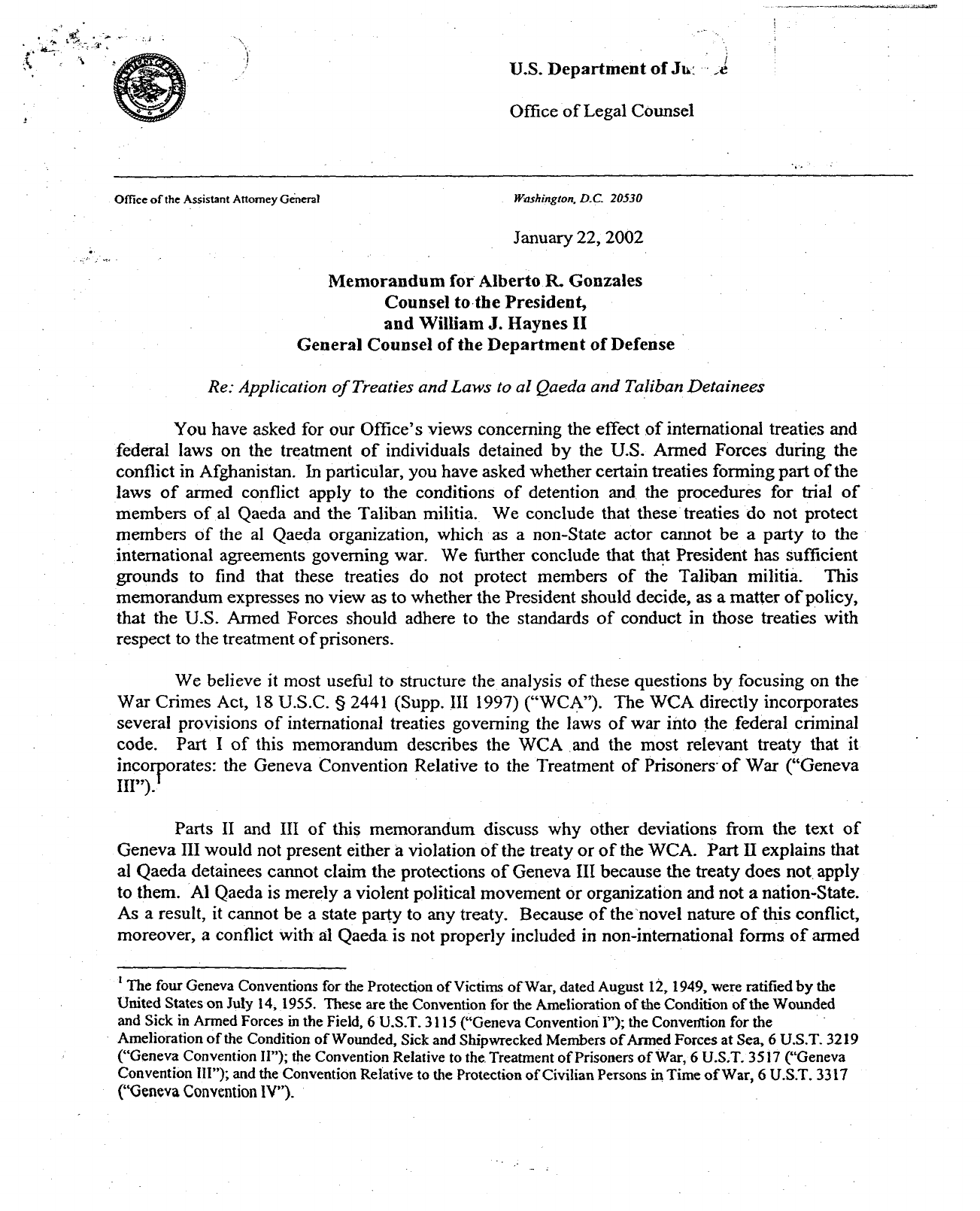
USDOJ Seal
U.S.
Department of Justice
Office of Legal Counsel
Office of the Assistant Attorney General Washington, D.C 20530
January
22,
2002
Memorandum for Alberto R Gonzales
Counsel to the President,
and William J. Haynes II
General Counsel of the Department of Defense
Re: Application of Treaties and Laws to al Qaeda and Taliban Detainees
You have asked for our Office's views concerning the effect of international treaties and
federal laws on the treatment of individuals detained by the U.S. Armed Forces during the
conflict in Afghanistan. In particular, you have asked whether certain treaties forming part of the
laws of armed conflict apply to the conditions of detention and the procedures for trial of
members of al Qaeda and the Taliban militia. We conclude that these treaties do not protect
members of the al Qaeda organization, which as a non-State actor cannot be a party to the
international agreements governing war. We further conclude that that President has sufficient
grounds to find that these treaties do not protect members of the Taliban militia. This
memorandum expresses no view as to whether the President should decide, as a matter of policy,
that the U.S. Armed Forces should adhere to the standards of conduct in those treaties with
respect to the treatment of prisoners.
We believe it most useful to structure the analysis of these questions by focusing on the
War Crimes Act, 18 U.S.C. § 2441 (Supp. III 1997) ("WCA"). The WCA directly incorporates
several provisions of international treaties governing the laws of war into the federal criminal
code.
Part I of this memorandum describes the WCA and the most relevant treaty that it
incorporates: the Geneva Convention Relative to the Treatment of Prisoners of War ("Geneva
III").
Parts II and III of this memorandum discuss why other deviations from the text of
Geneva III would not present either a violation of the treaty or of the WCA. Part It explains that
al Qaeda detainees cannot claim the protections of Geneva III because the treaty does not apply
to them. Al Qaeda is merely a violent political movement or organization and not a nation-State.
As a result, it cannot be a state party to any treaty. Because of the novel nature of this conflict,
moreover, a conflict with al Qaeda is not properly included in non-international forms of armed
The four Geneva Conventions for the Protection of Victims of War, dated August 12,1949, were ratified by the
United States on July 14, 1955. These are the Convention for the Amelioration of the Condition of the Wounded
and Sick in Armed Forces in the Field, 6 U.S.T. 3115 ("Geneva Convention I"); the Conversion for the
Amelioration of the Condition of Wounded, Sick and Shipwrecked Members of Armed Forces at Sea, 6 U.S.T. 3219
("Geneva Convention II"); the Convention Relative to the Treatment of Prisoners of War, 6 U.S.T. 3517 ("Geneva
Convention III"); and the Convention Relative to the Protection of Civilian Persons in Time of War, 6 U.S.T. 3317
("Geneva Convention IV").
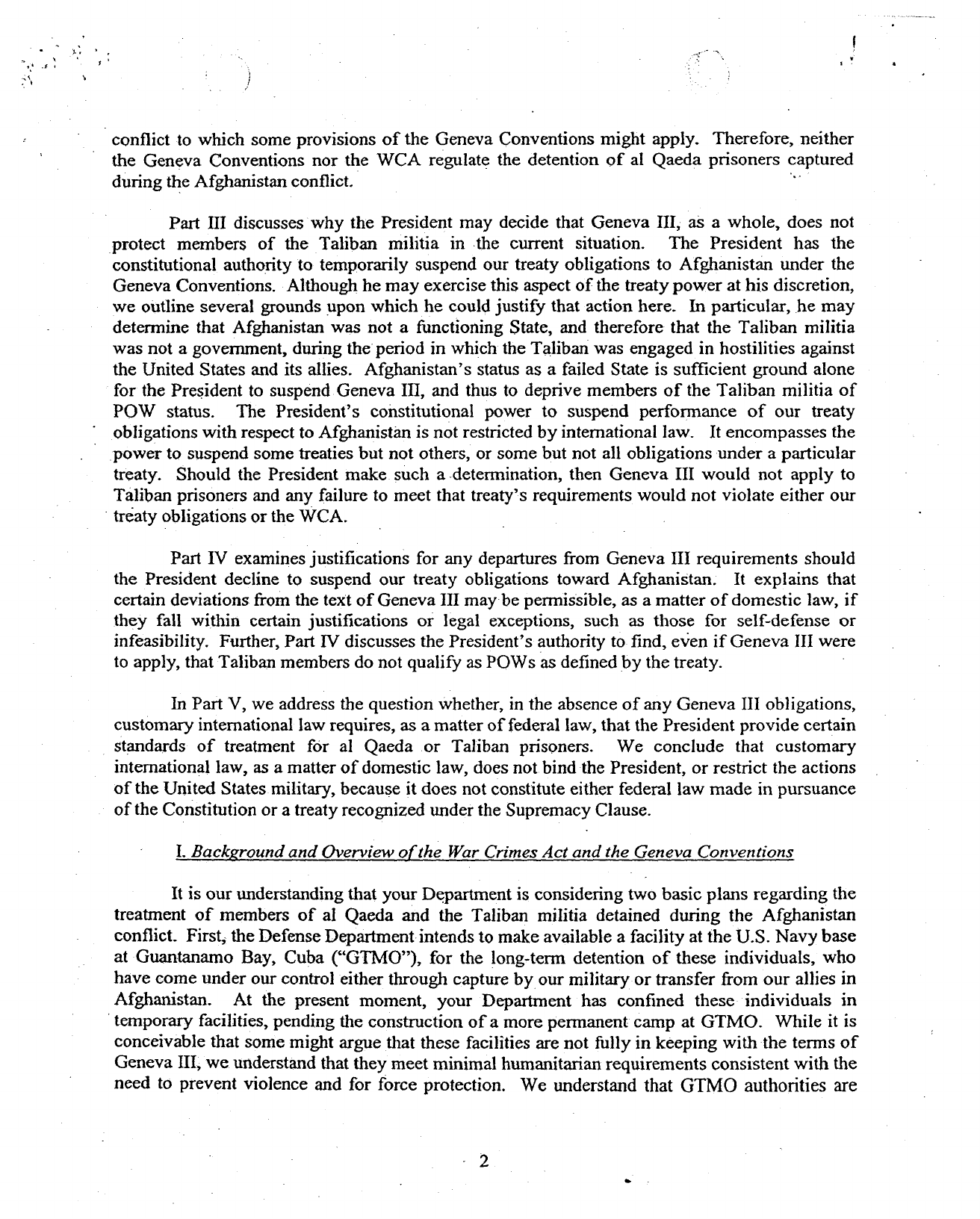
conflict to which some provisions of the Geneva Conventions might apply. Therefore, neither
the Geneva Conventions nor the WCA regulate the detention of al Qaeda prisoners captured
during the Afghanistan conflict,
Part III discusses why the President may decide that Geneva III, as a whole, does not
protect members of the Taliban militia in the current situation. The President has the
constitutional authority to temporarily suspend our treaty obligations to Afghanistan under the
Geneva Conventions. Although he may exercise this aspect of the treaty power at his discretion,
we outline several grounds upon which he could justify that action here. In particular, he may
determine that Afghanistan was not a functioning State, and therefore that the Taliban militia
was not a government, during the period in which the Taliban was engaged in hostilities against
the United States and its allies. Afghanistan's status as a failed State is sufficient ground alone
for the President to suspend Geneva III, and thus to deprive members of the Taliban militia of
POW status. The President's constitutional power to suspend performance of our treaty
obligations with respect to Afghanistan is not restricted by international law. It encompasses the
power to suspend some treaties but not others, or some but not all obligations under a particular
treaty. Should the President make such a determination, then Geneva III would not apply to
Taliban prisoners and any failure to meet that treaty's requirements would not violate either our
treaty obligations or the WCA.
Part IV examines justifications for any departures from Geneva III requirements should
the President decline to suspend our treaty obligations toward Afghanistan. It explains that
certain deviations from the text of Geneva III may be permissible, as a matter of domestic law, if
they fall within certain justifications or legal exceptions, such as those for self-defense or
infeasibility. Further, Part IV discusses the President's authority to find, even if Geneva III were
to apply, that Taliban members do not qualify as POWs as defined by the treaty.
In Part V, we address the question whether, in the absence of any Geneva III obligations,
customary international law requires, as a matter of federal law, that the President provide certain
standards of treatment for al Qaeda or Taliban prisoners. We conclude that customary
international law, as a matter of domestic law, does not bind the President, or restrict the actions
of the United States military, because it does not constitute either federal law made in pursuance
of the Constitution or a treaty recognized under the Supremacy Clause.
I. Background and Overview of the War Crimes Act and the Geneva Conventions
It is our understanding that your Department is considering two basic plans regarding the
treatment of members of al Qaeda and the Taliban militia detained during the Afghanistan
conflict. First, the Defense Department intends to make available a facility at the U.S. Navy base
at Guantanamo Bay, Cuba ("GTMO"), for the long-term detention of these individuals, who
have come under our control either through capture by our military or transfer from our allies in
Afghanistan. At the present moment, your Department has confined these individuals in
temporary facilities, pending the construction of a more permanent camp at GTMO. While it is
conceivable that some might argue that these facilities are not fully in keeping with the terms of
Geneva III, we understand that they meet minimal humanitarian requirements consistent with the
need to prevent violence and for force protection. We understand that GTMO authorities are
2
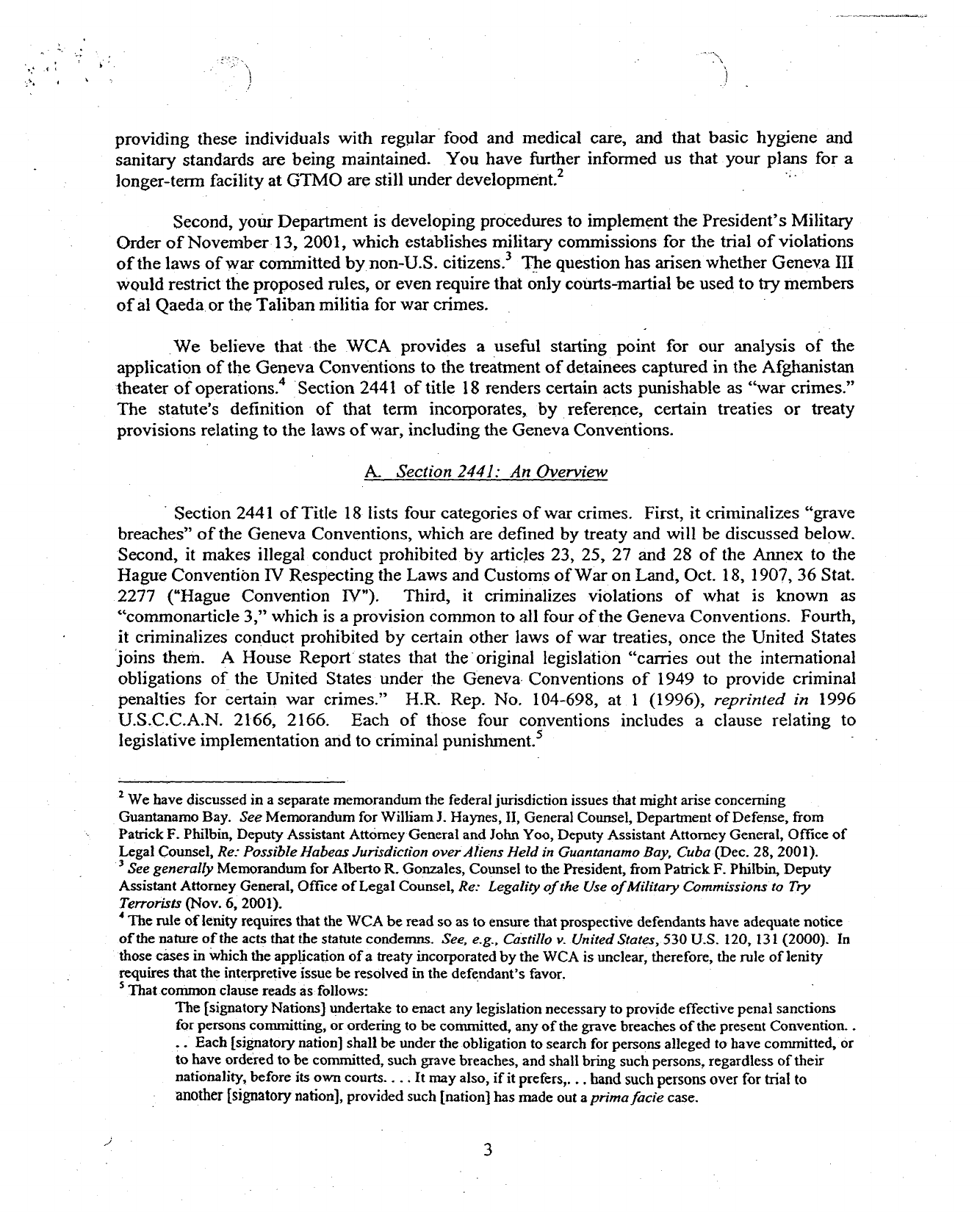
providing these individuals with regular food and medical care, and that basic hygiene and
sanitary standards are being maintained. You have further informed us that your plans for a
longer-term facility at GTMO are still under development.
2
Second, your Department is developing procedures to implement the President's Military
Order of November 13, 2001, which establishes military commissions for the trial of violations
of the laws of war committed by
non-U.S.
citizens.
3
The question has arisen whether Geneva III
would restrict the proposed rules, or even require that only courts-martial be used to try members
of al Qaeda or the Taliban militia for war crimes.
We believe that the WCA provides a useful starting point for our analysis of the
application of the Geneva Conventions to the treatment of detainees captured in the Afghanistan
theater of operations.
4
Section 2441 of title 18 renders certain acts punishable as "war crimes."
The statute's definition of that term incorporates, by reference, certain treaties or treaty
provisions relating to the laws of war, including the Geneva Conventions.
A. Section 2441: An Overview
Section 2441 of Title 18 lists four categories of war crimes. First, it criminalizes "grave
breaches" of the Geneva Conventions, which are defined by treaty and will be discussed below.
Second, it makes illegal conduct prohibited by articles 23, 25, 27 and 28 of the Annex to the
Hague Convention IV Respecting the Laws and Customs of War on Land, Oct. 18, 1907, 36 Stat.
2277 ("Hague Convention TV"). Third, it criminalizes violations of what is known as
"commonarticle 3," which is a provision common to all four of the Geneva Conventions. Fourth,
it criminalizes conduct prohibited by certain other laws of war treaties, once the United States
joins them. A House Report states that the original legislation "carries out the international
obligations of the United States under the Geneva Conventions of 1949 to provide criminal
penalties for certain war crimes." H.R. Rep. No. 104-698, at 1 (1996), reprinted in 1996
U.S.C.C.A.N. 2166, 2166. Each of those four conventions includes a clause relating to
legislative implementation and to criminal punishment.
5
2
We have discussed in a separate memorandum the federal jurisdiction issues that might arise concerning
Guantanamo Bay. See Memorandum for William J. Haynes, II, General Counsel, Department of Defense, from
Patrick F. Philbin, Deputy Assistant Attorney General and John Yoo, Deputy Assistant Attorney General, Office of
Legal Counsel, Re: Possible Habeas Jurisdiction over Aliens Held in Guantanamo Bay, Cuba (Dec. 28, 2001).
3
See generally Memorandum for Alberto R. Gonzales, Counsel to the President, from Patrick F. Philbin, Deputy
Assistant Attorney General, Office of Legal Counsel, Re: Legality of the Use of Military Commissions to Try
Terrorists (Nov. 6, 2001).
The rule of lenity requires that the WCA be read so as to ensure that prospective defendants have adequate notice
of the nature of the acts that the statute condemns. See, e.g., Castillo v. United States, 530 U.S. 120, 131 (2000). In
those cases in which the application of a treaty incorporated by the WCA is unclear, therefore, the rule of lenity
requires that the interpretive issue be resolved in the defendant's favor.
5
That common clause reads as follows:
The [signatory Nations] undertake to enact any legislation necessary to provide effective penal sanctions
for persons committing, or ordering to be committed, any of the grave breaches of the present Convention..
.. Each [signatory nation] shall be under the obligation to search for persons alleged to have committed, or
to have ordered to be committed, such grave breaches, and shall bring such persons, regardless of their
nationality, before its own courts It may also, if it prefers,... hand such persons over for trial to
another [signatory nation], provided such [nation] has made out a prima facie case.
" 3 '
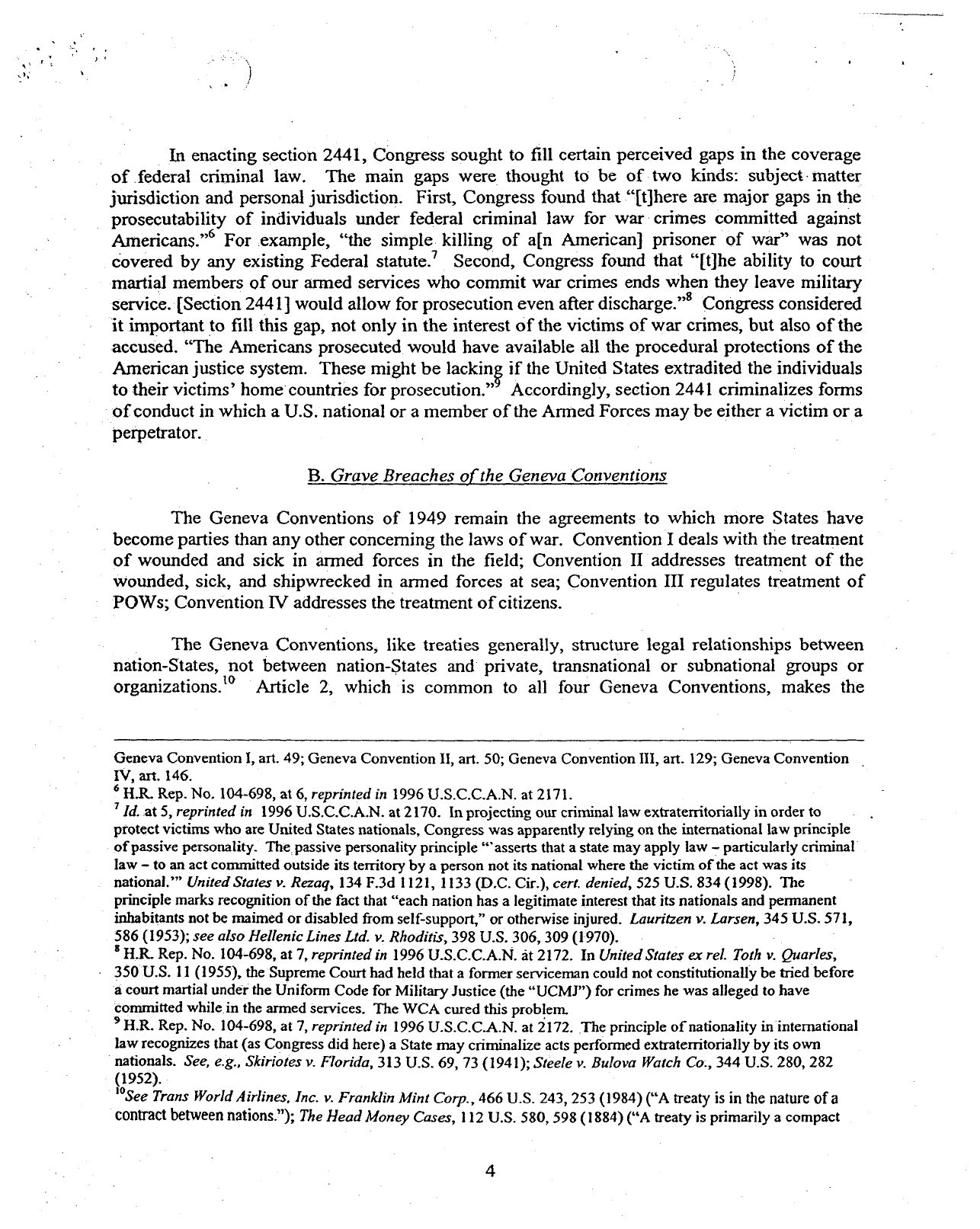
In enacting section 2441, Congress sought to fill certain perceived gaps in the coverage
of federal criminal law. The main gaps were thought to be of two kinds: subject matter
jurisdiction and personal jurisdiction. First, Congress found that "[there are major gaps in the
prosecutability of individuals under federal criminal law for war crimes committed against
Americans."
6
For example, "the simple killing of a[n American] prisoner of war" was not
covered by any existing Federal statute.
7
Second, Congress found that "[t]he ability to court
martial members of our armed services who commit war crimes ends when they leave military
service. [Section 2441] would allow for prosecution even after discharge."
8
Congress considered
it important to fill this gap, not only in the interest of the victims of war crimes, but also of the
accused. "The Americans prosecuted would have available all the procedural protections of the
American justice system. These might be lacking if the United States extradited the individuals
to their victims' home countries for prosecution." Accordingly, section 2441 criminalizes forms
of conduct in which a U.S. national or a member of the Armed Forces may be either a victim or a
perpetrator.
B.
Grave Breaches of the Geneva Conventions
The Geneva Conventions of 1949 remain the agreements to which more States have
become parties than any other concerning the laws of war. Convention I deals with the treatment
of wounded and sick in armed forces in the field; Convention II addresses treatment of the
wounded, sick, and shipwrecked in armed forces at sea; Convention III regulates treatment of
POWs; Convention IV addresses the treatment of citizens.
The Geneva Conventions, like treaties generally, structure legal relationships between
nation-States, not between nation-States and private, transnational or subnational groups or
organizations.
10
Article 2, which is common to all four Geneva Conventions, makes the
Geneva Convention I, art. 49; Geneva Convention II, art. 50; Geneva Convention III, art. 129; Geneva Convention
IV, art. 146.
6
H.R. Rep. No. 104-698, at 6, reprinted in 1996 U.S.C.C.A.N. at 2171.
7
Id. at 5, reprinted in 1996 U.S.C.C.A.N. at 2170. In projecting our criminal law extraterritorially in order to
protect victims who are United States nationals, Congress was apparently relying on the international law principle
of passive personality. The passive personality principle '"asserts that a state may apply law - particularly criminal
law - to an act committed outside its territory by a person not its national where the victim of the act was its
national.'" United States v. Rezaq, 134 F.3d 1121, 1133 (D.C. Cir.), cert,
denied,
525 U.S. 834 (1998). The
principle marks recognition of the fact that "each nation has a legitimate interest that its nationals and permanent
inhabitants not be maimed or disabled from self-support," or otherwise injured. Lauritzen v. Larsen, 345 U.S. 571,
586 (1953); see also Hellenic Lines Ltd. v. Rhoditis, 398 U.S. 306,309 (1970).
8
H.R. Rep. No. 104-698, at 7, reprinted in 1996 U.S.C.C.A.N. at 2172. In United States ex rel. Toth v. Quarles,
350 U.S. 11(1955), the Supreme Court had held that a former serviceman could not constitutionally be tried before
a court martial under the Uniform Code for Military Justice (the "UCMJ") for crimes he was alleged to have
committed while in the armed services. The WCA cured this problem.
'H.R.. Rep. No. 104-698, at 7, reprinted in 1996 U.S.C.C.A.N. at 2172. The principle of nationality in international
law recognizes that (as Congress did here) a State may criminalize acts performed extraterritorially by its own
nationals. See, e.g., Skiriotes v. Florida, 313 U.S. 69, 73 (1941); Steele v. Bulova Watch Co., 344 U.S. 280, 282
(1952).
w
See Trans World Airlines, Inc. v. Franklin Mint Corp., 466 U.S. 243, 253 (1984) ("A treaty is in the nature of a
contract between nations."); The Head Money Cases, 112 U.S. 580,598 (1884) ("A treaty is primarily a compact
4
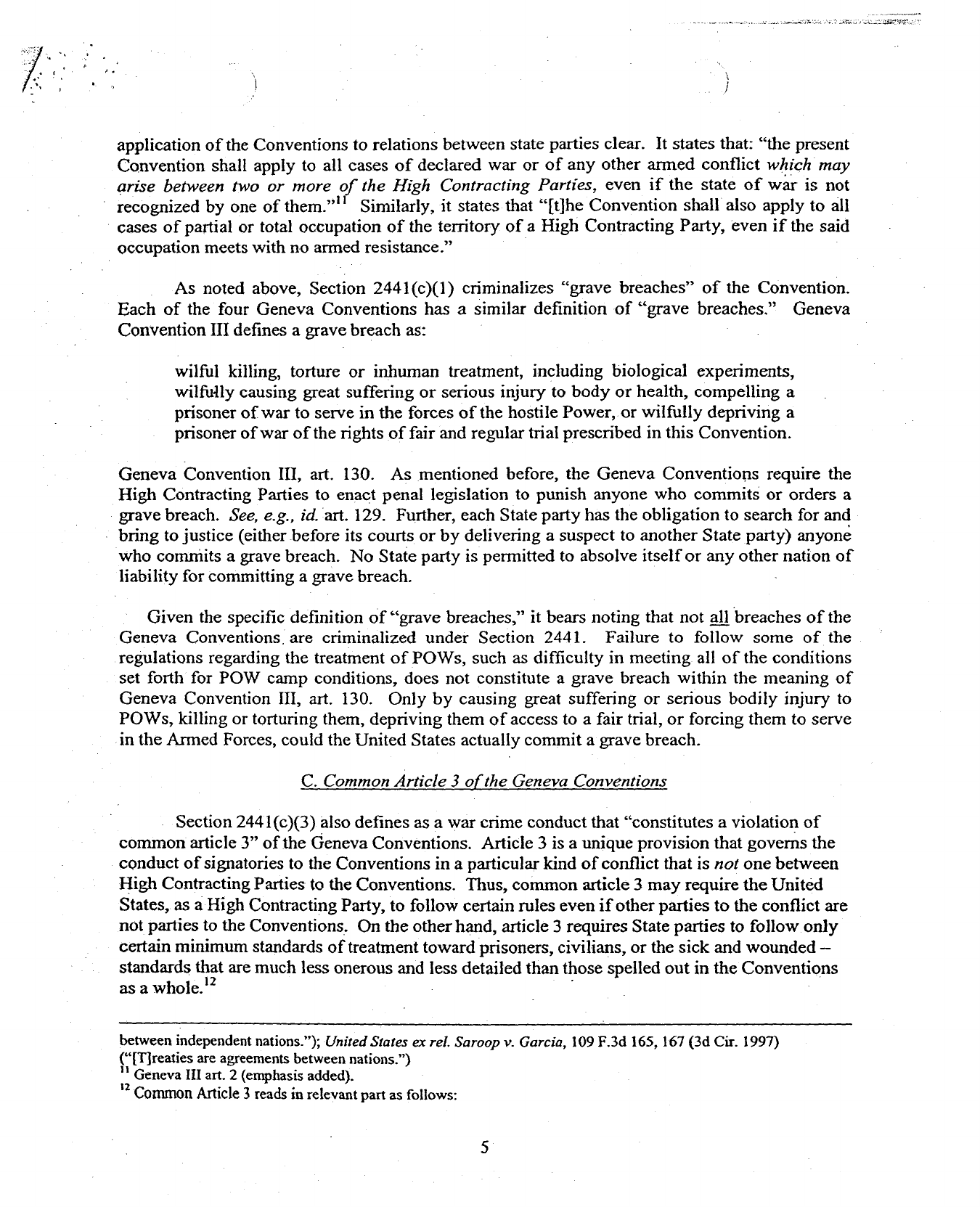
application of the Conventions to relations between state parties clear. It states that: "the present
Convention shall apply to all cases of declared war or of any other armed conflict which may
arise between two or more of the High Contracting Parties, even if the state of war is not
recognized by one of them."
11
Similarly, it states that "[t]he Convention shall also apply to all
cases of partial or total occupation of the territory of a High Contracting Party, even if the said
occupation meets with no armed resistance."
As noted above, Section 2441(c)(1) criminalizes "grave breaches" of the Convention.
Each of the four Geneva Conventions has a similar definition of "grave breaches." Geneva
Convention III defines a grave breach as:
wilful killing, torture or inhuman treatment, including biological experiments,
wilfully causing great suffering or serious injury to body or health, compelling a
prisoner of war to serve in the forces of the hostile Power, or wilfully depriving a
prisoner of war of the rights of fair and regular trial prescribed in this Convention.
Geneva Convention III, art. 130. As mentioned before, the Geneva Conventions require the
High Contracting Parties to enact penal legislation to punish anyone who commits or orders a
grave breach. See, e.g., id. art. 129. Further, each State party has the obligation to search for and
bring to justice (either before its courts or by delivering a suspect to another State party) anyone
who commits a grave breach. No State party is permitted to absolve itself or any other nation of
liability for committing a grave breach.
Given the specific definition of "grave breaches," it bears noting that not all breaches of the
Geneva Conventions, are criminalized under Section 2441. Failure to follow some of the
regulations regarding the treatment of POWs, such as difficulty in meeting all of the conditions
set forth for POW camp conditions, does not constitute a grave breach within the meaning of
Geneva Convention III, art. 130. Only by causing great suffering or serious bodily injury to
POWs, killing or torturing them, depriving them of access to a fair trial, or forcing them to serve
in the Armed Forces, could the United States actually commit a grave breach.
C. Common Article 3 of the Geneva Conventions
Section 2441(c)(3) also defines as a war crime conduct that "constitutes a violation of
common article 3" of the Geneva Conventions. Article 3 is a unique provision that governs the
conduct of signatories to the Conventions in a particular kind of conflict that is not one between
High Contracting Parties to the Conventions. Thus, common article 3 may require the United
States, as a High Contracting Party, to follow certain rules even if other parties to the conflict are
not parties to the Conventions. On the other hand, article 3 requires State parties to follow only
certain minimum standards of treatment toward prisoners, civilians, or the sick and wounded
—
standards that are much less onerous and less detailed than those spelled out in the Conventions
as a whole.
12
between independent nations."); United States ex rel Saroop
v.
Garcia, 109 F.3d 165, 167 (3d Cir. 1997)
("[treaties are agreements between nations.")
11
Geneva III art. 2 (emphasis added).
Common Article 3 reads in relevant part as follows:
5

Common article 3 complements common article 2. Article 2 applies to cases of declared
war or of any other armed conflict that may arise between two or more of the High Contracting
Parties, even if the state of war is not recognized by one of them.
13
Common article 3, however,
covers "armed conflict not of an international character" - a war that does not involve cross-
border attacks
—
that occurs within the territory of one of the High Contracting Parties.
Common article 3's text provides substantial reason to think that it refers specifically to a
condition of civil war, or a large-scale armed conflict between a State and an armed movement
within its own territory. First, the text of the provision refers specifically to an armed Conflict
that a) is not of an international character, and b) occurs in the territory of a state party to the
Convention. It does not sweep in all armed conflicts, nor does it address a gap left by common
article 2 for international armed conflicts that involve non-state entities (such as an international
terrorist organization) as parties to the conflict. Further, common article 3 addresses only non-
international conflicts that occur within the territory of a single state party, again, like a civil war.
This provision would not reach an armed conflict in which one of the parties operated from
multiple bases in several different states. Also, the language at the end of article 3 states that
"[the application of the preceding provisions shall not affect the legal status of the Parties to the
conflict." This provision was designed to ensure that a state party that observed article 3 during
a civil war would not be understood to have granted the "recognition of the insurgents as an
adverse party."
14
This interpretation is supported by commentators. One well-known commentary states
that "a non-international armed conflict is distinct from an international armed conflict because
of the legal status of the entities opposing each other: the parties to the conflict are not sovereign
States, but the government of a single State in conflict with one or more armed factions within its
territory."
15
A legal scholar writing in the same year in which the Conventions were prepared
In the case of armed conflict not of an international character occurring in the territory of one of the High
Contracting Parties, each Party to the conflict shall be bound to apply, as a minimum, the following provisions:
(1) Persons taking no active part in the hostilities, including members of armed forces who have laid down their
arms and those placed hors de combat by sickness, wounds, detention, or any other cause, shall in all circumstances
be treated humanely, without any adverse distinction founded on race, color, religion or faith, sex, birth or wealth, or
any other similar criteria.
To this end, the following acts are and shall remain prohibited at any time and in any place whatsoever with
respect to the above-mentioned persons:
(a) violence to life and person, in particular murder of
all
kinds, mutilation, cruel treatment and torture;
(b) taking of hostages;
(c) outrages upon personal dignity, in particular humiliating and degrading treatment;
(d) the passing of sentences and the carrying out of executions without previous judgment pronounced by a
regularly constituted court, affording all the judicial guarantees which are recognized as indispensable by civilized
peoples.
(2) The wounded and sick shall be collected and cared for....
The application of the preceding provisions shall not affect the legal status of the Parties to the conflict
"Article 2's reference to a state of war "not recognized" by a belligerent was apparently intended to refer to
conflicts such as the 1937 war between China and Japan. Both sides denied that a state of war existed. See Joyce A.
C. Gutteridge, The Geneva Conventions of 1949, 26 Brit. Y.B. Int'l L. 294, 298-99 (1949).
14
Frits Kalshoven, Constraints on the Waging of War 59(1987).
15
Commentary on the Additional Protocols of 8 June 1977 to the Geneva Conventions of 12 August 1949, at 4339
(Yves Sandoz et al. eds., 1987)
6
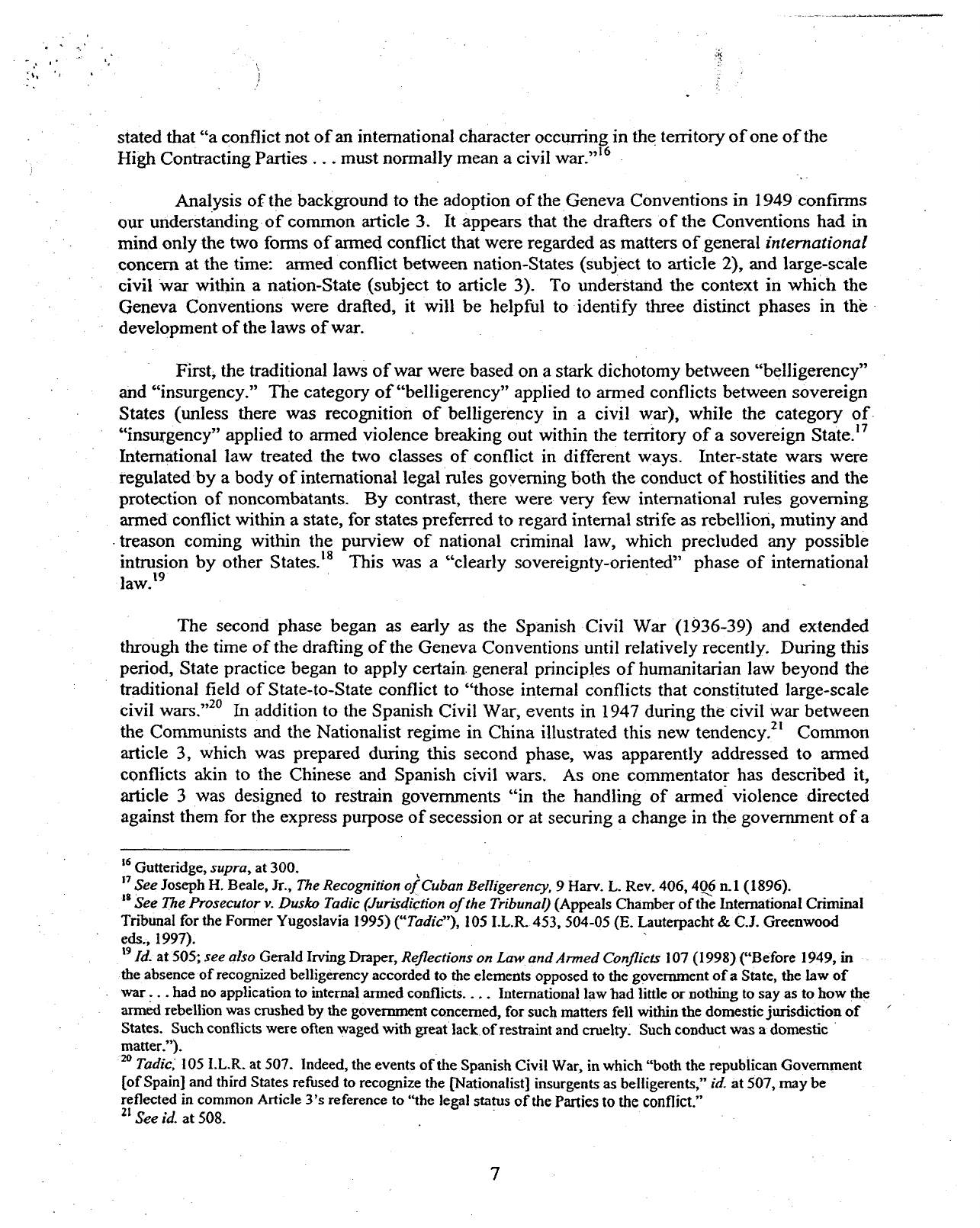
stated that "a conflict not of an international character occurring in the territory of one of the
High Contracting Parties ... must normally mean a civil war."
16
Analysis of the background to the adoption of the Geneva Conventions in 1949 confirms
our understanding of common article 3. It appears that the drafters of the Conventions had in
mind only the two forms of armed conflict that were regarded as matters of general international
concern at the time: armed conflict between nation-States (subject to article 2), and large-scale
civil war within a nation-State (subject to article 3). To understand the context in which the
Geneva Conventions were drafted, it will be helpful to identify three distinct phases in the
development of the laws of war.
First, the traditional laws of war were based on a stark dichotomy between "belligerency"
and "insurgency." The category of "belligerency" applied to armed conflicts between sovereign
States (unless there was recognition of belligerency in a civil war), while the category of
"insurgency" applied to armed violence breaking out within the territory of a sovereign State.
17
International law treated the two classes of conflict in different ways. Inter-state wars were
regulated by a body of international legal rules governing both the conduct of hostilities and the
protection of noncombatants. By contrast, there were very few international rules governing
armed conflict within a state, for states preferred to regard internal strife as rebellion, mutiny and
treason coming within the purview of national criminal law, which precluded any possible
intrusion by other States.
18
This was a "clearly sovereignty-oriented" phase of international
law.
19
The second phase began as early as the Spanish Civil War (1936-39) and extended
through the time of the drafting of the Geneva Conventions until relatively recently. During this
period, State practice began to apply certain general principles of humanitarian law beyond the
traditional field of State-to-State conflict to "those internal conflicts that constituted large-scale
civil wars." In addition to the Spanish Civil War, events in 1947 during the civil war between
the Communists and the Nationalist regime in China illustrated this new tendency.
21
Common
article 3, which was prepared during this second phase, was apparently addressed to armed
conflicts akin to the Chinese and Spanish civil wars. As one commentator has described it,
article 3 was designed to restrain governments "in the handling of armed violence directed
against them for the express purpose of secession or at securing a change in the government of a
16
Gutteridge, supra, at 300.
17
See Joseph H. Beale, Jr., The Recognition of Cuban Belligerency, 9 Harv. L. Rev. 406,406
n.
1
(1896).
18
See The Prosecutor
v.
Dusko Tadic (Jurisdiction of the Tribunal) (Appeals Chamber of the International Criminal
Tribunal for the Former Yugoslavia 1995) ("Tadic"), 105 I.L.R. 453, 504-05 (E. Lauterpacht & C.J. Greenwood
eds.,
1997).
19
Id. at 505; see also Gerald Irving Draper, Reflections on Law and Armed Conflicts 107 (1998) ("Before 1949, in
the absence of recognized belligerency accorded to the elements opposed to the government of a State, the law of
war... had no application to internal armed conflicts International law had little or nothing to say as to how the
armed rebellion was crushed by the government concerned, for such matters fell within the domestic jurisdiction of
States. Such conflicts were often waged with great lack of restraint and cruelty. Such conduct was a domestic
matter.").
20
Tadic, 105 I.L.R. at 507. Indeed, the events of the Spanish Civil War, in which "both the republican Government
[of
Spain]
and third States refused to recognize the [Nationalist] insurgents as belligerents," id. at 507, may be
reflected in common Article 3's reference to "the legal status of the Parties to the conflict."
21See id at
508.
7
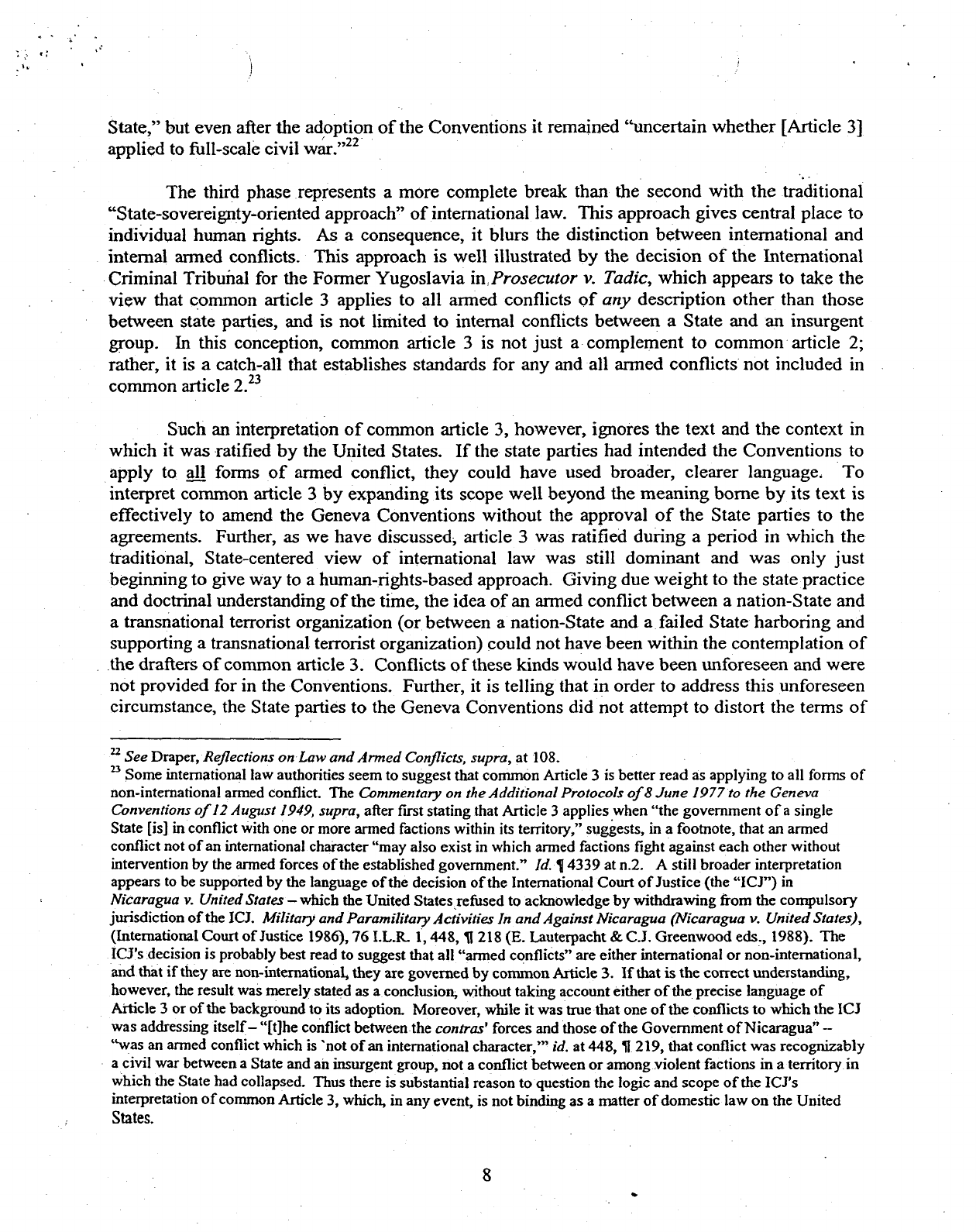
State," but even after the adoption of the Conventions it remained "uncertain whether [Article 3]
applied to full-scale civil war."
22
The third phase represents a more complete break than the second with the traditional
"State-sovereignty-oriented approach" of international law. This approach gives central place to
individual human rights. As a consequence, it blurs the distinction between international and
internal armed conflicts. This approach is well illustrated by the decision of the International
Criminal Tribunal for the Former Yugoslavia in Prosecutor v. Tadic, which appears to take the
view that common article 3 applies to all armed conflicts of any description other than those
between state parties, and is not limited to internal conflicts between a State and an insurgent
group. In this conception, common article 3 is not just a complement to common article 2;
rather, it is a catch-all that establishes standards for any and all armed conflicts not included in
common article 2.
23
Such an interpretation of common article 3, however, ignores the text and the context in
which it was ratified by the United States. If the state parties had intended the Conventions to
apply to all forms of armed conflict, they could have used broader, clearer language. To
interpret common article 3 by expanding its scope well beyond the meaning borne by its text is
effectively to amend the Geneva Conventions without the approval of the State parties to the
agreements. Further, as we have discussed, article 3 was ratified during a period in which the
traditional, State-centered view of international law was still dominant and was only just
beginning to give way to a human-rights-based approach. Giving due weight to the state practice
and doctrinal understanding of the time, the idea of an armed conflict between a nation-State and
a transnational terrorist organization (or between a nation-State and a failed State harboring and
supporting a transnational terrorist organization) could not have been within the contemplation of
the drafters of common article 3. Conflicts of these kinds would have been unforeseen and were
not provided for in the Conventions. Further, it is telling that in order to address this unforeseen
circumstance, the State parties to the Geneva Conventions did not attempt to distort the terms of
22
See Draper, Reflections on Law and Armed Conflicts, supra, at 108.
23
Some international law authorities seem to suggest that common Article 3 is better read as applying to all forms of
non-international armed Conflict. The Commentary on the Additional Protocols of 8 June 1977 to the Geneva
Conventions of 12 August 1949, supra, after first stating that Article 3 applies when "the government of
a
single
State [is] in conflict with one or more armed factions within its territory," suggests, in a footnote, that an armed
conflict not of an international character "may also exist in which armed factions fight against each other without
intervention by the armed forces of the established government." ld.\ 4339 at
n.2.
A still broader interpretation
appears to be supported by the language of the decision of the International Court of Justice (the "ICJ") in
Nicaragua v. United States
—
which the United States refused to acknowledge by withdrawing from the compulsory
jurisdiction of the ICJ. Military and Paramilitary Activities In and Against Nicaragua (Nicaragua v. United States),
(International Court of Justice 1986), 76 I.L.R.
1,448,
U 218 (E. Lauterpacht & C.J. Greenwood eds., 1988). The
ICJ's decision is probably best read to suggest that all "armed conflicts" are either international or non-intemational,
and that if they are non-international, they are governed by common Article 3. If that is the correct understanding,
however, the result was merely stated as a conclusion, without taking account either of the precise language of
Article 3 or of the background to its adoption. Moreover, while it was true that one of the conflicts to which the ICJ
was addressing
itself-
"[t]he conflict between the contras' forces and those of the Government of Nicaragua" -
"was an armed conflict which is "not of an international character,'" id. at 448,11219, that conflict was recognizably
a civil war between a State and an insurgent group, not a conflict between or among violent factions in a territory in
which the State had collapsed. Thus there is substantial reason to question the logic and scope of the ICJ's
interpretation of common Article 3, which, in any event, is not binding as a matter of domestic law on the United
States.
8
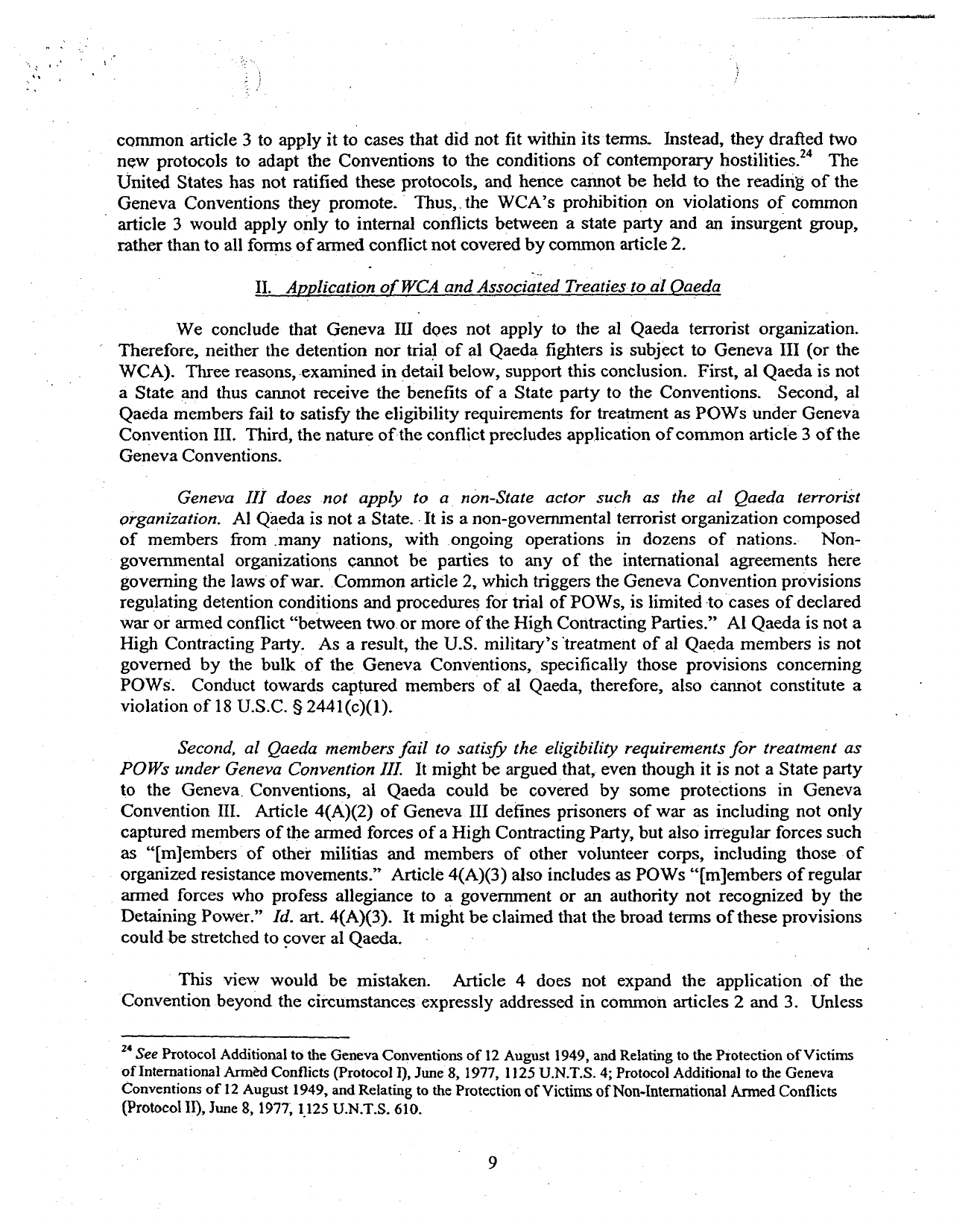
common article 3 to apply it to cases that did not fit within its terms. Instead, they drafted two
new protocols to adapt the Conventions to the conditions of contemporary hostilities.
24
The
United States has not ratified these protocols, and hence cannot be held to the reading of the
Geneva Conventions they promote. Thus, the WCA's prohibition on violations of common
article 3 would apply only to internal conflicts between a state party and an insurgent group,
rather than to all forms of armed conflict not covered by common article 2.
II.
Application of WCA and Associated Treaties to al Qaeda
We conclude that Geneva III does not apply to the al Qaeda terrorist organization.
Therefore, neither the detention nor trial of al Qaeda fighters is subject to Geneva III (or the
WCA).
Three reasons, examined in detail below, support this conclusion. First, al Qaeda is not
a State and thus cannot receive the benefits of a State party to the Conventions. Second, al
Qaeda members fail to satisfy the eligibility requirements for treatment as POWs under Geneva
Convention III. Third, the nature of the conflict precludes application of common article 3 of the
Geneva Conventions.
Geneva III does not apply to a non-State actor such as the al Qaeda terrorist
organization. Al Qaeda is not a State. It is a non-governmental terrorist organization composed
of members from many nations, with ongoing operations in dozens of nations. Non-
governmental organizations cannot be parties to any of the international agreements here
governing the laws of war. Common article 2, which triggers the Geneva Convention provisions
regulating detention conditions and procedures for trial of POWs, is limited to cases of declared
war or armed conflict "between two or more of the High Contracting Parties." Al Qaeda is not a
High Contracting Party. As a result, the U.S. military's treatment of al Qaeda members is not
governed by the bulk of the Geneva Conventions, specifically those provisions concerning
POWs. Conduct towards captured members of al Qaeda, therefore, also cannot constitute a
violation of
18
U.S.C. § 2441(c)(1).
Second,
al Qaeda members fail to satisfy the eligibility requirements for treatment as
POWs under Geneva Convention III It might be argued that, even though it is not a State party
to the Geneva Conventions, al Qaeda could be covered by some protections in Geneva
Convention III. Article 4(A)(2) of Geneva III defines prisoners of war as including not only
captured members of the armed forces of a High Contracting Party, but also irregular forces such
as "[members of other militias and members of other volunteer corps, including those of
organized resistance movements." Article 4(A)(3) also includes as POWs "[members of regular
armed forces who profess allegiance to a government or an authority not recognized by the
Detaining Power." Id. art. 4(A)(3). It might be claimed that the broad terms of these provisions
could be stretched to cover al Qaeda.
This view would be mistaken. Article 4 does not expand the application of the
Convention beyond the circumstances expressly addressed in common articles 2 and 3. Unless
See Protocol Additional to the Geneva Conventions of
12
August 1949, and Relating to the Protection of Victims
of International Armed Conflicts (Protocol
I),
June 8, 1977, 1125 U.N.T.S. 4; Protocol Additional to the Geneva
Conventions of
12
August 1949, and Relating to the Protection of Victims of Non-International Armed Conflicts
(Protocol
II),
June 8, 1977, 1125 U.N.T.S. 610.
9

there is a conflict subject to article 2, article 4 simply does not apply. If the conflict is one to
which article 3 applies, then article 4 has no role because article 3 does not trigger application of
the rest of the provisions of Geneva III. Rather, article 3 provides an alternative set of standards
that requires only minimal humanitarian protections. As we have explained, the conflict with al
Qaeda does not fall within article 2. As a result, article 4 has no application. In other words,
article 4 cannot be read as an alternative, and a far more expansive, statement of the application
of the Convention. It merely specifies, where there is a conflict covered by article 2 of the
Convention, who must be accorded POW status.
Even if article 4, however, were considered somehow to be jurisdictional as well as
substantive, captured members of al Qaeda still would not receive the protections accorded to
POWs. First, al Qaeda is not the "armed forces," volunteer forces, or militia of a state party that
is a party to the conflict, as defined in article 4(A)(1). Second, they cannot qualify as volunteer
force, militia, or organized resistance force under article 4(A)(2). That article requires that
militia or volunteers fulfill four conditions: command by responsible individuals, wearing
insignia, carrying arms openly, and obeying the laws of war. Al Qaeda members have clearly
demonstrated that they will not follow these basic requirements of lawful warfare. They have
attacked purely civilian targets of no military value; they refused to wear uniform or insignia or
carry arms openly, but instead hijacked civilian airliners, took hostages, and killed them; and
they themselves do not obey*the laws of war concerning the protection of the lives of civilians or
the means of legitimate combat. As these requirements also apply to any regular armed force
under other treaties governing the laws of armed conflict,
25
al Qaeda members would not qualify
under article 4(A)(3) either, which provides POW status to captured individuals who are
members of a "regular armed force" that professes allegiance to a government or authority not
recognized by the detaining power. Members of al Qaeda, therefore, would not qualify for POW
treatment under article 4, even if it were somehow thought that they were participating in a
conflict covered by common article 2 or if article 4 itself were thought to be jurisdictional in
nature.
Third,
the nature of the conflict precludes application of common article 3 of the Geneva
Conventions. As discussed in Part I, the text of common article 3, when read in harmony with
common article 2, shows that the Geneva Conventions were intended to cover either: a)
traditional wars between state parties to the Conventions (article 2), b) or non-intemational civil
wars (article 3). Our conflict with al Qaeda does not fit into either category. It is not an
international war between nation-States because al Qaeda is not a State. Nor is this conflict a
civil war under article 3, because it is a conflict of "an international character." Al Qaeda
operates in many countries and carried out a massive international attack on the United States on
September 11, 2001. Therefore, the military's treatment of al Qaeda members is not limited
either by common article 3 or 18 U.S.C. § 2441(c)(3).
III.
Application of the Geneva Conventions to the Taliban Militia
Whether the Geneva Conventions apply to the detention and trial of members of the Taliban
militia presents a more difficult legal question. Afghanistan has been a party to all four Geneva
Conventions since September 1956. Some might argue that this requires application of the
Hague Convention IV, Respecting the Laws and Customs of War on Land, Oct. 18, 1907, 36 Stat. 2277.
10
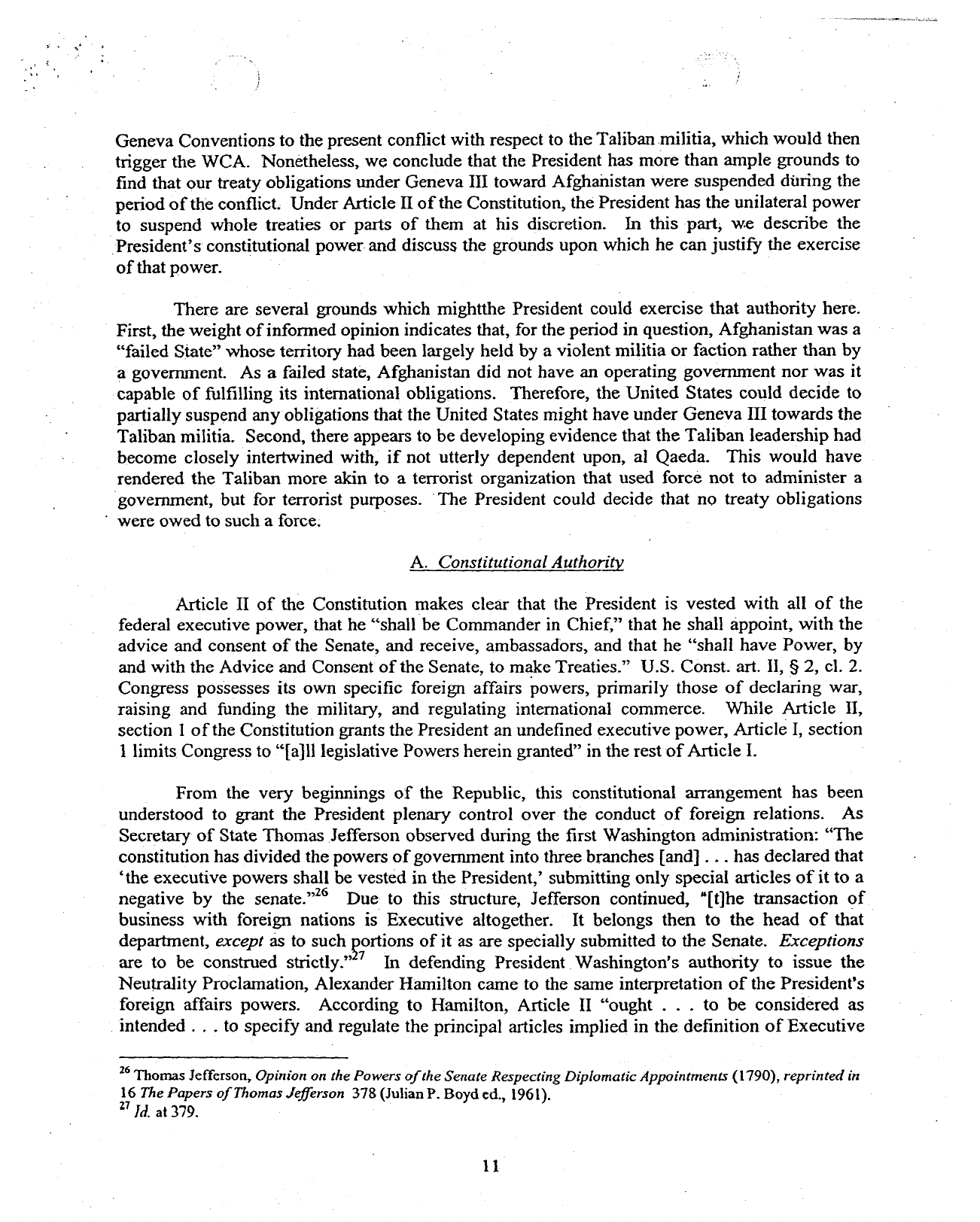
Geneva Conventions to the present conflict with respect to the Taliban militia, which would then
trigger the WCA. Nonetheless, we conclude that the President has more than ample grounds to
find that our treaty obligations under Geneva III toward Afghanistan were suspended during the
period of the conflict- Under Article II of the Constitution, the President has the unilateral power
to suspend whole treaties or parts of them at his discretion. In this part, we describe the
President's constitutional power and discuss the grounds upon which he can justify the exercise
of that power.
There are several grounds which might the President could exercise that authority here.
First, the weight of informed opinion indicates that, for the period in question, Afghanistan was a
"failed State" whose territory had been largely held by a violent militia or faction rather than by
a government. As a failed state, Afghanistan did not have an operating government nor was it
capable of fulfilling its international obligations. Therefore, the United States could decide to
partially suspend any obligations that the United States might have under Geneva III towards the
Taliban militia. Second, there appears to be developing evidence that the Taliban leadership had
become closely intertwined with, if not utterly dependent upon, al Qaeda. This would have
rendered the Taliban more akin to a terrorist organization that used force not to administer a
government, but for terrorist purposes. The President could decide that no treaty obligations
were owed to such a force.
A. Constitutional Authority
Article II of the Constitution makes clear that the President is vested with all of the
federal executive power, that he "shall be Commander in
Chief,"
that he shall appoint, with the
advice and consent of the Senate, and receive, ambassadors, and that he "shall have Power, by
and with the Advice and Consent of the Senate, to make Treaties." U.S. Const, art. II, § 2, cl. 2.
Congress possesses its own specific foreign affairs powers, primarily those of declaring war,
raising and funding the military, and regulating international commerce. While Article II,
section
1
of the Constitution grants the President an undefined executive power, Article I, section
1 limits Congress to "[a]ll legislative Powers herein granted" in the rest of Article I.
From the very beginnings of the Republic, this constitutional arrangement has been
understood to grant the President plenary control over the conduct of foreign relations. As
Secretary of State Thomas Jefferson observed during the first Washington administration: "The
constitution has divided the powers of government into three branches
[and]...
has declared that
'the executive powers shall be vested in the President," submitting only special articles of it to a
negative by the senate."
26
Due to this structure, Jefferson continued,
w
[t]he transaction of
business with foreign nations is Executive altogether. It belongs then to the head of that
department, except as to such portions of it as are specially submitted to the Senate. Exceptions
are to be construed strictly."
7
In defending President Washington's authority to issue the
Neutrality Proclamation, Alexander Hamilton came to the same interpretation of the President's
foreign affairs powers. According to Hamilton, Article II "ought ... to be considered as
intended ... to specify and regulate the principal articles implied in the definition of Executive
26
Thomas Jefferson, Opinion on the Powers of the Senate Respecting Diplomatic Appointments (1790), reprinted in
16 The Papers of Thomas Jefferson 378 (Julian P. Boyd ed., 1961).
27
Mat 379.
11

Power; leaving the rest to flow from the general grant of that power." As future Chief Justice
John Marshall famously declared a few years later, "The President is the sole organ of the nation
in its external relations, and its sole representative with foreign nations. . . . The [executive]
department.., is entrusted with the whole foreign intercourse of the nation "
29
On the few occasions where it has addressed the question, the Supreme Court has lent its
approval to the executive branch's broad powers in the field of foreign affairs. Responsibility for
the conduct of foreign affairs and for protecting the national security are, as the Supreme Court
has observed, '"central Presidential domains."
30
The President's constitutional primacy flows
from both his unique position in the constitutional structure and from the specific grants of
authority in Article II making the President the Chief Executive of the Nation and the
Commander in
Chief.
31
Due to the President's constitutionally superior position, the Supreme
Court has consistently "recognized 'the generally accepted view that foreign policy [is] the
province and responsibility of the Executive.'"
32
This foreign affairs power is independent of
Congress: it is "the very delicate, plenary and exclusive power of the President as sole organ of
the federal government in the field of international relations - a power which does not require as
a basis for its exercise an act of Congress."
3
In light of these principles, any unenumerated executive power, especially one relating to
foreign affairs, must be construed as within the control of the President. Although the
Constitution does not specifically mention the power to suspend or terminate treaties, these
authorities have been understood by the courts and long executive branch practice as belonging
solely to the President. The treaty power is fundamentally an executive power established in
Article II of the Constitution, and power over treaty matters post-ratification are within the
President's plenary authority. As Alexander Hamilton declared during the controversy over the
Neutrality Proclamation, "though treaties can only be made by the President and Senate, their
activity may be continued or suspended by the President alone."
34
Commentators also have
supported this view. According to the drafters of the Restatement (Third) of the Foreign
Relations Law of the United States, the President has the power either "to suspend or terminate
an [international] agreement in accordance with its terms," or "to make the determination that
would justify the United States in terminating or suspending an agreement because of its
violation by another party or because of supervening events, and to proceed to terminate or
suspend the agreement on behalf of the United States."
35
Indeed, the President's power to
terminate treaties, which has been accepted by practice and considered opinion of the three
branches,
3
must include the lesser power of temporarily suspending them. We have discussed
these questions in detail in recent opinions, and we follow their analysis here.
37
21
Alexander Hamilton, Pacificus No. 1 (1793), reprinted in 15 The Papers of Alexander Hamilton 33, 39 (Harold C.
Syrett et
al.
eds., 1969).
29
10 Annals of
Cong.
613-14 (1800),
30
Harlow
v.
Fitzgerald, 457 U.S. 800, 812 n.19 (1982).
31
Nixon v. Fitzgerald, 457 U.S. 731,749-50 (1982).
32
Department of the Navy v. Egan, 484 U.S. 518, 529 (1988) (quoting Haig v. Agee, 453 U.S. 280,293-94 (1981)).
33
United States v. Curtiss-Wright Export Corp., 299 U.S. 304,320 (1936).
34
Hamilton, Pacificus No. 1, supra, at 42.
35
Restatement (Third) of the Foreign Relations Law of the United States §339 (1987).
36
See,
e.g.,
Memorandum for Alberto R. Gonzales, Counsel to the President, from: Jay S. Bybee, Assistant Attorney
General, Re: Authority of the President to Denounce the ABM Treaty (Dec. 14, 2001); Goldwater
v.
Carter, 617
12
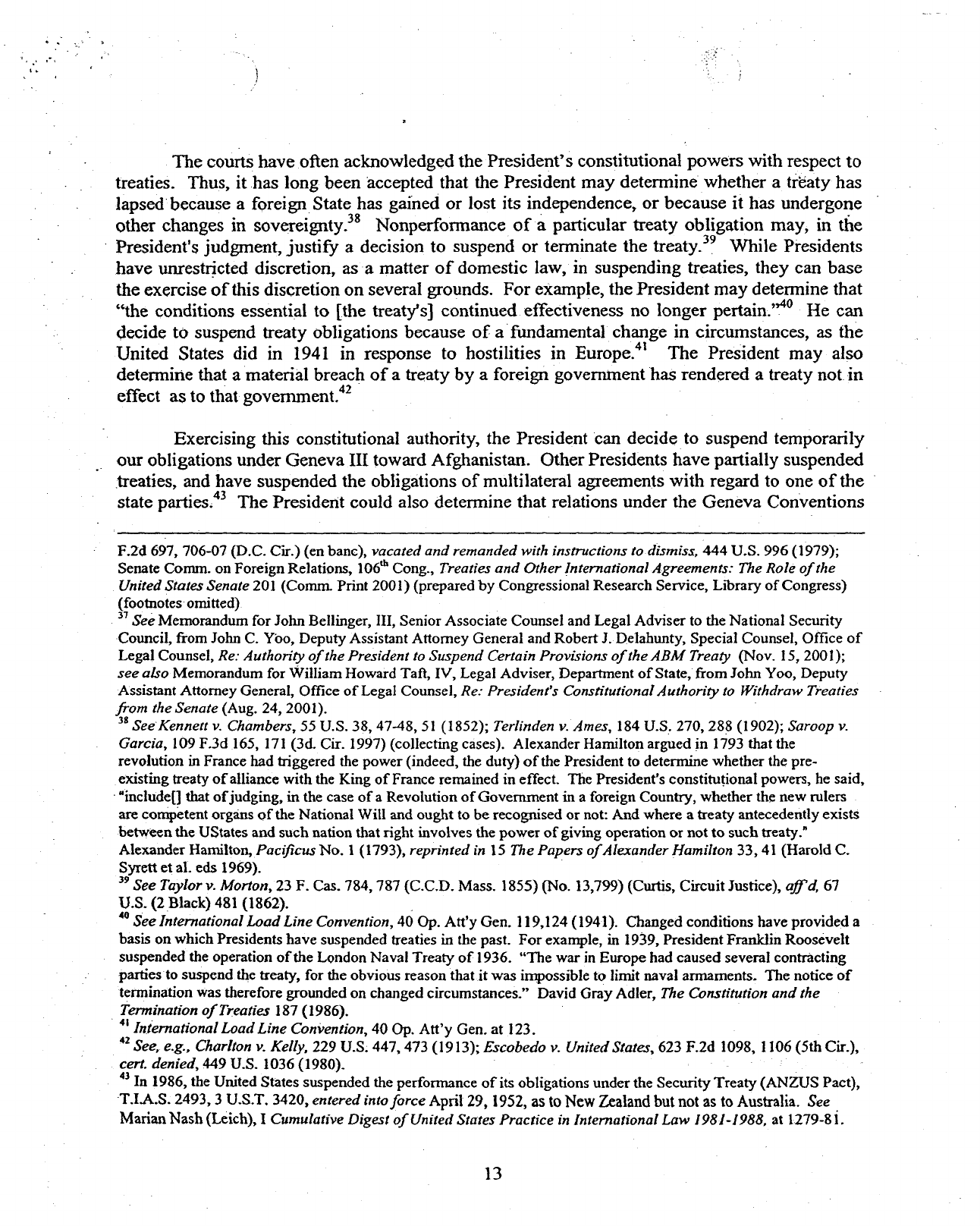
The courts have often acknowledged the President's constitutional powers with respect to
treaties. Thus, it has long been accepted that the President may determine whether a treaty has
lapsed because a foreign State has gained or lost its independence, or because it has undergone
other changes in sovereignty.
38
Nonperformance of a particular treaty obligation may, in the
President's judgment, justify a decision to suspend or terminate the treaty.
39
While Presidents
have unrestricted discretion, as a matter of domestic law, in suspending treaties, they can base
the exercise of this discretion on several grounds. For example, the President may determine that
"the conditions essential to [the treaty's] continued effectiveness no longer pertain."
40
He can
decide to suspend treaty obligations because of a fundamental change in circumstances, as the
United States did in 1941 in response to hostilities in Europe.
41
The President may also
determine that a material breach of a treaty by a foreign government has rendered a treaty not in
effect as to that government.
42
Exercising this constitutional authority, the President can decide to suspend temporarily
our obligations under Geneva III toward Afghanistan. Other Presidents have partially suspended
treaties, and have suspended the obligations of multilateral agreements with regard to one of the
state parties.
43
The President could also determine that relations under the Geneva Conventions
F.2d 697, 706-07 (D.C. Cir.) (en banc), vacated and remanded with instructions to dismiss, 444 U.S. 996 (1979);
Senate Comm. on Foreign Relations, 106
th
Cong., Treaties and Other International Agreements: The Role of the
United States Senate 201 (Comm. Print 2001) (prepared by Congressional Research Service, Library of Congress)
(footnotes omitted)
37
See Memorandum for John Bellinger, III, Senior Associate Counsel and Legal Adviser to the National Security
Council, from John C. Yoo, Deputy Assistant Attorney General and Robert J. Delahunty, Special Counsel, Office of
Legal Counsel, Re: Authority of the President to Suspend Certain Provisions of the ABM Treaty (Nov. 15, 2001);
see also Memorandum for William Howard Taft, IV, Legal Adviser, Department of State, from John Yoo, Deputy
Assistant Attorney General, Office of Legal Counsel, Re: President's Constitutional Authority to Withdraw Treaties
from the Senate (Aug. 24, 2001).
38
See Kennett
v.
Chambers, 55 U.S. 38, 47-48, 51 (1852); Terlinden v. Ames, 184 U.S. 270,288 (1902); Saroop v.
Garcia, 109 F.3d 165, 171 (3d. Cir. 1997) (collecting cases). Alexander Hamilton argued in 1793 that the
revolution in France had triggered the power (indeed, the duty) of the President to determine whether the pre-
existing treaty of alliance with the King of France remained in effect. The President's constitutional powers, he said,
"include that of judging, in the case of a Revolution of Government in a foreign Country, whether the new rulers
are competent organs of the National Will and ought to be recognised or not: And where a treaty antecedently exists
between the UStates and such nation that right involves the power of giving operation or not to such treaty."
Alexander Hamilton, Pacificus No. 1 (1793), reprinted in 15 The Papers of Alexander Hamilton 33,41 (Harold C.
Syrett et al. eds 1969).
39
See Taylor
v.
Morton, 23 F. Cas. 784, 787 (C.C.D. Mass. 1855) (No. 13,799) (Curtis, Circuit Justice),
affd,
67
U.S.
(2 Black) 481 (1862).
40
See International Load Line Convention, 40 Op. Att'y Gen. 119,124 (1941). Changed conditions have provided a
basis on which Presidents have suspended treaties in the past. For example, in 1939, President Franklin Roosevelt
suspended the operation of the London Naval Treaty of 1936. "The war in Europe had caused several contracting
parties to suspend the treaty, for the obvious reason that it was impossible to limit naval armaments. The notice of
termination was therefore grounded on changed circumstances." David Gray Adler, The Constitution and the
Termination of Treaties 187 (1986).
41
International Load Line Convention, 40 Op. Att'y Gen. at 123.
42
See, e.g., Charlton v. Kelly, 229 U.S. 447,473 (1913); Escobedo v. United States, 623 F.2d 1098, 1106 (5th Cir.),
cert,
denied,
449 U.S. 1036 (1980).
43
In 1986, the United States suspended the performance of its obligations under the Security Treaty (ANZUS Pact),
T.I.A.S. 2493,3 U.S.T. 3420, entered into force April 29, 1952, as to New Zealand but not as to Australia. See
Marian Nash (Leich), I Cumulative Digest of United States Practice in International Law 1981-1988, at
1279-81.
13
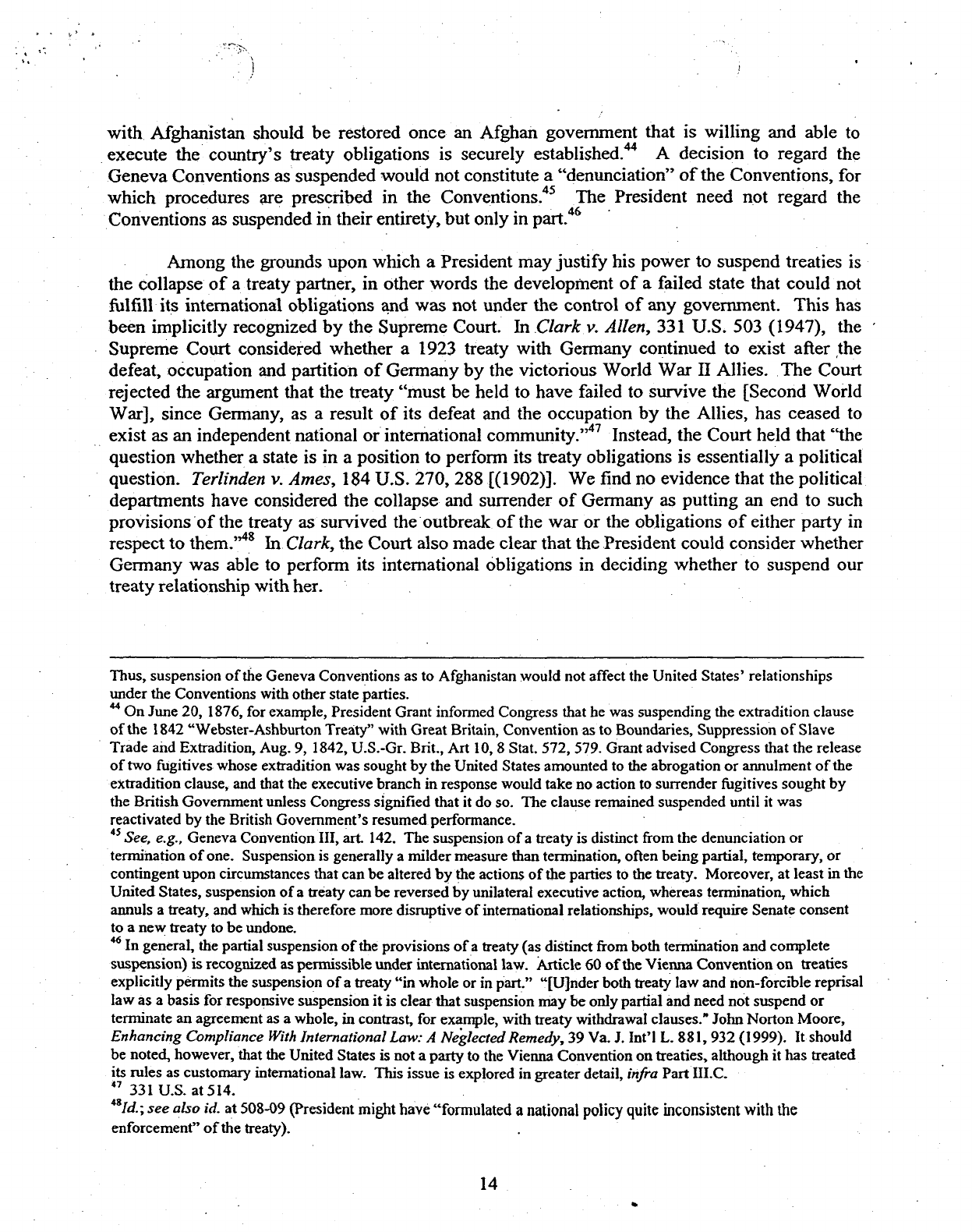
with Afghanistan should be restored once an Afghan government that is willing and able to
execute the country's treaty obligations is securely established.
44
A decision to regard the
Geneva Conventions as suspended would not constitute a "denunciation" of the Conventions, for
which procedures are prescribed in the Conventions.
45
The President need not regard the
Conventions as suspended in their entirety, but only in part.
46
Among the grounds upon which a President may justify his power to suspend treaties is
the collapse of a treaty partner, in other words the development of a failed state that could not
fulfill its international obligations and was not under the control of any government. This has
been implicitly recognized by the Supreme Court. In Clark v. Allen, 331 U.S. 503 (1947), the
Supreme Court considered whether a 1923 treaty with Germany continued to exist after the
defeat, occupation and partition of Germany by the victorious World War II Allies. The Court
rejected the argument that the treaty "must be held to have failed to survive the [Second World
War],
since Germany, as a result of its defeat and the occupation by the Allies, has ceased to
exist as an independent national or international community."
47
Instead, the Court held that "the
question whether a state is in a position to perform its treaty obligations is essentially a political
question. Terlinden v. Ames, 184 U.S. 270, 288 [(1902)]. We find no evidence that the political
departments have considered the collapse and surrender of Germany as putting an end to such
provisions of the treaty as survived the outbreak of the war or the obligations of either party in
respect to them."
48
In Clark, the Court also made clear that the President could consider whether
Germany was able to perform its international obligations in deciding whether to suspend our
treaty relationship with her.
Thus,
suspension of the Geneva Conventions as to Afghanistan would not affect the United States' relationships
under the Conventions with other state parties.
On June 20, 1876, for example, President Grant informed Congress that he was suspending the extradition clause
of the 1842 "Webster-Ashburton Treaty" with Great Britain, Convention as to Boundaries, Suppression of Slave
Trade and Extradition, Aug. 9, 1842, U.S.-Gr. Brit., Art 10, 8 Stat. 572, 579. Grant advised Congress that the release
of two fugitives whose extradition was sought by the United States amounted to the abrogation or annulment of the
extradition clause, and that the executive branch in response would take no action to surrender fugitives sought by
the British Government unless Congress signified that it do so. The clause remained suspended until it was
reactivated by the British Government's resumed performance.
45
See, e.g., Geneva Convention III, art 142. The suspension of
a
treaty is distinct from the denunciation or
termination of
one.
Suspension is generally a milder measure than termination, often being partial, temporary, or
contingent upon circumstances that can be altered by the actions of the parties to the treaty. Moreover, at least in the
United States, suspension of
a
treaty can be reversed by unilateral executive action, whereas termination, which
annuls a treaty, and which is therefore more disruptive of international relationships, would require Senate consent
to a new treaty to be undone.
46
In general, the partial suspension of the provisions of a treaty (as distinct from both termination and complete
suspension) is recognized as permissible under international law. Article 60 of the Vienna Convention on treaties
explicitly permits the suspension of a treaty "in whole or in part." "[U]nder both treaty law and non-forcible reprisal
law as a basis for responsive suspension it is clear that suspension may be only partial and need not suspend or
terminate an agreement as a whole, in contrast, for example, with treaty withdrawal clauses." John Norton Moore,
Enhancing Compliance
With
International Law: A Neglected Remedy, 39 Va. J. Int'l L. 881,932 (1999). It should
be noted, however, that the United States is not a party to the Vienna Convention on treaties, although it has treated
its rules as customary international law. This issue is explored in greater detail, infra Part III.C.
47
331U.S. at 514.
48
Id.;
see
also
id.
at 508-09 (President might have "formulated a national policy quite inconsistent with the
enforcement" of the treaty).
14
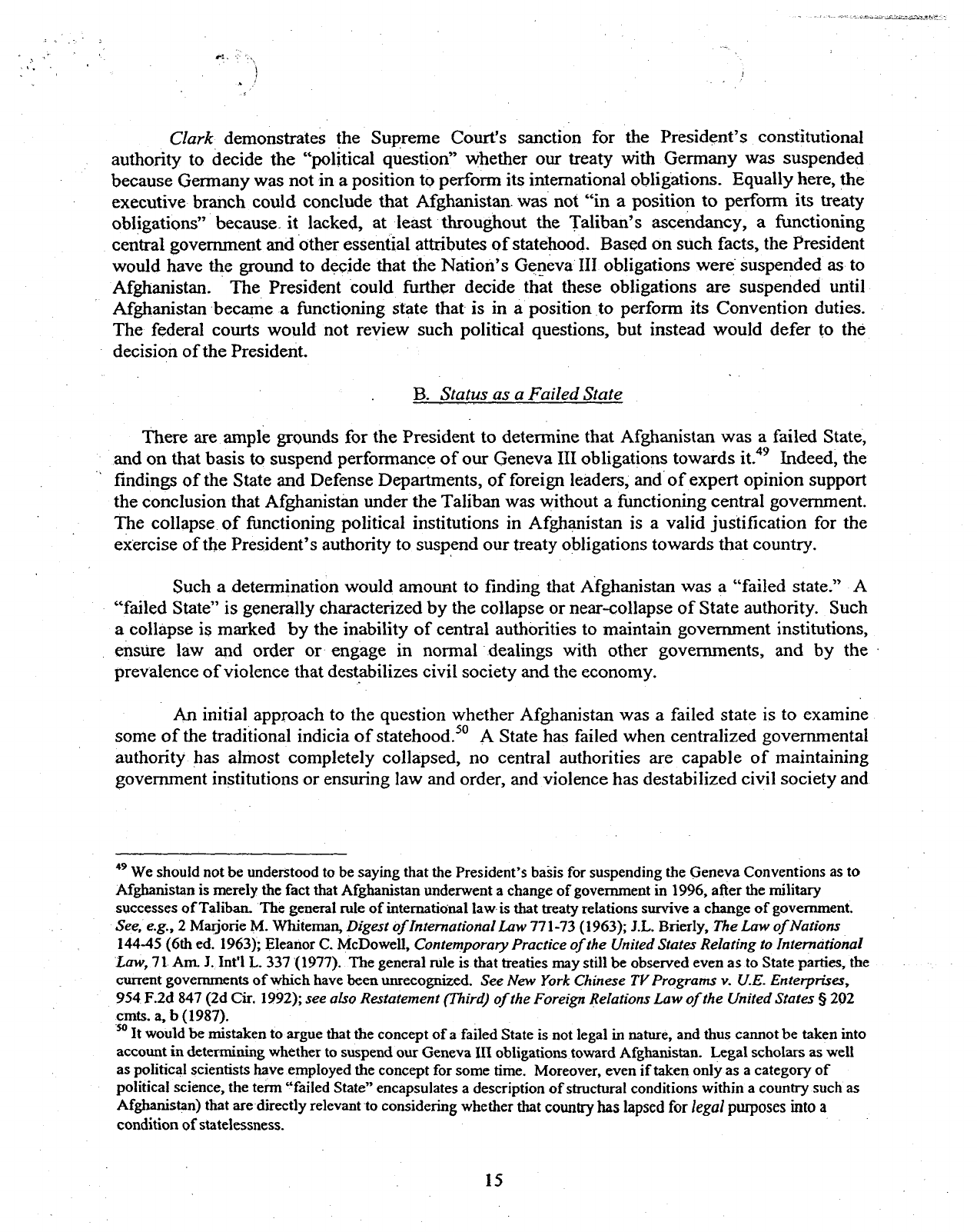
Clark demonstrates the Supreme Court's sanction for the President's constitutional
authority to decide the "political question" whether our treaty with Germany was suspended
because Germany was not in a position to perform its international obligations. Equally here, the
executive branch could conclude that Afghanistan, was not "in a position to perform its treaty
obligations" because it lacked, at least throughout the Taliban's ascendancy, a functioning
central government and other essential attributes of statehood. Based on such facts, the President
would have the ground to decide that the Nation's Geneva
III.
obligations were suspended as to
Afghanistan. The President could further decide that these obligations are suspended until
Afghanistan became a functioning state that is in a position to perform its Convention duties.
The federal courts would not review such political questions, but instead would defer to the
decision of the President.
B.
Status as a Failed State
There are ample grounds for the President to determine that Afghanistan was a failed State,
and on that basis to suspend performance of our Geneva III obligations towards it.
49
Indeed, the
findings of the State and Defense Departments, of foreign leaders, and of expert opinion support
the conclusion that Afghanistan under the Taliban was without a functioning central government.
The collapse of functioning political institutions in Afghanistan is a valid justification for the
exercise of the President's authority to suspend our treaty obligations towards that country.
Such a determination would amount to finding that Afghanistan was a "failed state." A
"failed State" is generally characterized by the collapse or near-collapse of State authority. Such
a collapse is marked by the inability of central authorities to maintain government institutions,
ensure law and order or engage in normal dealings with other governments, and by the
prevalence of violence that destabilizes civil society and the economy.
An initial approach to the question whether Afghanistan was a failed state is to examine
some of the traditional indicia of statehood.
50
A State has failed when centralized governmental
authority has almost completely collapsed, no central authorities are capable of maintaining
government institutions or ensuring law and order, and violence has destabilized civil society and
49
We should not be understood to be saying that the President's basis for suspending the Geneva Conventions as to
Afghanistan is merely the fact that Afghanistan underwent a change of government in 1996, after the military
successes of Taliban. The general rule of international law is that treaty relations survive a change of government.
See, e.g., 2 Marjorie M. Whiteman, Digest of International Law 771-73 (1963); J.L. Brierly, The Law of Nations
144-45 (6th ed. 1963); Eleanor C. McDowell, Contemporary Practice of the United States Relating to International
Law, 71 Am. J. Int'l L. 337 (1977). The general rule is that treaties may still be observed even as to State parties, the
current governments of which have been unrecognized. See New York Chinese TV Programs v. U.E. Enterprises,
954 F.2d 847 (2d Cir. 1992); see also Restatement (Third) of the Foreign Relations Law of the United States § 202
cmts.
a, b (1987).
It would be mistaken to argue that the concept of a failed State is not legal in nature, and thus cannot be taken into
account in determining whether to suspend our Geneva III obligations toward Afghanistan. Legal scholars as well
as political scientists have employed the concept for some time. Moreover, even if taken only as a category of
political science, the term "failed State" encapsulates a description of structural conditions within a country such as
Afghanistan) that are directly relevant to considering whether that country has lapsed for legal purposes into a
condition of statelessness.
15
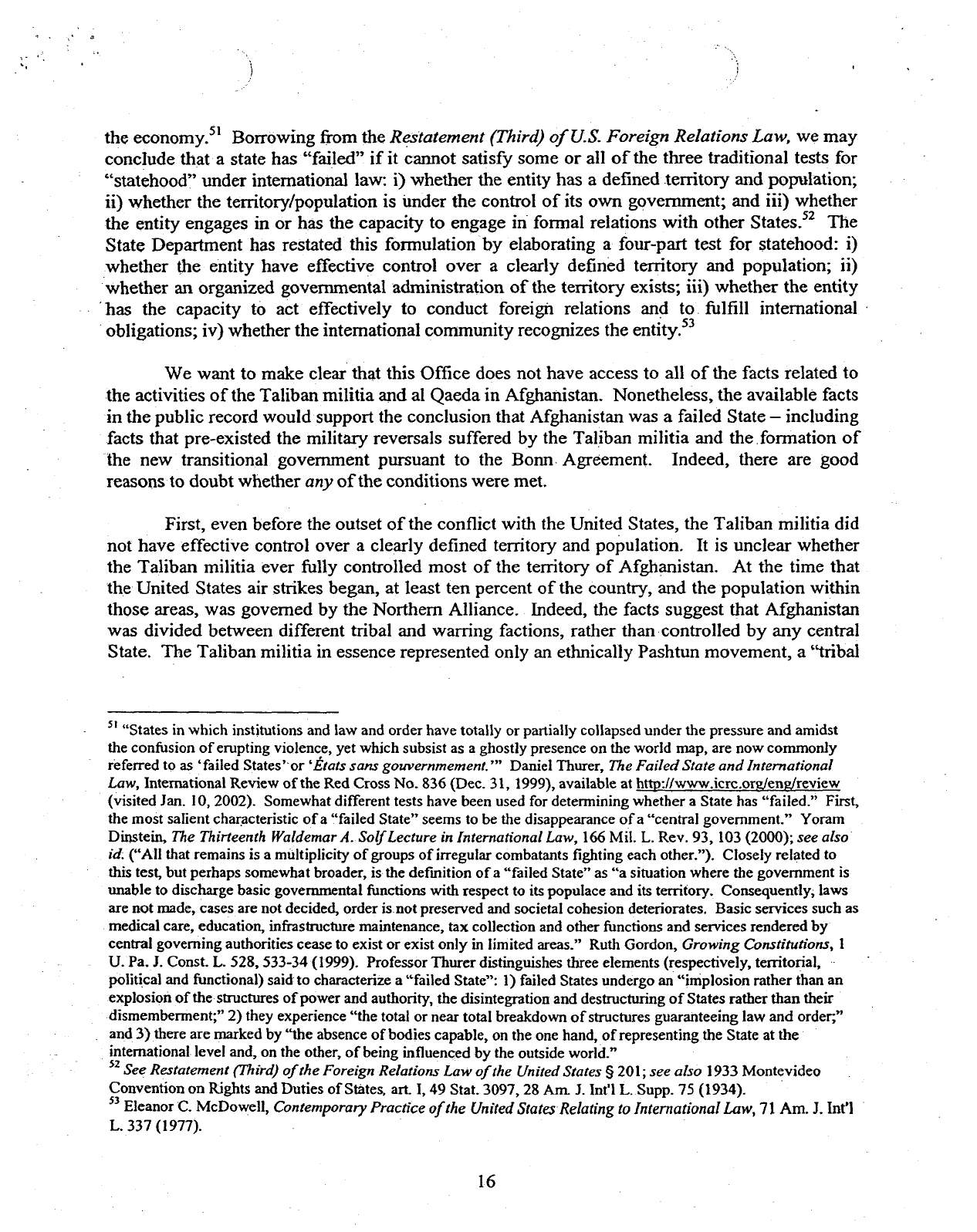
the economy.
51
Borrowing from the Restatement (Third) of U.S. Foreign Relations Law, we may
conclude that a state has "failed" if it cannot satisfy some or all of the three traditional tests for
"statehood" under international law: i) whether the entity has a defined territory and population;
ii) whether the territory/population is under the control of its own government; and iii) whether
the entity engages in or has the capacity to engage in formal relations with other States.
52
The
State Department has restated this formulation by elaborating a four-part test for statehood: i)
whether the entity have effective control over a clearly defined territory and population; ii)
whether an organized governmental administration of the territory exists; iii) whether the entity
has the capacity to act effectively to conduct foreign relations and to fulfill international
obligations; iv) whether the international community recognizes the entity.
We want to make clear that this Office does not have access to all of the facts related to
the activities of the Taliban militia and al Qaeda in Afghanistan. Nonetheless, the available facts
in the public record would support the conclusion that Afghanistan was a failed State
—
including
facts that pre-existed the military reversals suffered by the Taliban militia and the formation of
the new transitional government pursuant to the Bonn Agreement. Indeed, there are good
reasons to doubt whether any of the conditions were met.
First, even before the outset of the conflict with the United States, the Taliban militia did
not have effective control over a clearly defined territory and population. It is unclear whether
the Taliban militia ever fully controlled most of the territory of Afghanistan. At the time that
the United States air strikes began, at least ten percent of the country, and the population within
those areas, was governed by the Northern Alliance. Indeed, the facts suggest that Afghanistan
was divided between different tribal and warring factions, rather than controlled by any central
State. The Taliban militia in essence represented only an ethnically Pashtun movement, a "tribal
51
"States in which institutions and law and order have totally or partially collapsed under the pressure and amidst
the confusion of erupting violence, yet which subsist as a ghostly presence on the world map, are now commonly
referred to as 'failed States' or "etats sans gouvernmement.'" Daniel Thurer, The Failed State and International
Law, International Review of the Red Cross No. 836 (Dec. 31, 1999), available at http://www.icrc.org/eng/review
(visited Jan. 10, 2002). Somewhat different tests have been used for determining whether a State has "failed." First,
the most salient characteristic of a "failed State" seems to be the disappearance of a "central government." Yoram
Dinstein, The Thirteenth Waldemar
A.
Solf
Lecture in International Law, 166 Mil. L. Rev. 93, 103 (2000); see also
id. ("All that remains is a multiplicity of groups of irregular combatants fighting each other."). Closely related to
this test, but perhaps somewhat broader, is the definition of a "failed State" as "a situation where the government is
unable to discharge basic governmental functions with respect to its populace and its territory. Consequently, laws
are not made, cases are not decided, order is not preserved and societal cohesion deteriorates. Basic services such as
medical care, education, infrastructure maintenance, tax collection and other functions and services rendered by
central governing authorities cease to exist or exist only in limited areas." Ruth Gordon, Growing Constitutions, 1
U. Pa. J. Const. L. 528,533-34 (1999). Professor Thurer distinguishes three elements (respectively, territorial,
political and functional) said to characterize a "failed State": 1) failed States undergo an "implosion rather than an
explosion of the structures of power and authority, the disintegration and destructuring of States rather than their
dismemberment;" 2) they experience "the total or near total breakdown of structures guaranteeing law and order;"
and 3) there are marked by "the absence of bodies capable, on the one hand, of representing the State at the
international level and, on the other, of being influenced by the outside world."
52
See Restatement (Third) of the Foreign Relations Law of the United States §
201;
see also 1933 Montevideo
Convention on Rights and Duties of States, art. 1,49 Stat. 3097, 28 Am. J. Int'l L. Supp. 75 (1934).
53
Eleanor C. McDowell, Contemporary Practice of the United States Relating to International Law, 71 Am. J. Int'l
L. 337(1977).
16
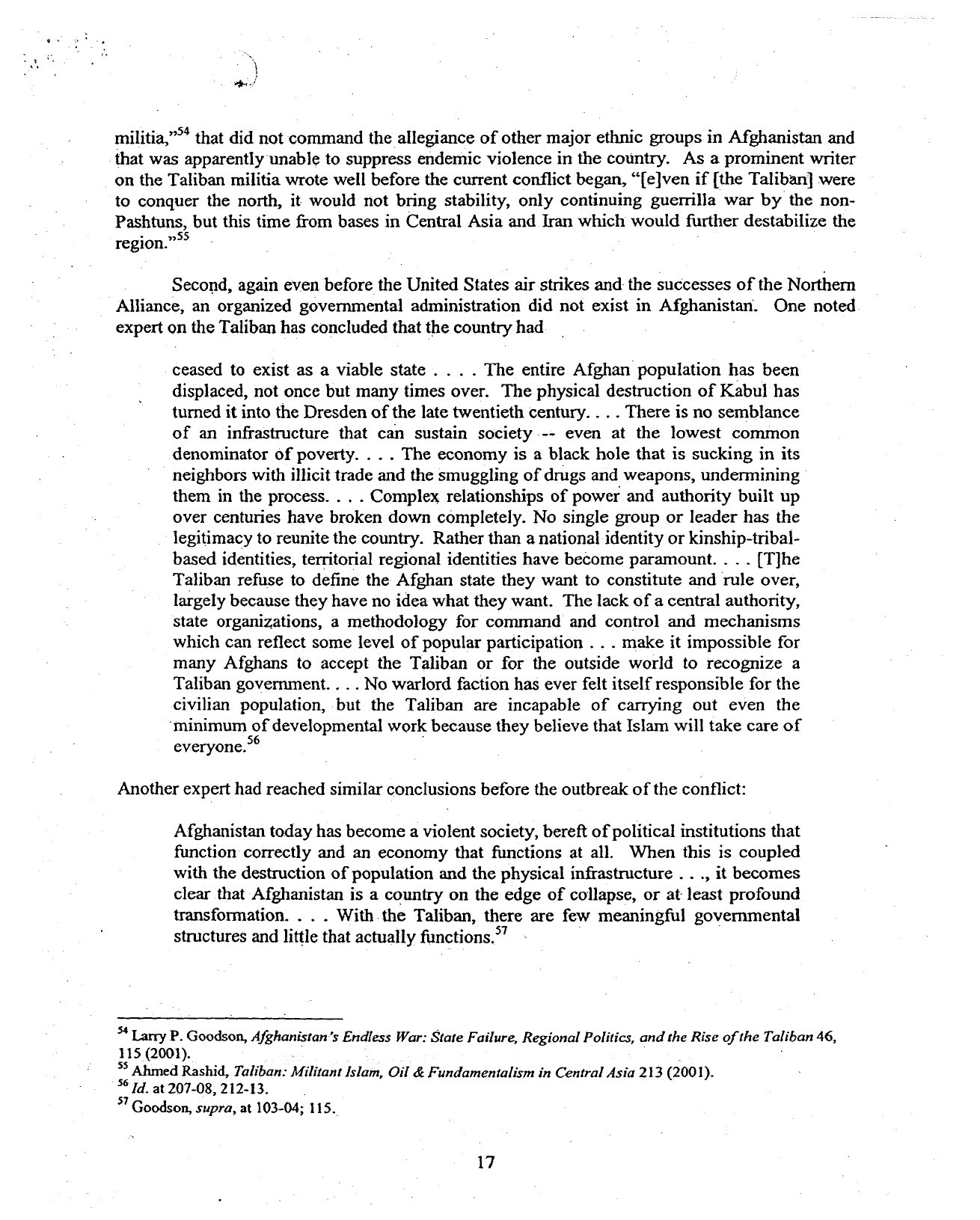
militia"
'
54
that did not command the allegiance of other major ethnic groups in Afghanistan and
that was apparently unable to suppress endemic violence in the country. As a prominent writer
on the Taliban militia wrote well before the current conflict began, "[e]ven if [the Taliban] were
to conquer the north, it would not bring stability, only continuing guerrilla war by the non-
Pashtuns, but this time from bases in Central Asia and Iran which would further destabilize the
region."
55
Second, again even before the United States air strikes and the successes of
the
Northern
Alliance, an organized governmental administration did not exist in Afghanistan. One noted
expert on the Taliban has concluded that the country had
ceased to exist as a viable state .... The entire Afghan population has been
displaced, not once but many times over. The physical destruction of Kabul has
turned it into the Dresden of the late twentieth century.. .. There is no semblance
of an infrastructure that can sustain society
—
even at the lowest common
denominator of
poverty.
. . . The economy is a black hole that is sucking in its
neighbors with illicit trade and the smuggling of drugs and weapons, undermining
them in the process. . . . Complex relationships of power and authority built up
over centuries have broken down completely. No single group or leader has the
legitimacy to reunite the country. Rather than a national identity or kinship-tribal-
based identities, territorial regional identities have become paramount. . . . [T]he
Taliban refuse to define the Afghan state they want to constitute and rule over,
largely because they
have
no idea what they want. The lack of a central authority,
state organizations, a methodology for command and control and mechanisms
which can reflect some level of popular participation . . . make it impossible for
many Afghans to accept the Taliban or for the outside world to recognize a
Taliban government.... No warlord faction has ever felt itself responsible for the
civilian population, but the Taliban are incapable of carrying out even the
minimum of developmental work because they believe that Islam will take care of
everyone.
56
Another expert had reached similar conclusions before the outbreak of the conflict:
Afghanistan today has become a violent society, bereft of political institutions that
function correctly and an economy that functions at all. When this is coupled
with the destruction of population and the physical infrastructure . . ,, it becomes
clear that Afghanistan is a country on the edge of collapse, or at least profound
transformation. . . . With the Taliban, there are few meaningful governmental
structures and little that actually functions.
57
Larry P. Goodson, Afghanistan's Endless War: State Failure, Regional Politics, and the Rise of the Taliban 46,
115(2001).
55
Ahmed Rashid, Taliban: Militant Islam, Oil & Fundamentalism in Central Asia 213 (2001).
56 Id
.at207-08,212-13.
57
Goodson, supra, at 103-04; 115.
17
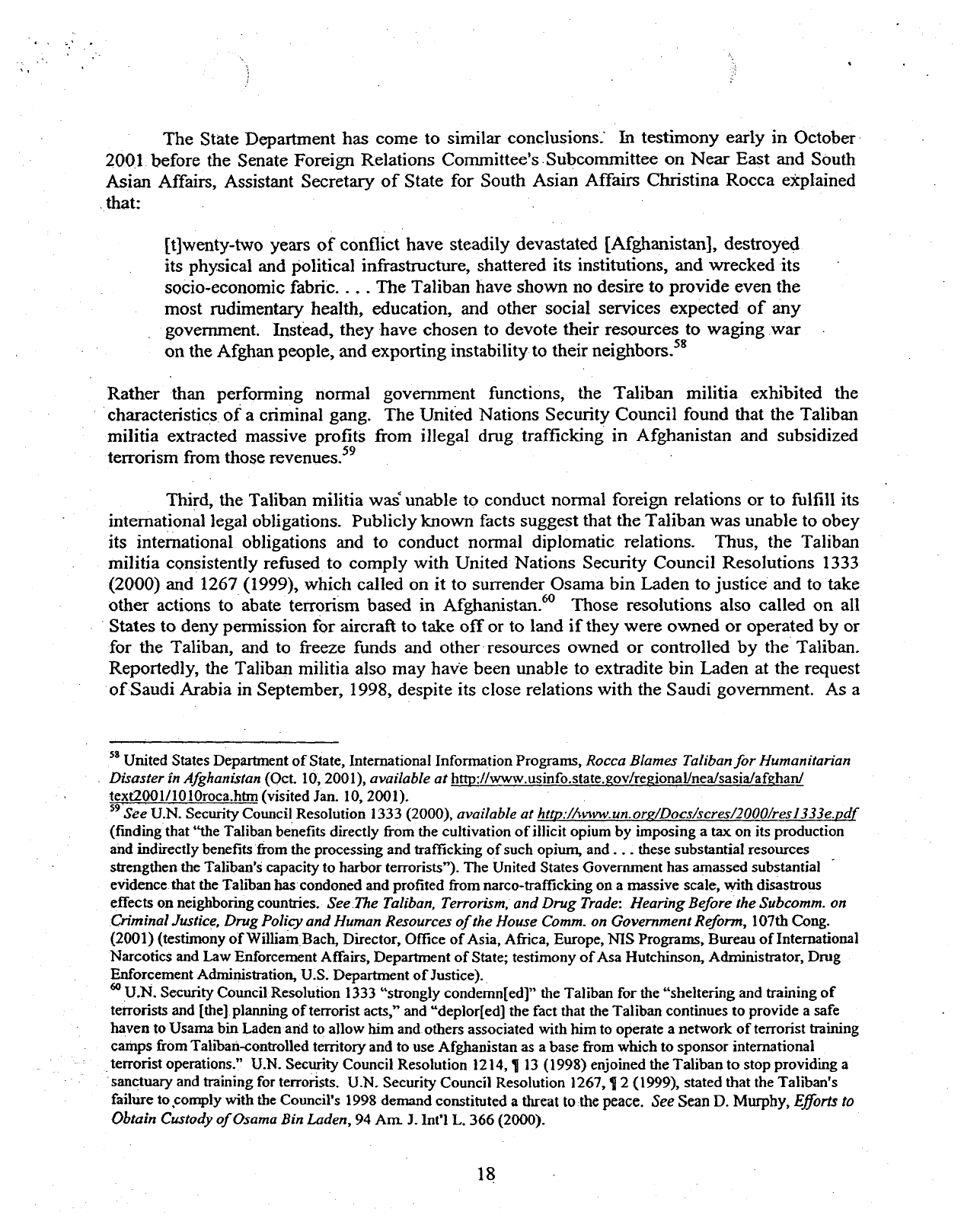
The State Department has come to similar conclusions, In testimony early in October
2001 before the Senate Foreign Relations Committee's Subcommittee on Near East and South
Asian Affairs, Assistant Secretary of State for South Asian Affairs Christina Rocca explained
that:
[twenty-two years of conflict have steadily devastated [Afghanistan], destroyed
its physical and political infrastructure, shattered its institutions, and wrecked its
socio-economic fabric.... The Taliban have shown no desire to provide even the
most rudimentary health, education, and other social services expected of any
government. Instead, they have chosen to devote their resources to waging war
on the Afghan people, and exporting instability to their neighbors.
58
Rather than performing normal government functions, the Taliban militia exhibited the
characteristics of
a
criminal gang. The United Nations Security Council found that the Taliban
militia extracted massive profits from illegal drug trafficking in Afghanistan and subsidized
terrorism from those revenues.
59
Third, the Taliban militia
was"
unable to conduct normal foreign relations or to fulfill its
international legal obligations. Publicly known facts suggest that the Taliban was unable to obey
its international obligations and to conduct normal diplomatic relations. Thus, the Taliban
militia consistently refused to comply with United Nations Security Council Resolutions 1333
(2000) and 1267 (1999), which called on it to surrender Osama bin Laden to justice and to take
other actions to abate terrorism based in Afghanistan.
60
Those resolutions also called on all
States to deny permission for aircraft to take off or to land if they were owned or operated by or
for the Taliban, and to freeze funds and other resources owned or controlled by the Taliban.
Reportedly, the Taliban militia also may have been unable to extradite bin Laden at the request
of Saudi Arabia in September, 1998, despite its close relations with the Saudi government. As a
5
United States Department of State, International Information Programs, Rocca Blames Taliban for Humanitarian
Disaster in Afghanistan (Oct. 10,2001), available at http://www.usinfo.state.gov/regional/nea/sasia/afghan/
text2001/1010roca.htm (visited Jan. 10. 2001).
59
See U.N. Security Council Resolution 1333 (2000), available at http://www.un.org/Docs/scres/2000/resI 333e.pdf
(finding that "the Taliban benefits directly from the cultivation of illicit opium by imposing a tax on its production
and indirectly benefits from the processing and trafficking of such opium, and... these substantial resources
strengthen the Taliban's capacity to harbor terrorists"). The United States Government has amassed substantial
evidence that the Taliban has condoned and profited from narco-trafficking on a massive scale, with disastrous
effects on neighboring countries. See The Taliban, Terrorism, and Drug Trade: Hearing Before the Subcomm. on
Criminal Justice, Drug Policy and Human Resources of the House Comm. on Government Reform, 107th Cong.
(2001) (testimony of William Bach, Director, Office of Asia, Africa, Europe, NIS Programs, Bureau of International
Narcotics and Law Enforcement Affairs, Department of State; testimony of Asa Hutchinson, Administrator, Drug
Enforcement Administration, U.S. Department of Justice).
60
U.N. Security Council Resolution 1333 "strongly condemn[ed]" the Taliban for the "sheltering and training of
terrorists and [the] planning of terrorist acts," and "deplored the fact that the Taliban continues to provide a safe
haven to Usama bin Laden and to allow him and others associated with him to operate a network of terrorist training
camps from Taliban-controlled territory and to use Afghanistan as a base from which to sponsor international
terrorist operations." U.N. Security Council Resolution 1214, 13 (1998) enjoined the Taliban to stop providing a
sanctuary and training for terrorists. U.N. Security Council Resolution 1267, 2 (1999), stated that the Taliban's
failure to comply with the Council's 1998 demand constituted a threat to the peace. See Sean D. Murphy, Efforts to
Obtain Custody of Osama Bin Laden, 94 Am. J. Int'l L. 366 (2000).
18
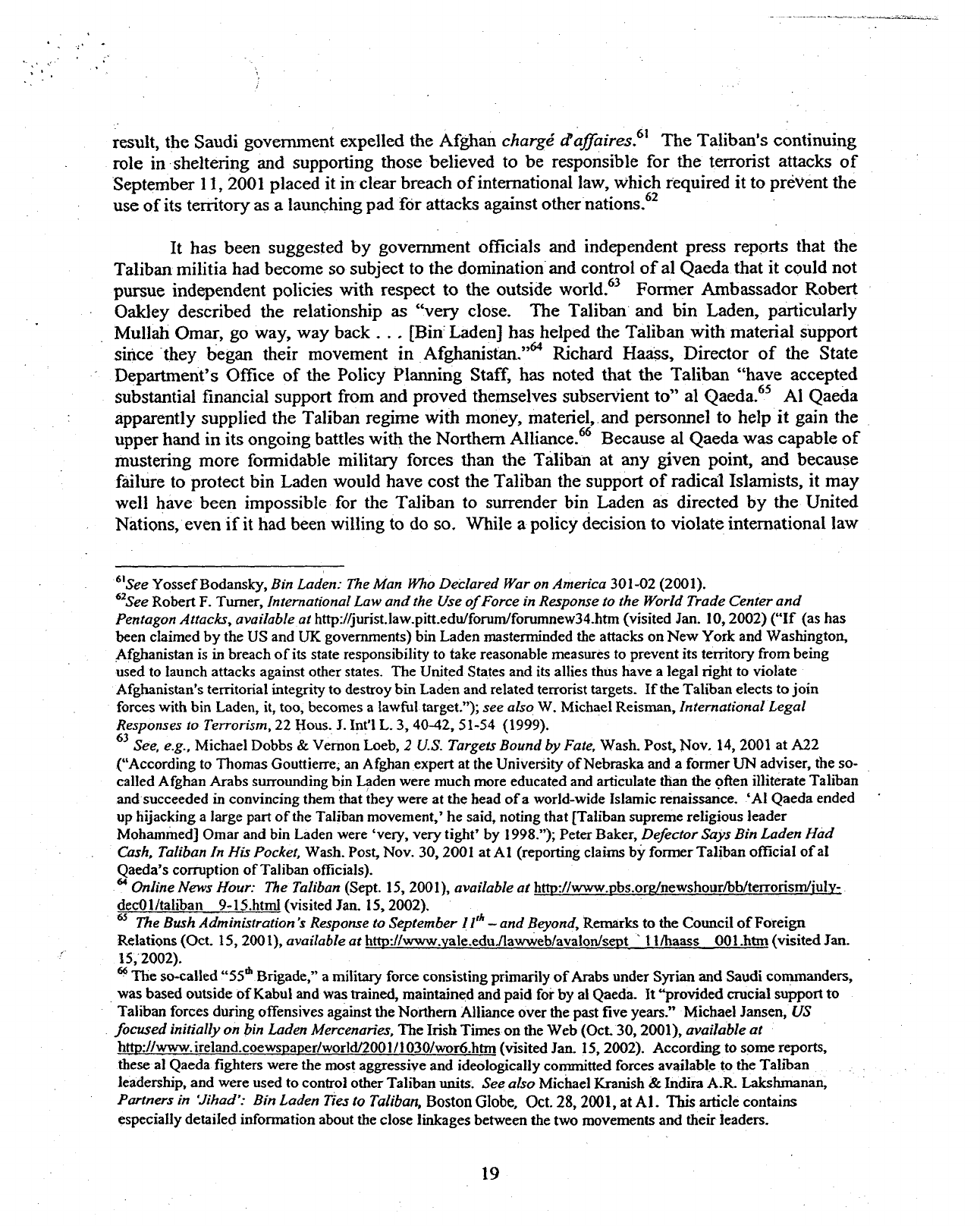
result, the Saudi government expelled the Afghan charge
d'affaires.
61
The Taliban's continuing
role in sheltering and supporting those believed to be responsible for the terrorist attacks of
September
11,
2001
placed it in clear breach of international law, which required it to prevent the
use of its territory
as
a launching pad for attacks against other nations.
62
It has been suggested by government officials and independent press reports that the
Taliban militia had become so subject to the domination and control of al Qaeda that it could not
pursue independent policies with respect to the outside world.
6
Former Ambassador Robert
Oakley described the relationship as "very close. The Taliban and bin Laden, particularly
Mullah Omar, go way, way back . . . [Bin Laden] has helped the Taliban with material support
since they began their movement in Afghanistan."
64
Richard Haass, Director of the State
Department's Office of the Policy Planning
Staff,
has noted that the Taliban "have accepted
substantial financial support from and proved themselves subservient to" al Qaeda.
65
Al Qaeda
apparently supplied the Taliban regime with money, materiel, and personnel to help it gain the
upper hand in its ongoing battles with the Northern Alliance.
66
Because al Qaeda was capable of
mustering more formidable military forces than the Taliban at any given point, and because
failure to protect bin Laden would have cost the Taliban the support of radical Islamists, it may
well have been impossible for the Taliban to surrender bin Laden as directed by the United
Nations, even if it had been willing to do so. While a policy decision to violate international law
"See Yossef Bodansky, Bin Laden: The Man Who Declared War on America 301-02 (2001).
62
See Robert F. Turner, International Law and the Use of Force in Response to the World Trade Center and
Pentagon Attacks, available at http://jurist.law.pitt.edu/forum/forumnew34.htm (visited Jan. 10,2002) ("If (as has
been claimed by the US and UK governments) bin Laden masterminded the attacks on New York and Washington,
Afghanistan is in breach of its state responsibility to take reasonable measures to prevent its territory from being
used to launch attacks against other
states.
The United States and its allies thus have a legal right to violate
Afghanistan's territorial integrity to destroy bin Laden and related terrorist targets. If the Taliban elects to join
forces with bin Laden, it, too, becomes a lawful target."); see also W. Michael Reisman, International Legal
Responses to Terrorism, 22 Hous. J. Int'l L. 3, 40-42, 51-54 (1999).
63
See, e.g., Michael Dobbs & Vernon Loeb, 2 U.S. Targets Bound by Fate, Wash. Post, Nov. 14, 2001 at A22
("According to Thomas Gouttierre, an Afghan expert at the University of Nebraska and a former UN adviser, the so-
called Afghan Arabs surrounding bin Laden were much more educated and articulate than the often illiterate Taliban
and succeeded in convincing them that they were at the head of a world-wide Islamic renaissance. 'Al Qaeda ended
up hijacking a large part of the Taliban movement,' he said, noting that (Taliban supreme religious leader
Mohammed] Omar and bin Laden were 'very, very tight' by 1998."); Peter Baker, Defector Says Bin Laden Had
Cash,
Taliban In His Pocket, Wash. Post, Nov. 30, 2001 at Al (reporting claims by former Taliban official of al
Qaeda's corruption of Taliban officials).
64
Online News Hour: The Taliban (Sept. 15, 2001), available at http://www.pbs.org/newshour/bb/terrorism/july-
dec01/taliban 9-15.html (visited Jan. 15.2002).
65
The Bush Administration's Response to September ll'
h
- and
Beyond,
Remarks to the Council of Foreign
Relations (Oct. 15, 2001), available at http://www.yale.edu/lawweb/avalon/sept 11/haass
001
.htm (visited Jan.
15,2002).
* The so-called "55* Brigade," a military force consisting primarily of Arabs under Syrian and Saudi commanders,
was based outside of Kabul and was trained, maintained and paid for by al Qaeda. It "provided crucial support to
Taliban forces during offensives against the Northern Alliance over the past five years." Michael Jansen, US
focused initially on bin Laden Mercenaries, The Irish Times on the Web (Oct 30,2001), available at
http://www.ireland.coewspaper/world/2001/1030/wor6.htm (visited Jan. 15,2002). According to some reports,
these al Qaeda fighters were the most aggressive and ideologically committed forces available to the Taliban
leadership, and were used to control other Taliban units. See also Michael Kranish & Indira A.R. Lakshmanan,
Partners in
'Jihad':
Bin Laden Ties to Taliban, Boston Globe, Oct.
28,2001,
at Al. This article contains
especially detailed information about the close linkages between the two movements and their leaders.
19
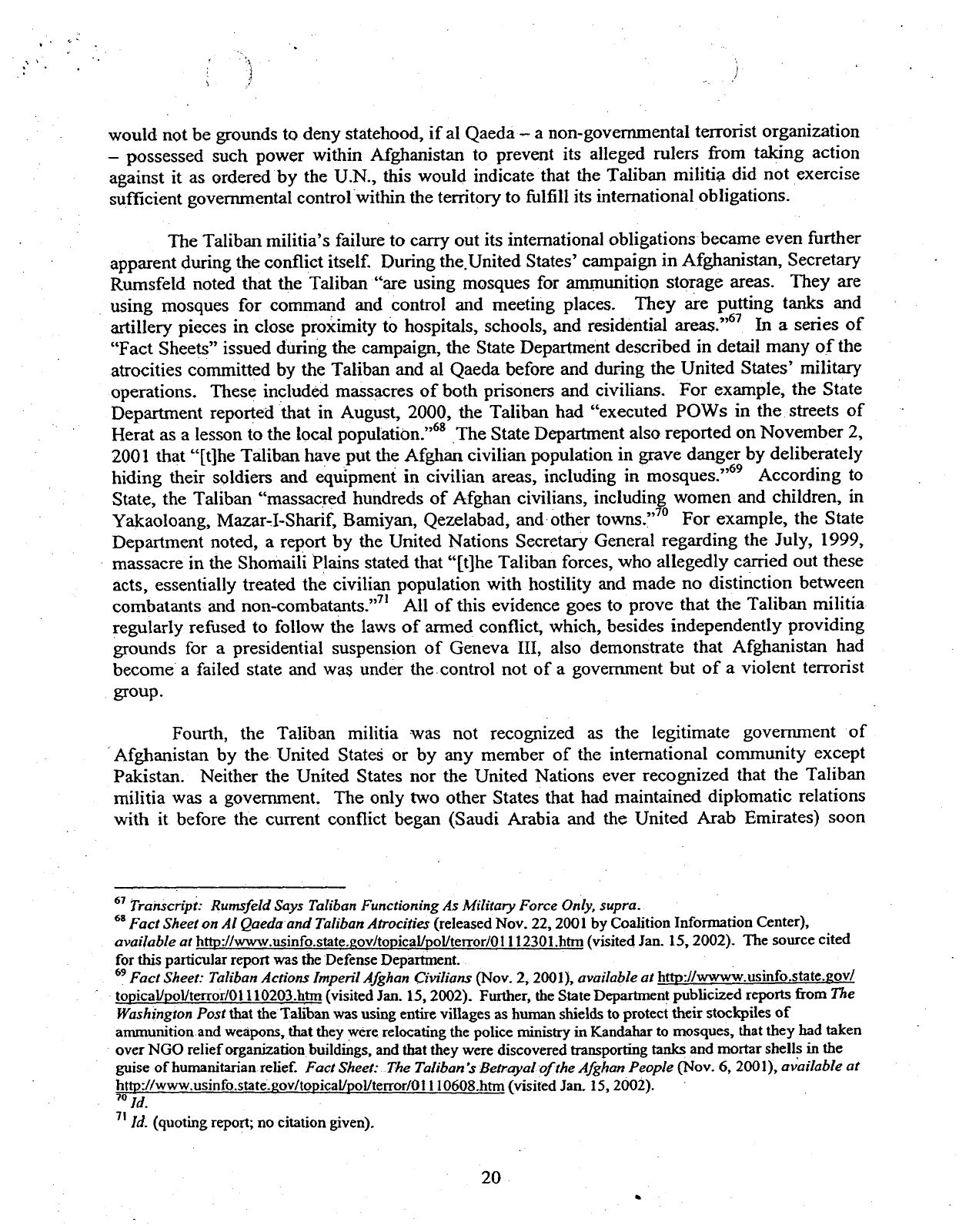
would not be grounds to deny statehood, if al Qaeda - a non-governmental terrorist organization
- possessed such power within Afghanistan to prevent its alleged rulers from taking action
against it as ordered by the U.N., this would indicate that the Taliban militia did not exercise
sufficient governmental control within the territory to fulfill its international obligations.
The Taliban militia's failure to carry out its international obligations became even further
apparent during the conflict
itself.
During the United States' campaign in Afghanistan, Secretary
Rumsfeld noted that the Taliban "are using mosques for ammunition storage areas. They are
using mosques for command and control and meeting places. They are putting tanks and
artillery pieces in close proximity to hospitals, schools, and residential areas." In a series of
"Fact Sheets" issued during the campaign, the State Department described in detail many of the
atrocities committed by the Taliban and al Qaeda before and during the United States' military
operations. These included massacres of both prisoners and civilians. For example, the State
Department reported that in August, 2000, the Taliban had "executed POWs in the streets of
Herat as a lesson to the local population."
68
The State Department also reported on November 2,
2001 that "[t]he Taliban have put the Afghan civilian population in grave danger by deliberately
hiding their soldiers and equipment in civilian areas, including in mosques." According to
State, the Taliban "massacred hundreds of Afghan civilians, including women and children, in
Yakaoloang, Mazar-I-Sharif, Bamiyan, Qezelabad, and other towns."
70
For example, the State
Department noted, a report by the United Nations Secretary General regarding the July, 1999,
massacre in the Shomaili Plains stated that "[t]he Taliban forces, who allegedly carried out these
acts,
essentially treated the civilian population with hostility and made no distinction between
combatants and non-combatants."
71
All of this evidence goes to prove that the Taliban militia
regularly refused to follow the laws of armed conflict, which, besides independently providing
grounds for a presidential suspension of Geneva III, also demonstrate that Afghanistan had
become a failed state and was under the control not of a government but of a violent terrorist
group.
Fourth, the Taliban militia was not recognized as the legitimate government of
Afghanistan by the United States or by any member of the international community except
Pakistan. Neither the United States nor the United Nations ever recognized that the Taliban
militia was a government. The only two other States that had maintained diplomatic relations
with it before the current conflict began (Saudi Arabia and the United Arab Emirates) soon
67
Transcript: Rumsfeld Says Taliban Functioning As Military Force Only, supra.
68
Fact Sheet on Al Qaeda and Taliban Atrocities (released Nov. 22, 2001 by Coalition Information Center),
available at http://www.usinfo.state.gov/topical/pol/terror/01112301.htm (visited Jan. 15,2002). The source cited
for this particular report was the Defense Department.
69
Fact Sheet: Taliban Actions Imperil Afghan Civilians (Nov. 2,2001), available at http://wwww.usinfo.state.gov/
topical/pol/terror/01110203.htm (visited Jan. 1.5, 2002). Further, the State Department publicized reports from The
Washington Post that the Taliban was using entire villages as human shields to protect their stockpiles of
ammunition and weapons, that they were relocating the police ministry in Kandahar to mosques, that they had taken
over NGO relief organization buildings, and that they were discovered transporting tanks and mortar shells in the
guise of humanitarian
relief.
Fact Sheet: The Taliban's Betrayal of the Afghan People (Nov. 6, 2001), available at
http://www.usinfo.state.gov/topical/pol/terror/01110608.htm (visited Jan. 15,2002).
10
Id.
Id. (quoting report; no citation given).
20
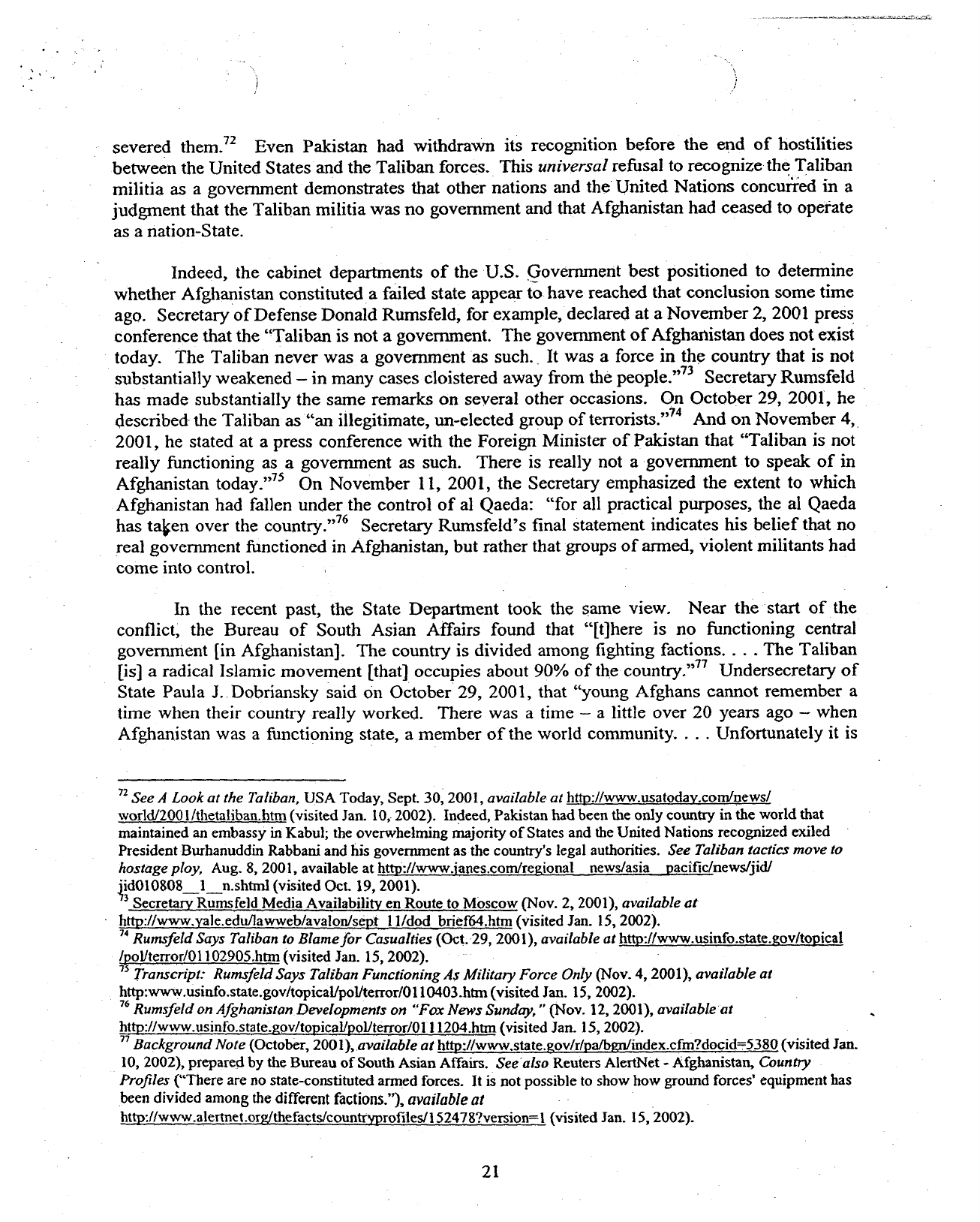
severed them.
72
Even Pakistan had withdrawn its recognition before the end of hostilities
between the United States and the Taliban forces. This universal refusal to recognize the Taliban
militia as a government demonstrates that other nations and the United Nations concurred in a
judgment that the Taliban militia was no government and that Afghanistan had ceased to operate
as a nation-State.
Indeed, the cabinet departments of the U.S. Government best positioned to determine
whether Afghanistan constituted a failed state appear to have reached that conclusion some time
ago.
Secretary of Defense Donald Rumsfeld, for example, declared at a November 2, 2001 press
conference that the "Taliban is not a government. The government of Afghanistan does not exist
today. The Taliban never was a government as such. It was a force in the country that is not
substantially weakened - in many cases cloistered away from the people."
73
Secretary Rumsfeld
has made substantially the same remarks on several other occasions. On October 29, 2001, he
described the Taliban as "an illegitimate, un-elected group of terrorists."
74
And on November 4,
2001,
he stated at a press conference with the Foreign Minister of Pakistan that "Taliban is not
really functioning as a government as such. There is really not a government to speak of in
Afghanistan today."
75
On November 11, 2001, the Secretary emphasized the extent to which
Afghanistan had fallen under the control of al Qaeda: "for all practical purposes, the al Qaeda
has taken over the country."
76
Secretary Rumsfeld's final statement indicates his belief that no
real government functioned in Afghanistan, but rather that groups of armed, violent militants had
come into control.
In the recent past, the State Department took the same view. Near the start of the
conflict, the Bureau of South Asian Affairs found that "[t]here is no functioning central
government [in Afghanistan]. The country is divided among fighting factions. . . . The Taliban
[is] a radical Islamic movement [that] occupies about 90% of the country"
77
Undersecretary of
State Paula J. Dobriansky said on October 29, 2001, that "young Afghans cannot remember a
time when their country really worked. There was a time
—
a little over 20 years ago - when
Afghanistan was a functioning state, a member of the world community. . . . Unfortunately it is
72
See A Look at the Taliban, USA Today, Sept. 30,
2001,
available at http://www.usatoday.com/news/
world/2001/thetaliban.htm (visited Jan. 10, 2002). Indeed, Pakistan had been the only country in the world that
maintained an embassy in Kabul; the overwhelming majority of States and the United Nations recognized exiled
President Burhanuddin Rabbani and his government as the country's legal authorities. See Taliban tactics move to
hostage ploy, Aug. 8, 2001, available at http://www.janes.com/regional news/asia pacific/news/jid/
jid010808_l_n.shtml (visited Oct 19,2001).
3
Secretary Rumsfeld Media Availability en Route to Moscow (Nov. 2, 2001), available at
http://www.yale.edu/lawweb/avalon/sept
1
l/dodbrief54,htm (visited Jan. 15, 2002).
74
Rumsfeld Says Taliban to Blame for Casualties (Oct. 29, 2001), available at http://www.usinfo.state.gov/topical
/pol/terror/01102905.htm (visited Jan. 15,2002).
75
Transcript: Rumsfeld Says Taliban Functioning As Military Force Only (Nov. 4,2001), available at
http:www.usinfo.state.gov/topical/pol/terror/0110403.htm (visited Jan. 15,2002).
76
Rumsfeld on Afghanistan Developments on "Fox News Sunday," (Nov. 12,2001), available at
http://www.usinfo.state.gov/topical/pol/terror/0111204.htm (visited Jan. 15,2002).
77
Background Note (October, 2001), available at http://www.state.gov/r/pa/bgn/index.cfm?docid==5380 (visited Jan.
10,
2002), prepared by the Bureau of South Asian Affairs. See also Reuters AlertNet - Afghanistan, Country
Profiles ("There are no state-constituted armed forces. It is not possible to show how ground forces' equipment has
been divided among the different factions."), available at
http://www.alennet.org/thefacts/countryprofiles/152478?version=l (visited Jan. 15, 2002).
21

now difficult to remember that functioning Afghanistan."
78
As recently as December 12, 2001,
the State Department's Office of International Information Programs, drawing on Coalition
Information Center materials and media reports, stated that both the Taliban and al Qaeda "are
terrorist organizations," and characterized the Taliban's leader, Mullah Omar, as "a terrorist."
79
Some international officials concur with the views of our Government. Lakhdar Brahimi,
for example, the United Nations mediator in Afghanistan and a former Algerian Foreign
Minister, described Afghanistan under the Taliban as a "failed state which looks like an infected
wound."
80
Tony Blair, the Prime Minister of Great Britain, on a visit to that country this month,
declared that "Afghanistan has been a failed state for too long and the whole world has paid the
price."
81
Based on the foregoing, it is apparent that the publicly-available evidence would support
the conclusion that Afghanistan, when largely controlled by the Taliban militia, failed some, and
perhaps all, of the ordinary tests of statehood. Nor do we think that the military successes of the
United States and the Northern Alliance change that outcome. Afghanistan was effectively
stateless for the relevant period of the conflict, even if after the Bonn Agreement it became a
State recognized by the United Nations, the United States, and most other nations.
82
The
President can readily find that at the outset of this conflict, when the country was largely in the
hands of the Taliban militia, there was no functioning central government in Afghanistan that
was capable of providing the most basic services to the Afghan population, of suppressing
endemic internal violence, or of maintaining normal relations with other governments. In other
words, the Taliban militia would not even qualify as the de facto government of Afghanistan.
Rather, it would have the status only of a violent faction or movement contending with other
factions for control of Afghanistan's territory, rather than the regular armed forces of an existing
state.
This would provide sufficient ground for the President to exercise his constitutional power
to suspend our Geneva III obligations toward Afghanistan.
C. Suspension Under International Law
Although the President may determine that Afghanistan was a failed State as a matter of
domestic law, there remains the distinct question whether suspension would be valid as a matter
78
Paula J. Dobransky, Afghanistan: Not Always a Battlefield (Oct. 29, 2001), available at
http://www.usinfo.state.gov/topical/pol/terror/01102908.htm (visited Jan. 15,2002).
79
The End of the Taliban Reign of Terror in Afghanistan (Dec. 12,2001), available at
http://www.usinfo.state.gov/topical/pol/terror/01121206.htm (visited Jan. 15,2002).
80
Rashid, supra, at 207.
81
Philip Webster, Blair's mission to Kabul, The Times of London, Jan. 8,2002, available at 2002 WL 4171996.
We do not think that the military successes of
the
United States and the Northern Alliance necessarily meant that
Afghanistan's statehood was restored before the Bonn agreement, if only because the international community,
including the United States, did not regard the Northern Alliance as constituting the government of Afghanistan.
United Nations Security Council Resolution 1378, 1 (2001), available at http://www.yale.edu/lawweb/
avalon/sept 11/unsecres 1378.htm (visited Nov. 19, 2001), expressed "strong support for the efforts of the
Afghan people to establish a new and transitional administration leading to the formation of a government"
(emphasis added); see also id. 3 (affirming that the United Nations should play a central role in supporting Afghan
efforts to establish a "new and transitional administration leading to the formation of a new government"). The
plain implication of this Resolution, which reflects the views of the United States, is that Afghanistan after the
Taliban did not have a government at that time.
22
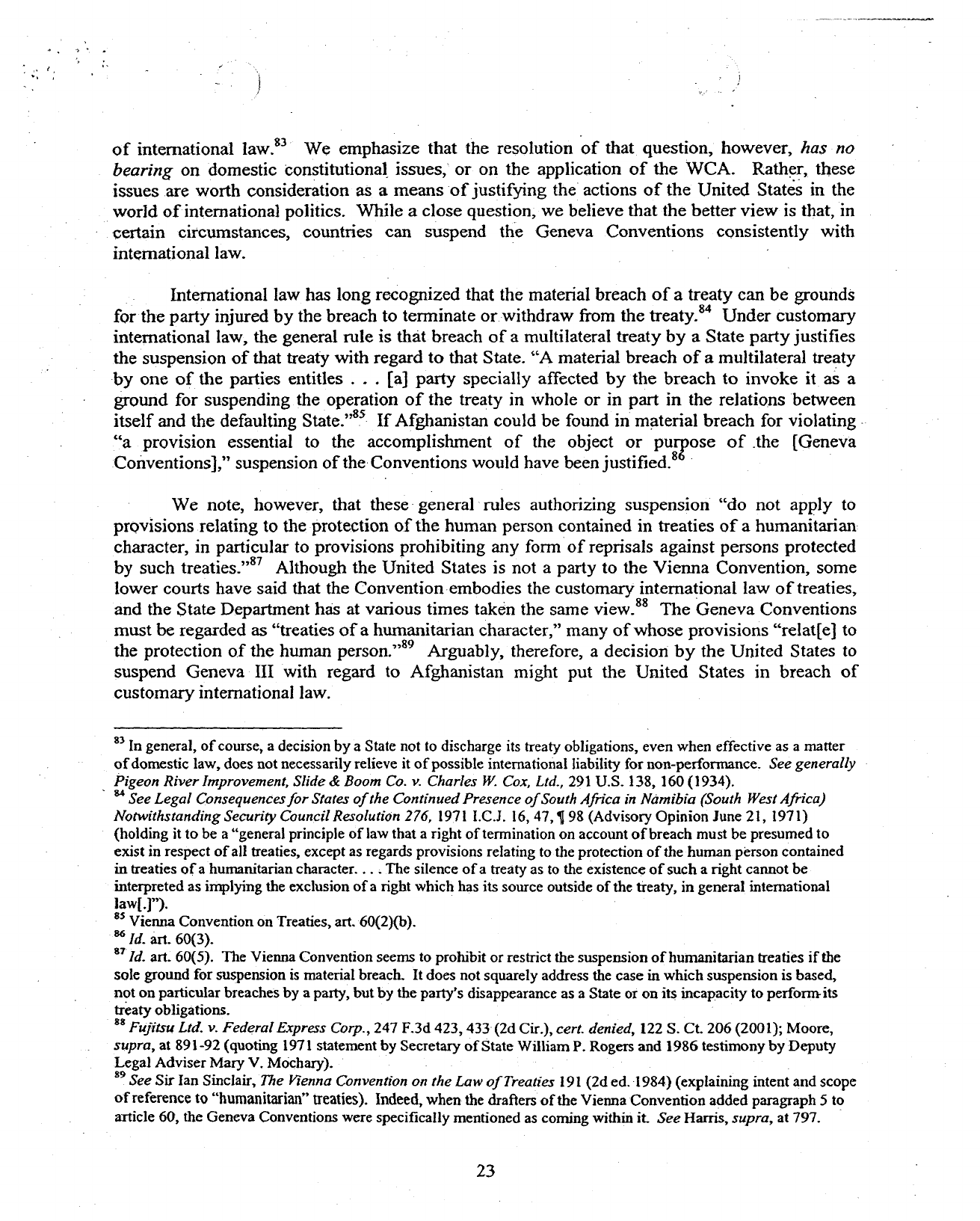
of international law.
83
We emphasize that the resolution of that question, however, has no
bearing on domestic constitutional issues, or on the application of the WCA. Rather, these
issues are worth consideration as a means of justifying the actions of the United States in the
world of international politics. While a close question, we believe that the better view is that, in
certain circumstances, countries can suspend the Geneva Conventions consistently with
international law.
International law has long recognized that the material breach of a treaty can be grounds
for the party injured by the breach to terminate or withdraw from the treaty.
84
Under customary
international law, the general rule is that breach of a multilateral treaty by a State party justifies
the suspension of that treaty with regard to that State. "A material breach of a multilateral treaty
by one of the parties entitles . , . [a] party specially affected by the breach to invoke it. as a
ground for suspending the operation of the treaty in whole or in part in the relations between
itself and the defaulting State."
85
If Afghanistan could be found in material breach for violating
"a provision essential to the accomplishment of the object or purpose of the [Geneva
Conventions],"
suspension of the Conventions would have been justified.
8
We note, however, that these general rules authorizing suspension "do not apply to
provisions relating to the protection of the human person contained in treaties of a humanitarian
character, in particular to provisions prohibiting any form of reprisals against persons protected
by such treaties."
87
Although the United States is not a party to the Vienna Convention, some
lower courts have said that the Convention embodies the customary international law of treaties,
DO
and the State Department has at various times taken the same view. The Geneva Conventions
must be regarded as "treaties of a humanitarian character," many of whose provisions "relate] to
the protection of the human person." Arguably, therefore, a decision by the United States to
suspend Geneva III with regard to Afghanistan might put the United States in breach of
customary international law.
83
In general, of course, a decision by a State not to discharge its treaty obligations, even when effective as a matter
of domestic law, does not necessarily relieve it of possible international liability for non-performance. See generally
Pigeon River Improvement, Slide & Boom Co, v. Charles W. Cox, Ltd., 291 U.S. 138, 160 (1934).
84
See Legal Consequences for States of the Continued Presence of South Africa in Namibia (South West Africa)
Notwithstanding Security Council Resolution 276, 1971 I.C.J. 16, 47, 98 (Advisory Opinion June
21,
1971)
(holding it to be a "general principle of law that a right of termination on account of breach must be presumed to
exist in respect of all treaties, except as regards provisions relating to the protection of the human person contained
in treaties of a humanitarian character.... The silence of a treaty as to the existence of such a right cannot be
interpreted as implying the exclusion of a right which has its source outside of the treaty, in general international
law.")-
Vienna Convention on Treaties, art. 60(2)(b).
86
Id. art. 60(3).
87
Id. art. 60(5). The Vienna Convention seems to prohibit or restrict the suspension of humanitarian treaties if the
sole ground for suspension is material breach. It does not squarely address the case in which suspension is based,
not on particular breaches by a party, but by the party's disappearance as a State or on its incapacity to perform-its
treaty obligations.
88
Fujitsu Ltd. v. Federal Express Corp., 247 F.3d 423, 433 (2d Cir.), cert,
denied,
122 S. Ct 206 (2001); Moore,
supra, at 891-92 (quoting 1971 statement by Secretary of State William P. Rogers and 1986 testimony by Deputy
Legal Adviser Mary V. Mochary).
See Sir Ian Sinclair, The Vienna Convention on the Law of Treaties 191 (2d ed. 1984) (explaining intent and scope
of reference to "humanitarian treaties). Indeed, when the drafters of the Vienna Convention added paragraph 5 to
article 60, the Geneva Conventions were specifically mentioned as coming within it See Harris, supra, at 797.
23
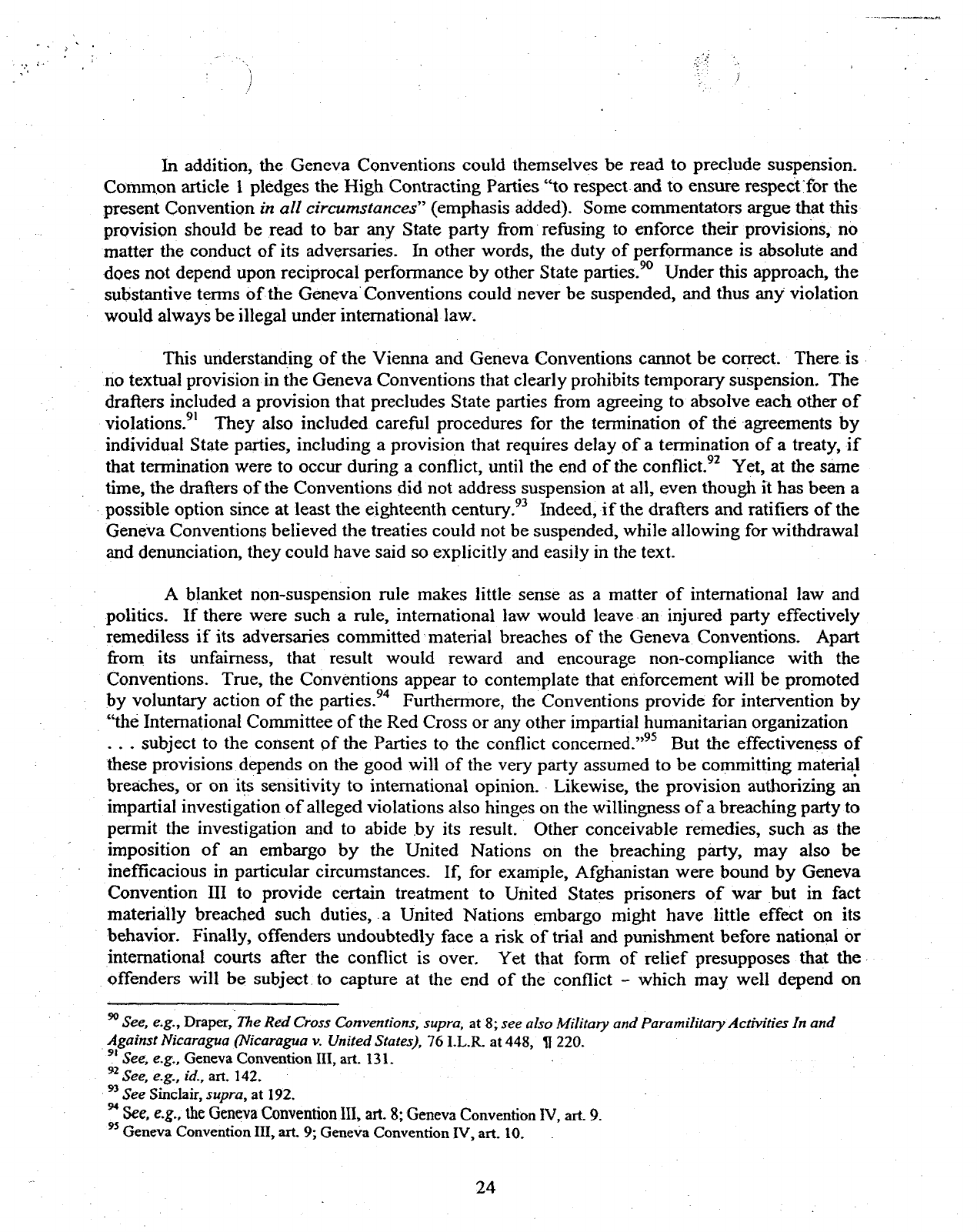
In addition, the Geneva Conventions could themselves be read to preclude suspension.
Common article 1 pledges the High Contracting Parties "to respect and to ensure respect for the
present Convention in all circumstances" (emphasis added). Some commentators argue that this
provision should be read to bar any State party from refusing to enforce their provisions, no
matter the conduct of its adversaries. In other words, the duty of performance is absolute and
does not depend upon reciprocal performance by other State parties.
90
Under this approach, the
substantive terms of the Geneva Conventions could never be suspended, and thus any violation
would always be illegal under international law.
This understanding of the Vienna and Geneva Conventions cannot be correct. There is
no textual provision in the Geneva Conventions that clearly prohibits temporary suspension. The
drafters included a provision that precludes State parties from agreeing to absolve each other of
violations.
91
They also included careful procedures for the termination of the agreements by
individual State parties, including a provision that requires delay of a termination of a treaty, if
that termination were to occur during a conflict, until the end of the conflict.
92
Yet, at the same
time,
the drafters of the Conventions did not address suspension at all, even though it has been a
possible option since at least the eighteenth century.
93
Indeed, if the drafters and ratifiers of the
Geneva Conventions believed the treaties could not be suspended, while allowing for withdrawal
and denunciation, they could have said so explicitly and easily in the text.
A blanket non-suspension rule makes little sense as a matter of international law and
politics. If there were such a rule, international law would leave an injured party effectively
remediless if its adversaries committed material breaches of the Geneva Conventions. Apart
from its unfairness, that result would reward and encourage non-compliance with the
Conventions. True, the Conventions appear to contemplate that enforcement will be promoted
by voluntary action of the parties.
94
Furthermore, the Conventions provide for intervention by
"the International Committee of the Red Cross or any other impartial humanitarian organization
. . . subject to the consent of the Parties to the conflict concerned."
95
But the effectiveness of
these provisions depends on the good will of the very party assumed to be committing material
breaches, or on its sensitivity to international opinion. Likewise, the provision authorizing an
impartial investigation of alleged violations also hinges on the willingness of a breaching party to
permit the investigation and to abide by its result. Other conceivable remedies, such as the
imposition of an embargo by the United Nations on the breaching party, may also be
inefficacious in particular circumstances. If, for example, Afghanistan were bound by Geneva
Convention III to provide certain treatment to United States prisoners of war but in fact
materially breached such duties, a United Nations embargo might have little effect on its
behavior. Finally, offenders undoubtedly face a risk of trial and punishment before national or
international courts after the conflict is over. Yet that form of relief presupposes that the
offenders will be subject to capture at the end of the conflict - which may well depend on
See, e.g., Draper, The Red Cross Conventions, supra, at 8; see also Military and Paramilitary Activities In and
Against Nicaragua (Nicaragua v. United States), 76 I.L.R. at 448, 220.
91
See, e.g., Geneva Convention III, art. 131.
92
See, e.g., id., art. 142.
93
See Sinclair, supra, at 192.
94
See, e.g., the Geneva Convention
III,
art. 8; Geneva Convention IV, art. 9.
95
Geneva Convention III, art 9; Geneva Convention IV, art. 10.
24
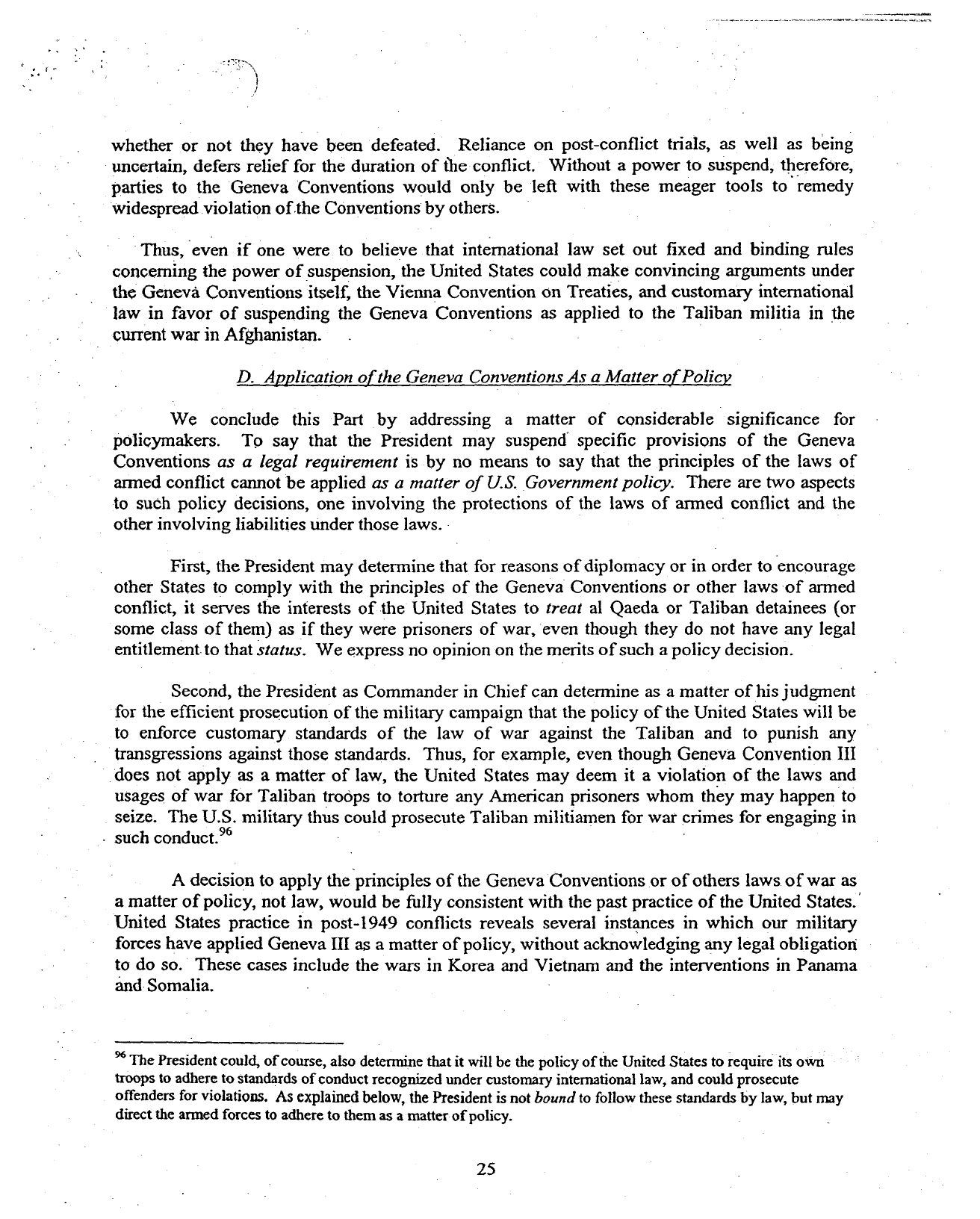
whether or not they have been defeated. Reliance on post-conflict trials, as well as being
uncertain, defers relief for the duration of the conflict. Without a power to suspend, therefore,
parties to the Geneva Conventions would only be left with these meager tools to remedy
widespread violation of the Conventions by others.
Thus,
even if one were to believe that international law set out fixed and binding rules
concerning the power of suspension, the United States could make convincing arguments under
the Geneva Conventions
itself,
the Vienna Convention on Treaties, and customary international
law in favor of suspending the Geneva Conventions as applied to the Taliban militia in the
current war in Afghanistan.
D.
Application of the Geneva Conventions As a Matter of Policy
We conclude this Part by addressing a matter of considerable significance for
policymakers. To say that the President may suspend specific provisions of the Geneva
Conventions as a legal requirement is by no means to say that the principles of the laws of
armed conflict cannot be applied as a matter of U.S. Government policy. There are two aspects
to such policy decisions, one involving the protections of the laws of armed conflict and the
other involving liabilities under those laws.
First, the President may determine that for reasons of diplomacy or in order to encourage
other States to comply with the principles of the Geneva Conventions or other laws of armed
conflict, it serves the interests of the United States to treat al Qaeda or Taliban detainees (or
some class of them) as if they were prisoners of war, even though they do not have any legal
entitlement to that status. We express no opinion on the merits of such a policy decision.
Second, the President as Commander in Chief can determine as a matter of his judgment
for the efficient prosecution of the military campaign that the policy of the United States will be
to enforce customary standards of the law of war against the Taliban and to punish any
transgressions against those standards. Thus, for example, even though Geneva Convention III
does not apply as a matter of law, the United States may deem it a violation of the laws and
usages of war for Taliban troops to torture any American prisoners whom they may happen to
seize. The U.S. military thus could prosecute Taliban militiamen for war crimes for engaging in
such conduct.
96
A decision to apply the principles of the Geneva Conventions or of others laws of war as
a matter of policy, not law, would be fully consistent with the past practice of the United States.
United States practice in post-1949 conflicts reveals several instances in which our military
forces have applied Geneva III as a matter of policy, without acknowledging any legal obligation
to do so. These cases include the wars in Korea and Vietnam and the interventions in Panama
and Somalia.
The President could, of course, also determine that it will be the policy of the United States to require its own
troops to adhere to standards of conduct recognized under customary international law, and could prosecute
offenders for violations. As explained below, the President is not bound to follow these standards by law, but may
direct the armed forces to adhere to them as a matter of policy.
25
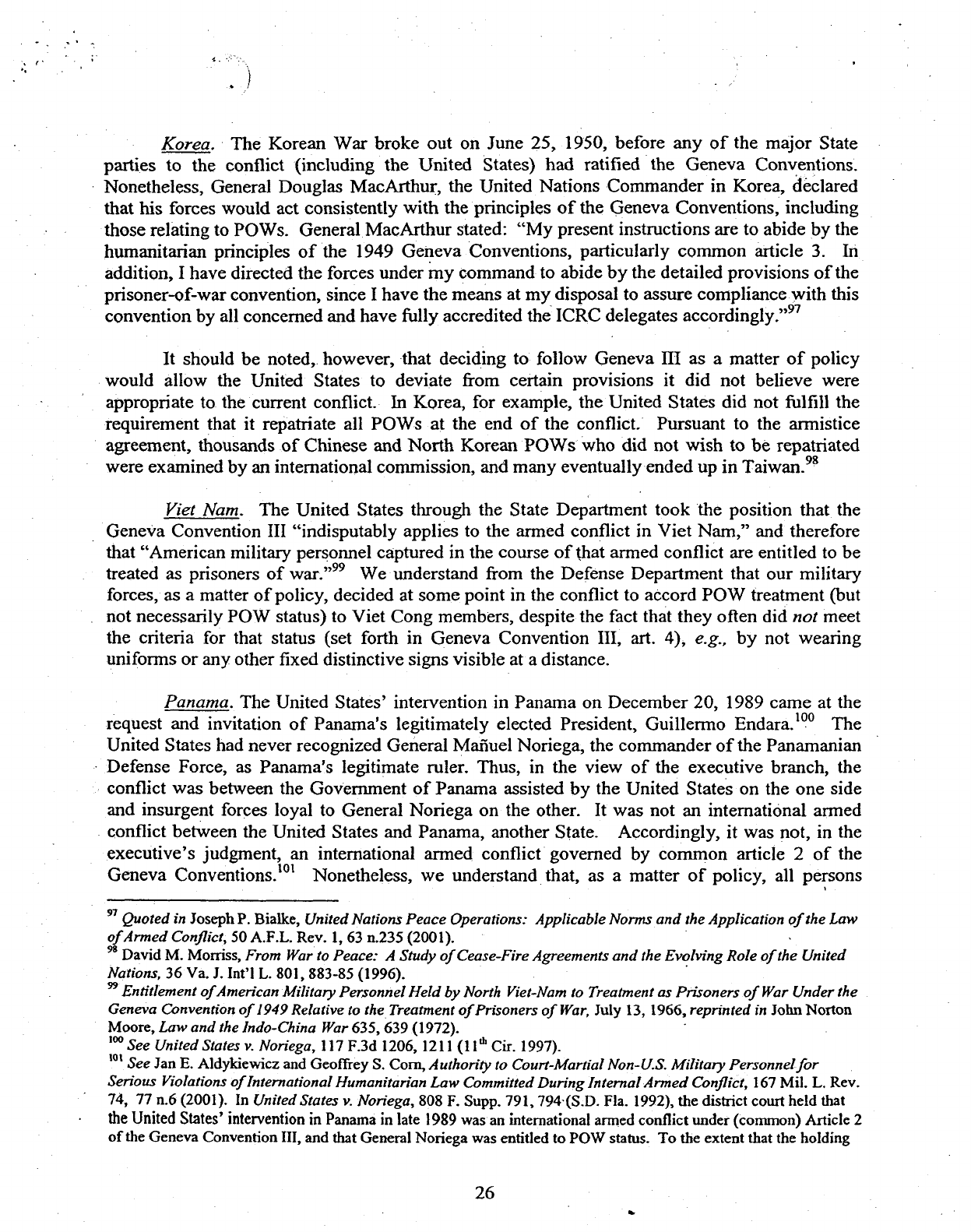
Korea. The Korean War broke out on June 25, 1950, before any of the major State
parties to the conflict (including the United States) had ratified the Geneva Conventions.
Nonetheless, General Douglas MacArthur, the United Nations Commander in Korea, declared
that his forces would act consistently with the principles of the Geneva Conventions, including
those relating to POWs. General MacArthur stated: "My present instructions are to abide by the
humanitarian principles of the 1949 Geneva Conventions, particularly common article 3. In
addition, I have directed the forces under my command to abide by the detailed provisions of the
prisoner-of-war convention, since I have the means at my disposal to assure compliance with this
convention by all concerned and have fully accredited the ICRC delegates accordingly."
97
It should be noted, however, that deciding to follow Geneva III as a matter of policy
would allow the United States to deviate from certain provisions it did not believe were
appropriate to the current conflict. In Korea, for example, the United States did not fulfill the
requirement that it repatriate all POWs at the end of the conflict. Pursuant to the armistice
agreement, thousands of Chinese and North Korean POWs who did not wish to be repatriated
98
were examined by an international commission, and many eventually ended up in Taiwan.
Viet Nam. The United States through the State Department took the position that the
Geneva Convention III "indisputably applies to the armed conflict in Viet Nam," and therefore
that "American military personnel captured in the course of that armed conflict are entitled to be
treated as prisoners of war."
99
We understand from the Defense Department that our military
forces, as a matter of policy, decided at some point in the conflict to accord POW treatment (but
not necessarily POW status) to Viet Cong members, despite the fact that they often did not meet
the criteria for that status (set forth in Geneva Convention III, art. 4), e.g., by not wearing
uniforms or any other fixed distinctive signs visible at a distance.
Panama. The United States' intervention in Panama on December 20, 1989 came at the
request and invitation of Panama's legitimately elected President, Guillermo Endara.
100
The
United States had never recognized General Manuel Noriega, the commander of the Panamanian
Defense Force, as Panama's legitimate ruler. Thus, in the view of the executive branch, the
conflict was between the Government of Panama assisted by the United States on the one side
and insurgent forces loyal to General Noriega on the other. It was not an international armed
conflict between the United States and Panama, another State. Accordingly, it was not, in the
executive's judgment, an international armed conflict governed by common article 2 of the
Geneva Conventions.
101
Nonetheless, we understand that, as a matter of policy, all persons
97
Quoted in Joseph
P.
Bialke, United Nations Peace Operations: Applicable Norms and the Application of the Law
of Armed Conflict, 50 A.F.L. Rev. 1, 63 n.235 (2001).
David M. Morriss, From War to Peace: A Study of Cease-Fire Agreements and the Evolving Role of the United
Nations, 36 Va. J. Int'l L. 801, 883-85 (1996).
Entitlement of American Military Personnel Held by North Viet-Nam to Treatment as Prisoners of
War
Under the
Geneva Convention of 1949 Relative to the Treatment of Prisoners of War, July 13, 1966, reprinted in John Norton
Moore, Law and the Indo-China War 635, 639 (1972).
100
See United States v. Noriega, 117 F.3d 1206, 1211
(11*
Cir. 1997).
101
See Jan E. Aldykiewicz and Geoffrey S. Com, Authority to Court-Martial Non-U.S. Military Personnel for
Serious Violations of International Humanitarian Law Committed During Internal Armed Conflict, 167 Mil. L. Rev.
74,
77 n.6 (2001). In United States v. Noriega, 808 F. Supp. 791,794 (S.D. Fla. 1992), the district court held that
the United States' intervention in Panama in late 1989 was an international armed conflict under (common) Article 2
of
the
Geneva Convention III, and that General Noriega was entitled to POW status. To the extent that the holding
26
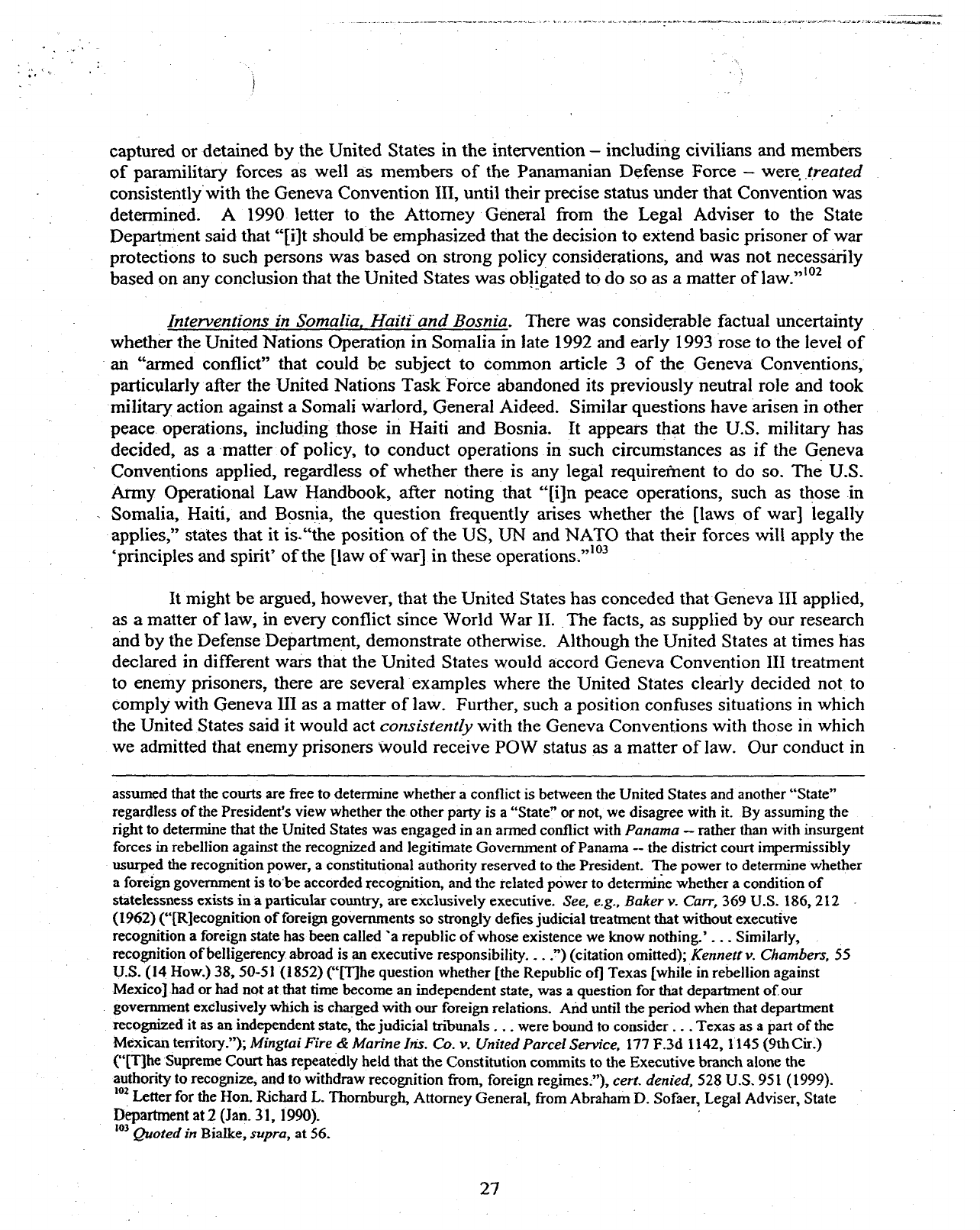
captured or detained by the United States in the intervention
—
including civilians and members
of paramilitary forces as well as members of the Panamanian Defense Force - were treated
consistently with the Geneva Convention III, until their precise status under that Convention was
determined. A 1990 letter to the Attorney General from the Legal Adviser to the State
Department said that "[i]t should be emphasized that the decision to extend basic prisoner of war
protections to such persons was based on strong policy considerations, and was not necessarily
based on any conclusion that the United States was obligated to do so as a matter of law."
102
Interventions in Somalia, Haiti and Bosnia, There was considerable factual uncertainty
whether the United Nations Operation in Somalia in late 1992 and early 1993 rose to the level of
an "armed conflict" that could be subject to common article 3 of the Geneva Conventions,
particularly after the United Nations Task Force abandoned its previously neutral role and took
military action against a Somali warlord, General Aideed. Similar questions have arisen in other
peace operations, including those in Haiti and Bosnia. It appears that the U.S. military has
decided, as a matter of policy, to conduct operations in such circumstances as if the Geneva
Conventions applied, regardless of whether there is any legal requirement to do so. The U.S.
Army Operational Law Handbook, after noting that "[i]n peace operations, such as those in
Somalia, Haiti, and Bosnia, the question frequently arises whether the [laws of war] legally
applies," states that it is-"the position of the US, UN and NATO that their forces will apply the
'principles and spirit' of the [law of war] in these operations."
103
It might be argued, however, that the United States has conceded that Geneva III applied,
as a matter of law, in every conflict since World War II. The facts, as supplied by our research
and by the Defense Department, demonstrate otherwise. Although the United States at times has
declared in different wars that the United States would accord Geneva Convention III treatment
to enemy prisoners, there are several examples where the United States clearly decided not to
comply with Geneva III as a matter of law. Further, such a position confuses situations in which
the United States said it would act consistently with the Geneva Conventions with those in which
we admitted that enemy prisoners would receive POW status as a matter of
law.
Our conduct in
assumed that the courts are free to determine whether a conflict is between the United States and another "State"
regardless of the President's view whether the other party is a "State" or not, we disagree with it. By assuming the
right to determine that the United States was engaged in an armed conflict with Panama
—
rather than with insurgent
forces in rebellion against the recognized and legitimate Government of Panama
—
the district court impermissibly
usurped the recognition power, a constitutional authority reserved to the President. The power to determine whether
a foreign government is to be accorded recognition, and the related power to determine whether a condition of
statelessness exists in a particular country, are exclusively executive. See, e.g.. Baker v. Carr, 369 U.S. 186,212
(1962) ("[R]ecognition of foreign governments so strongly defies judicial treatment that without executive
recognition a foreign state has been called 'a republic of whose existence we know nothing.'... Similarly,
recognition of belligerency abroad is an executive responsibility....") (citation omitted); Kennett
v.
Chambers, 55
U.S.
(14 How.) 38,50-51 (1852) ("[T]he question whether [the Republic of] Texas [while in rebellion against
Mexico] had or had not at that time become an independent state, was a question for that department of our
government exclusively which is charged with our foreign relations. And until the period when that department
recognized it as an independent state, the judicial tribunals ... were bound to consider... Texas as a part of the
Mexican territory."); Mingtai Fire & Marine Ins. Co. v. United Parcel Service, 177 F.3d 1142, 1145 (9th Cir.)
("[The Supreme Court has repeatedly held that the Constitution commits to the Executive branch alone the
authority to recognize, and to withdraw recognition from, foreign regimes"), cert,
denied,
528 U.S. 951 (1999).
Letter for the Hon. Richard L. Thomburgh, Attorney General, from Abraham D. Sofaer, Legal Adviser, State
Department at 2 (Jan. 31,1990).
103
Quoted in Bialke, supra, at 56.
27

Panama provides an important example. There, the United States never conceded that the forces
of Manuel Noriega qualified as POWs under the Geneva Convention, but did provide for them as
a policy matter as if they were POWs.
*
IV. Detention Conditions Under Geneva III
Even if the President decided not to suspend our Geneva III obligations toward Afghanistan,
two reasons would justify some deviations from the requirements of Geneva III. This would be
the case even if Taliban members legally were entitled to POW status. First, certain deviations
concerning treatment can be justified on basic grounds of legal excuse concerning self-defense
and feasibility. Second, the President could choose to find that none of the Taliban prisoners
qualify as POWs under article 4 of Geneva III, which generally defines the types of armed forces
that may be considered POWs once captured. In the latter instance, Geneva III would apply and
the Afghanistan conflict would fall within common article 2's jurisdiction. The President,
however, would be interpreting the treaty in light of the facts on the ground to find that the
Taliban militia categorically failed the test for POWs within Geneva Ill's terms. We should be
clear that we have no information that the conditions of treatment for Taliban prisoners currently
violate Geneva III standards, but it is possible that some may argue that our GTMO facilities do
not fully comply with all of the treaty's provisions.
A Justified Deviations from Geneva Convention Requirements
We should make clear that as we understand the facts, the detainees currently are being
treated in a manner consistent with common article 3 of Geneva III. This means that they are
housed in basic humane conditions, are not being physically mistreated, and are receiving
adequate medical care. They have not yet been tried or punished by any U.S. court system. As a
result, the current detention conditions in GTMO do not violate common article 3, nor do they
present a grave breach of Geneva III as defined in article 130. For purposes of domestic law,
therefore, the GTMO conditions do not constitute a violation of the WCA, which criminalizes
Only violations of common article 3 or grave breaches of the Conventions.
That said, some very well may argue that detention conditions currently depart from
Geneva III requirements. Nonetheless, not all of these deviations from Geneva III would amount
to an outright violation of the treaty's requirements. Instead, some departures from the text can
be justified by some basic doctrines of legal excuse. We believe that some deviations would not
amount to a treaty violation, because they would be justified by the need for force protection.
Nations have the right to take reasonable steps for the protection of the armed forces guarding
prisoners. At the national level, no treaty can override a nation's inherent right to self-defense.
Indeed, the United Nations Charter recognizes this fundamental principle. Article 51 of the U.N.
Charter provides that "[nothing in the present Charter shall impair the inherent right of
individual or collective self-defense if an armed attack occurs against a Member of the United
Nations." As we have discussed in other opinions relating to the war on terrorism, the
September 11 attacks on the Pentagon and the World Trade Center have triggered the United
States' right to defend
itself.
104
Our national right to self-defense must encompass the lesser
104
Memorandum for Alberto R. Gonzales, Counsel to the President, from Patrick
F.
Philbin, Deputy Attorney
General, Office of Legal Counsel, Re: Legality of the Use of Military Commissions to Try Terrorists at 22-33 (Nov.
28
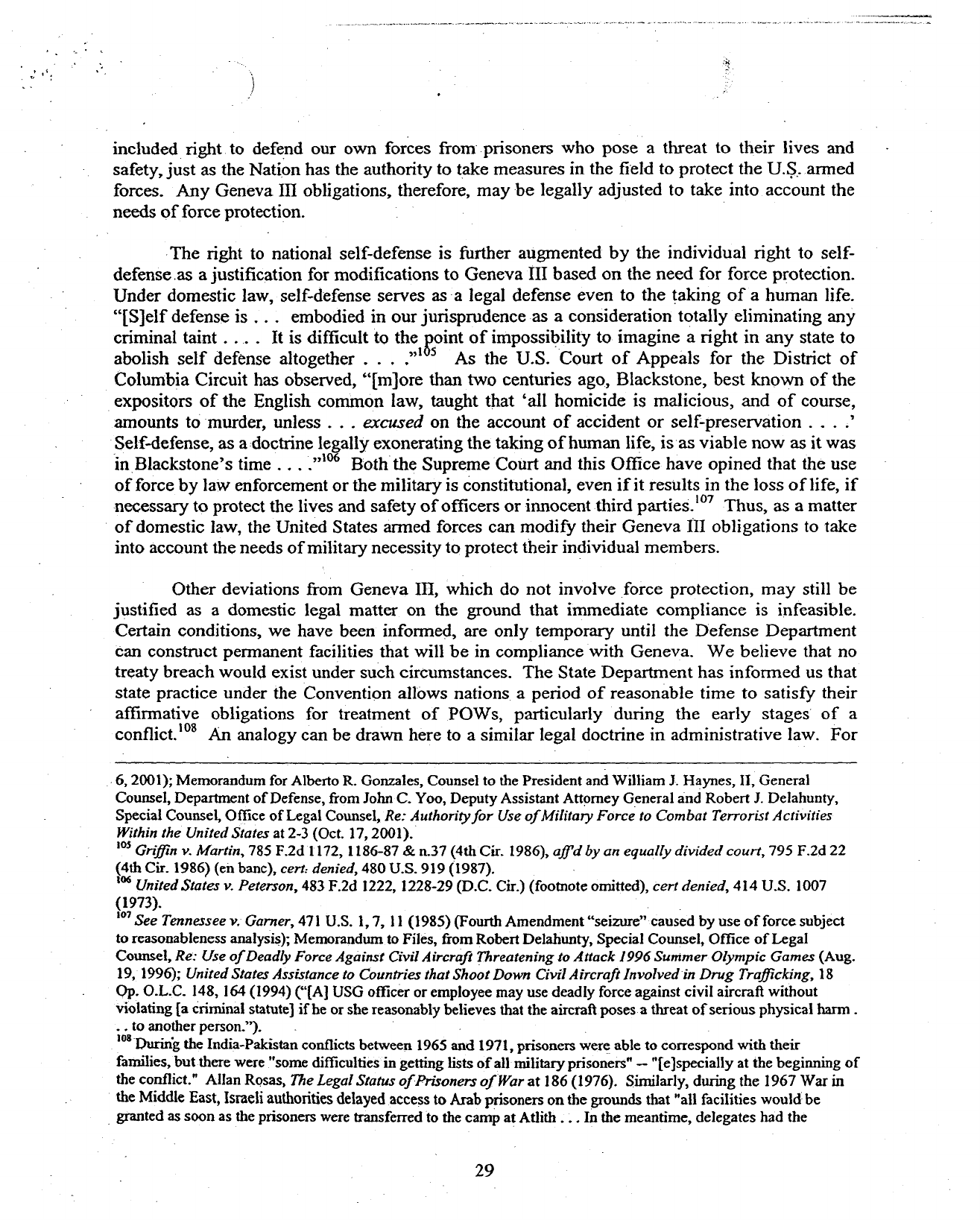
included right to defend our own forces from prisoners who pose a threat to their lives and
safety, just as the Nation has the authority to take measures in the field to protect the U.S. armed
forces. Any Geneva III obligations, therefore, may be legally adjusted to take into account the
needs of force protection.
The right to national self-defense is further augmented by the individual right to
self-
defense as a justification for modifications to Geneva III based on the need for force protection.
Under domestic law, self-defense serves as a legal defense even to the taking of a human life.
"[S]elf defense is . . . embodied in our jurisprudence as a consideration totally eliminating any
criminal taint.... It is difficult to the point of impossibility to imagine a right in any state to
abolish self defense altogether . . . .
5
As the U.S. Court of Appeals for the District of
Columbia Circuit has observed, "[more than two centuries ago, Blackstone, best known of the
expositors of the English common law, taught that 'all homicide is malicious, and of course,
amounts to murder, unless . . . excused on the account of accident or self-preservation . . . .'
Self-defense, as a doctrine legally exonerating the taking of human life, is as viable now as it was
in Blackstone's time . . . "
,06
Both the Supreme Court and this Office have opined that the use
of force by law enforcement or the military is constitutional, even if it results in the loss of
life,
if
necessary to protect the lives and safety of officers or innocent third parties.
107
Thus, as a matter
of domestic law, the United States armed forces can modify their Geneva III obligations to take
into account the needs of military necessity to protect their individual members.
Other deviations from Geneva III, which do not involve force protection, may still be
justified as a domestic legal matter on the ground that immediate compliance is infeasible.
Certain conditions, we have been informed, are only temporary until the Defense Department
can construct permanent facilities that will be in compliance with Geneva. We believe that no
treaty breach would exist under such circumstances. The State Department has informed us that
state practice under the Convention allows nations a period of reasonable time to satisfy their
affirmative obligations for treatment of POWs, particularly during the early stages of a
conflict.
1 8
An analogy can be drawn here to a similar legal doctrine in administrative law. For
6, 2001); Memorandum for Alberto R. Gonzales, Counsel to the President and William J. Haynes, II, General
Counsel, Department of Defense, from John C. Yoo, Deputy Assistant Attorney General and Robert J. Delahunty,
Special Counsel, Office of Legal Counsel, Re: Authority for
Use
of Military Force to Combat Terrorist Activities
Within
the United States at
2-3
(Oct. 17,2001).
105
Griffin
v. Martin, 785 F.2d 1172, 1186-87 & n.37 (4th Or. 1986), affd by an equally divided court, 795 F.2d 22
(4th
Cir.
1986) (en
banc),
cert:
denied,
480
U.S.
919 (1987).
106
United States
v.
Peterson,
483
F.2d 1222, 1228-29 (D.C. Cir.) (footnote omitted), cert
denied,
414 U.S. 1007
(1973).
107
See
Tennessee
v.
Garner,
471
U.S. 1,7, 11 (1985) (Fourth Amendment "seizure" caused by use of force subject
to reasonableness analysis); Memorandum to Files, from Robert Delahunty, Special Counsel, Office of Legal
Counsel, Re:
Use
of
Deadly
Force Against Civil Aircraft
Threatening
to Attack 1996 Summer Olympic Games (Aug.
19,
1996); United
States Assistance
to
Countries
that Shoot Down Civil Aircraft Involved
in
Drug Trafficking, 18
Op.
O.L.C. 148, 164 (1994) ("[A] USG officer or employee may use deadly force against civil aircraft without
violating [a criminal statute] if he or she reasonably believes that the aircraft poses a threat of serious physical harm .
.. to another person.").
During the India-Pakistan conflicts between 1965 and
1971,
prisoners were able to correspond with their
families, but there were "some difficulties in getting lists of all military prisoners"
—
"especially at the beginning of
the conflict." Allan Rosas,
The Legal Status
of
Prisoners
of
War
at 186(1976). Similarly, during the 1967 War in
the Middle East, Israeli authorities delayed access to Arab prisoners on the grounds that "all facilities would be
granted as soon as the prisoners were transferred to the camp at Atlith ... In the meantime, delegates had the
29
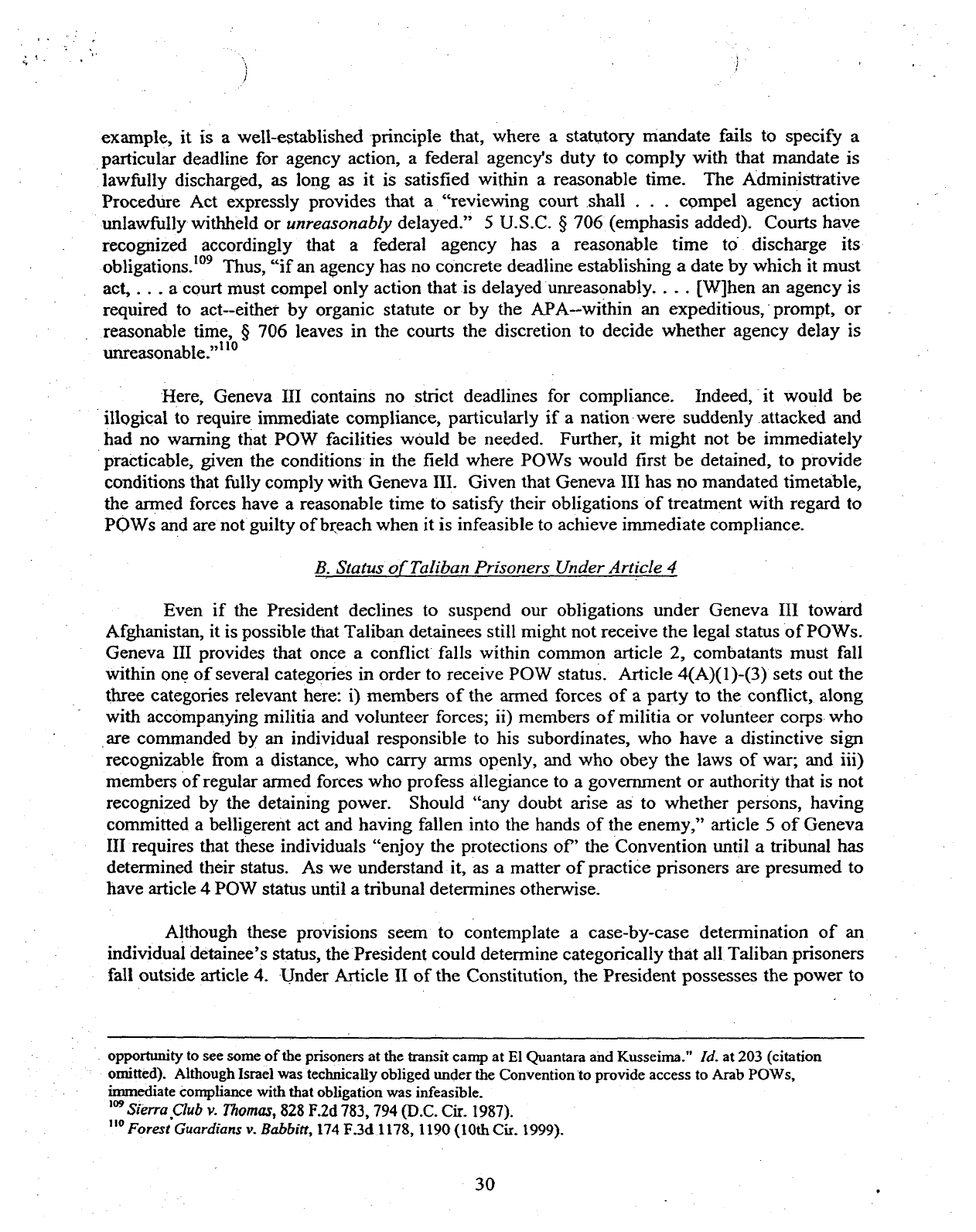
example, it is a well-established principle that, where a statutory mandate fails to specify a
particular deadline for agency action, a federal agency's duty to comply with that mandate is
lawfully discharged, as long as it is satisfied within a reasonable time. The Administrative
Procedure Act expressly provides that a "reviewing court shall . . . compel agency action
unlawfully withheld or unreasonably delayed." 5 U.S.C. § 706 (emphasis added). Courts have
recognized accordingly that a federal agency has a reasonable time to discharge its
obligations.
109
Thus, "if an agency has no concrete deadline establishing a date by which it must
act,. . . a court must compel only action that is delayed unreasonably. . . . [W]hen an agency is
required to act—either by organic statute or by the APA—within an expeditious, prompt, or
reasonable time, § 706 leaves in the courts the discretion to decide whether agency delay is
unreasonable."
110
Here, Geneva III contains no strict deadlines for compliance. Indeed, it would be
illogical to require immediate compliance, particularly if a nation were suddenly attacked and
had no warning that POW facilities would be needed. Further, it might not be immediately
practicable, given the conditions in the field where POWs would first be detained, to provide
conditions that fully comply with Geneva III. Given that Geneva III has no mandated timetable,
the armed forces have a reasonable time to satisfy their obligations of treatment with regard to
POWs and are not guilty of breach when it is infeasible to achieve immediate compliance.
B.
Status of Taliban Prisoners Under Article 4
Even if the President declines to suspend our obligations under Geneva III toward
Afghanistan, it is possible that Taliban detainees still might not receive the legal status of POWs.
Geneva III provides that once a conflict falls within common article 2, combatants must fall
within one of several categories in order to receive POW status. Article 4(A)(l)-(3) sets out the
three categories relevant here: i) members of the armed forces of a party to the conflict, along
with accompanying militia and volunteer forces; ii) members of militia or volunteer corps who
are commanded by an individual responsible to his subordinates, who have a distinctive sign
recognizable from a distance, who carry arms openly, and who obey the laws of war; and iii)
members of regular armed forces who profess allegiance to a government or authority that is not
recognized by the detaining power. Should "any doubt arise as to whether persons, having
committed a belligerent act and having fallen into the hands of the enemy," article 5 of Geneva
III requires that these individuals "enjoy the protections of the Convention until a tribunal has
determined their status. As we understand it, as a matter of practice prisoners are presumed to
have article 4 POW status until a tribunal determines otherwise.
Although these provisions seem to contemplate a case-by-case determination of an
individual detainee's status, the President could determine categorically that all Taliban prisoners
fall outside article 4. Under Article II of the Constitution, the President possesses the power to
opportunity to see some of the prisoners at the transit camp at El Quantara and Kusseima." Id. at 203 (citation
omitted). Although Israel was technically obliged under the Convention to provide access to Arab POWs,
immediate compliance with that obligation was infeasible.
109
Sierra Club
v.
Thomas,
828 F.2d 783,794 (D.C. Cir. 1987).
110
Forest Guardians v. Babbitt, 174 F.3d 1178, 1190 (10th Cir. 1999).
30
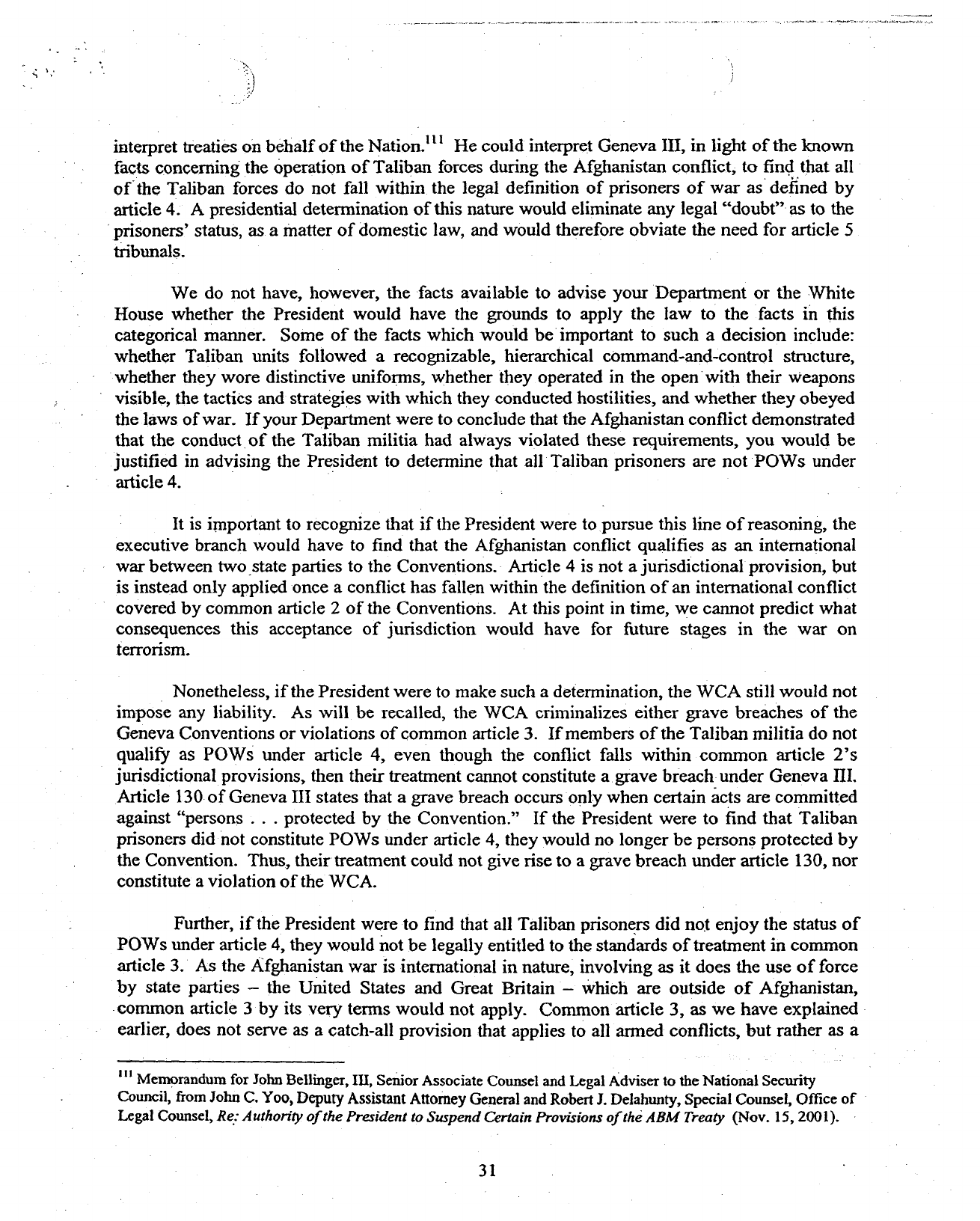
interpret treaties on behalf of the Nation.
111
He could interpret Geneva III, in light of the known
facts concerning the operation of Taliban forces during the Afghanistan conflict, to find that all
of the Taliban forces do not fall within the legal definition of prisoners of war as defined by
article 4. A presidential determination of this nature would eliminate any legal "doubt" as to the
prisoners' status, as a matter of domestic law, and would therefore obviate the need for article 5
tribunals.
We do not have, however, the facts available to advise your Department or the White
House whether the President would have the grounds to apply the law to the facts in this
categorical manner. Some of the facts which would be important to such a decision include:
whether Taliban units followed a recognizable, hierarchical command-and-control structure,
whether they wore distinctive uniforms, whether they operated in the open with their weapons
visible, the tactics and strategies with which they conducted hostilities, and whether they obeyed
the laws of war. If your Department were to conclude that the Afghanistan conflict demonstrated
that the conduct of the Taliban militia had always violated these requirements, you would be
justified in advising the President to determine that all Taliban prisoners are not POWs under
article 4.
It is important to recognize that if the President were to pursue this line of reasoning, the
executive branch would have to find that the Afghanistan conflict qualifies as an international
war between two state parties to the Conventions. Article 4 is not a jurisdictional provision, but
is instead only applied once a conflict has fallen within the definition of an international conflict
covered by common article 2 of the Conventions. At this point in time, we cannot predict what
consequences this acceptance of jurisdiction would have for future stages in the war on
terrorism.
Nonetheless, if the President were to make such a determination, the WCA still would not
impose any liability. As will be recalled, the WCA criminalizes either grave breaches of the
Geneva Conventions or violations of common article 3. If members of the Taliban militia do not
qualify as POWs under article 4, even though the conflict falls within common article 2's
jurisdictional provisions, then their treatment cannot constitute a grave breach under Geneva HI.
Article 130 of Geneva III states that a grave breach occurs only when certain acts are committed
against "persons . . . protected by the Convention." If the President were to find that Taliban
prisoners did not constitute POWs under article 4, they would no longer be persons protected by
the Convention. Thus, their treatment could not give rise to a grave breach under article 130, nor
constitute a violation of the WCA.
Further, if the President were to find that all Taliban prisoners did not enjoy the status of
POWs under article 4, they would not be legally entitled to the standards of treatment in common
article 3. As the Afghanistan war is international in nature, involving as it does the use of force
by state parties - the United States and Great Britain - which are outside of Afghanistan,
common article 3 by its very terms would not apply. Common article 3, as we have explained
earlier, does not serve as a catch-all provision that applies to all armed conflicts, but rather as a
111
Memorandum for John Bellinger, III, Senior Associate Counsel and Legal Adviser to the National Security
Council, from John C Yoo, Deputy Assistant Attorney General and Robert
J.
Delahunty, Special Counsel, Office of
Legal Counsel, Re: Authority of the
President
to Suspend
Certain Provisions
of the ABM
Treaty
(Nov. 15, 2001).
31
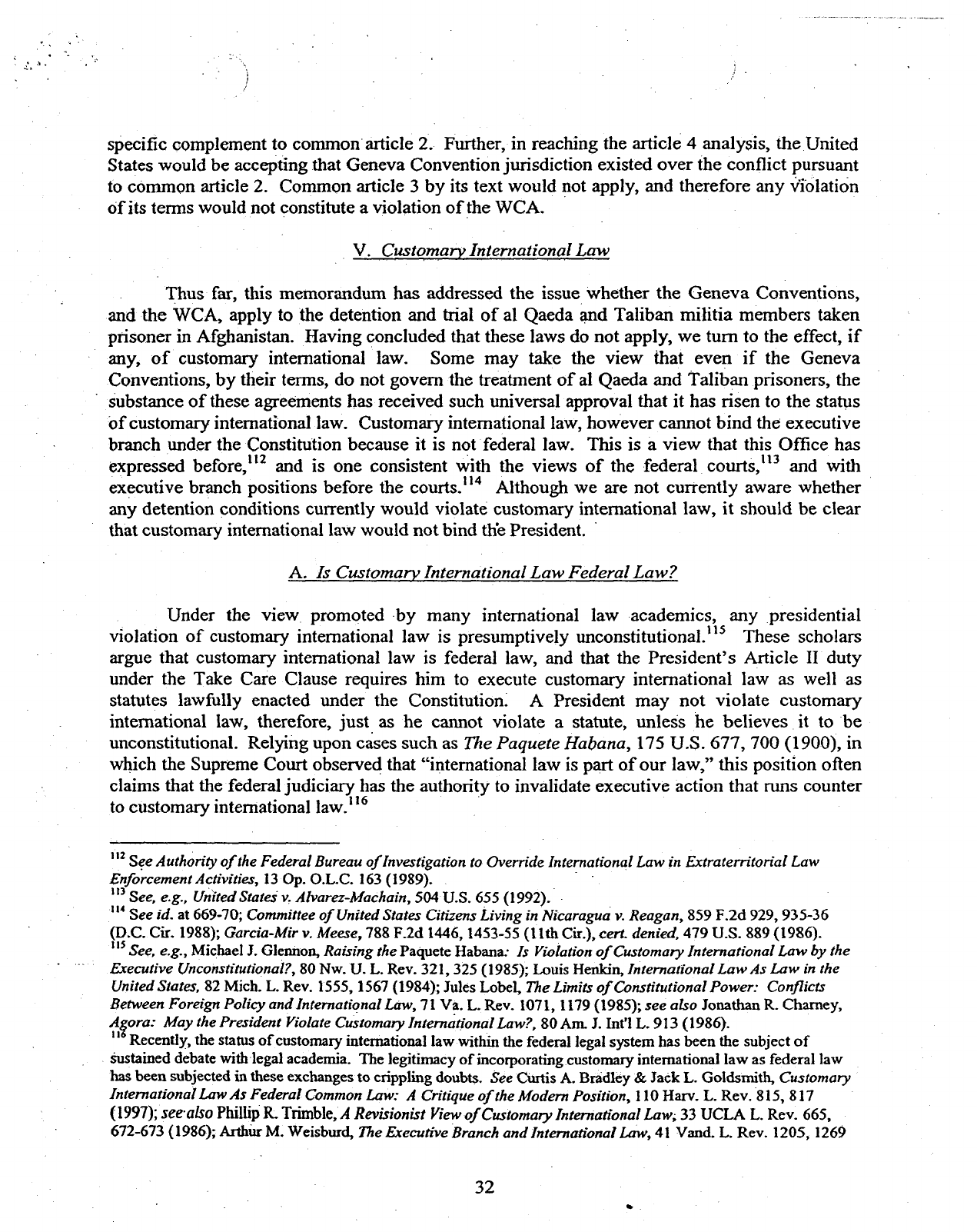
specific complement to common article 2. Further, in reaching the article 4 analysis, the United
States would be accepting that Geneva Convention jurisdiction existed over the conflict pursuant
to common article 2. Common article 3 by its text would not apply, and therefore any violation
of its terms would not constitute a violation of the WCA.
V. Customary International Law
Thus far, this memorandum has addressed the issue whether the Geneva Conventions,
and the WCA, apply to the detention and trial of al Qaeda and Taliban militia members taken
prisoner in Afghanistan. Having concluded that these laws do not apply, we turn to the effect, if
any, of customary international law. Some may take the view that even if the Geneva
Conventions, by their terms, do not govern the treatment of al Qaeda and Taliban prisoners, the
substance of these agreements has received such universal approval that it has risen to the status
of customary international law. Customary international law, however cannot bind the executive
branch under the Constitution because it is not federal law. This is a view that this Office has
expressed before,
112
and is one consistent with the views of the federal courts,
113
and with
executive branch positions before the courts.
114
Although we are not currently aware whether
any detention conditions currently would violate customary international law, it should be clear
that customary international law would not bind the President.
A. Is Customary International Law Federal Law?
Under the view promoted by many international law academics, any presidential
violation of customary international law is presumptively unconstitutional.
115
These scholars
argue that customary international law is federal law, and that the President's Article II duty
under the Take Care Clause requires him to execute customary international law as well as
statutes lawfully enacted under the Constitution. A President may not violate customary
international law, therefore, just as he cannot violate a statute, unless he believes it to be
unconstitutional. Relying upon cases such as The Paquete Habana, 175 U.S. 677, 700 (1900), in
which the Supreme Court observed that "international law is part of our law," this position often
claims that the federal judiciary has the authority to invalidate executive action that runs counter
to customary international law.
116
112
See Authority of the Federal Bureau of Investigation to Override International Law in Extraterritorial Law
Enforcement Activities, 13 Op. O.L.C. 163 (1989).
113
See, e.g., United States v. Alvarez-Machain, 504 U.S. 655 (1992).
1M
See id. at 669-70; Committee of United States Citizens Living in Nicaragua v. Reagan, 859 F.2d 929, 935-36
(D.C.
Cir. 1988); Garcia-Mir v. Meese, 788 F.2d 1446,1453-55 (11th Cir.), cert,
denied,
479 U.S. 889 (1986).
" See, e.g., Michael J. Glennon, Raising the Paquete Habana: Is Violation of Customary International Law by the
Executive Unconstitutional?, 80 Nw. U. L. Rev. 321,325 (1985); Louis Henkin, International Law As Law in the
United States, 82 Mich. L. Rev. 1555,1567 (1984); Jules Lobel The Limits of Constitutional Power: Conflicts
Between Foreign Policy and International Law, 71 Va. L. Rev. 1071,1179
(1985);
see also Jonathan R. Charney,
Agora: May the President Violate Customary International Law?, 80 Am J. Int'l L. 913 (1986).
Recently, the status of customary international law within the federal legal system has been the subject of
sustained debate with legal academia. The legitimacy of incorporating customary international law as federal law
has been subjected in these exchanges to crippling doubts. See Curtis A. Bradley & Jack L. Goldsmith, Customary
International Law As Federal Common Law: A Critique of the Modern Position, 110 Harv. L. Rev. 815,817
(1997);
see also Phillip R. Trimble, A Revisionist View of Customary International Law; 33 UCLA L. Rev. 665,
672-673 (1986); Arthur M. Weisburd, The Executive Branch and International Law, 41 Vand. L. Rev. 1205, 1269
32
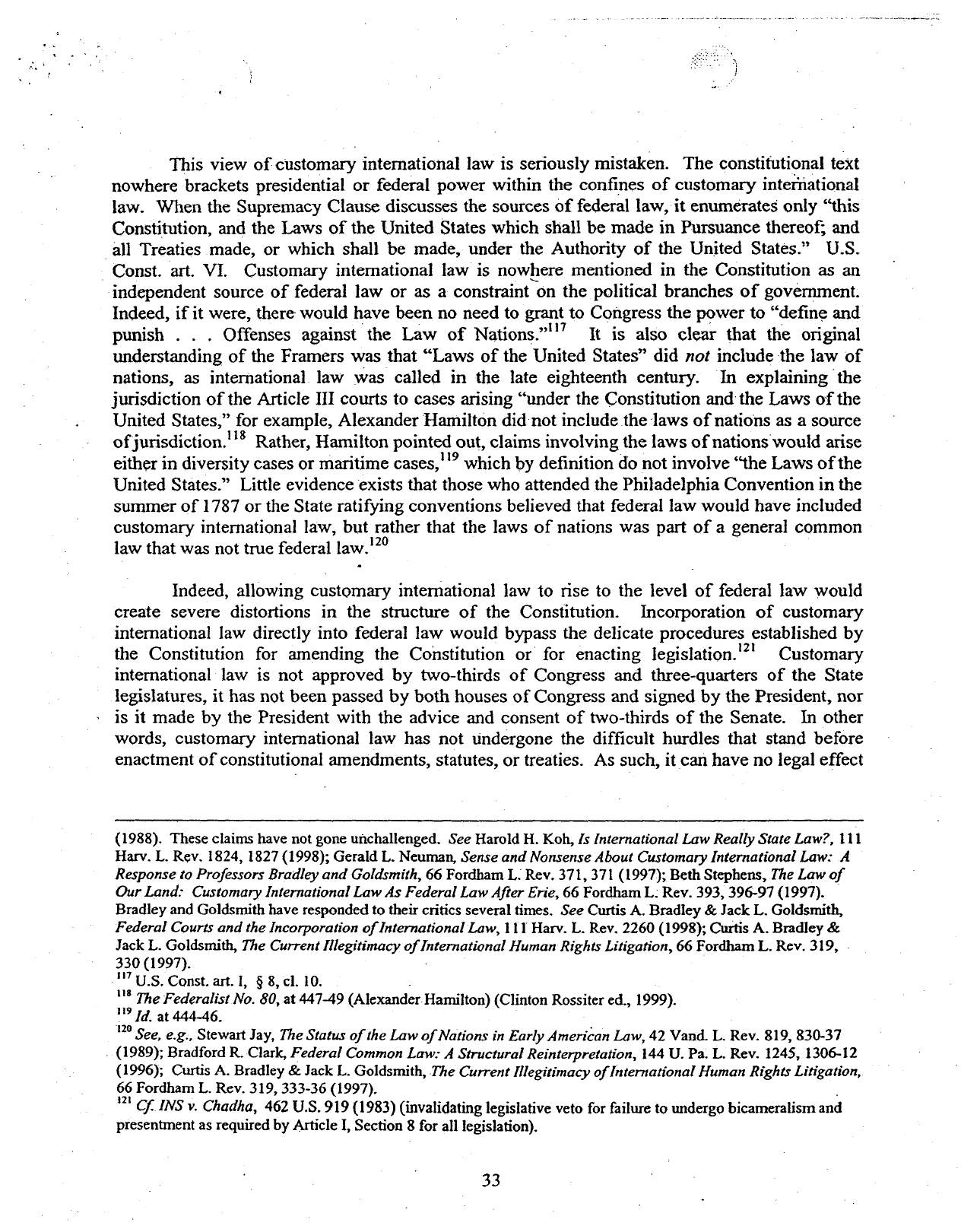
This view of customary international law is seriously mistaken. The constitutional text
nowhere brackets presidential or federal power within the confines of customary international
law. When the Supremacy Clause discusses the sources of federal law, it enumerates only "this
Constitution, and the Laws of the United States which shall be made in Pursuance
thereof;
and
all Treaties made, or which shall be made, under the Authority of the United States." U.S.
Const, art. VI. Customary international law is nowhere mentioned in the Constitution as an
independent source of federal law or as a constraint on the political branches of government.
Indeed, if
it
were, there would have been no need to grant to Congress the power to "define and
punish . . . Offenses against the Law of Nations."
117
It is also clear that the original
understanding of the Framers was that "Laws of the United States" did not include the law of
nations, as international law was called in the late eighteenth century. In explaining the
jurisdiction of
the
Article III courts to cases arising "under the Constitution and the Laws of the
United States," for example, Alexander Hamilton did not include the laws of nations as a source
118
of jurisdiction. Rather, Hamilton pointed out, claims involving the laws of nations would arise
either in diversity cases or maritime cases,
119
which by definition do not involve "the Laws of the
United States." Little evidence exists that those who attended the Philadelphia Convention in the
summer of 1787 or the State ratifying conventions believed that federal law would have included
customary international law, but rather that the laws of nations was part of a general common
law that was not true federal law.
120
Indeed, allowing customary international law to rise to the level of federal law would
create severe distortions in the structure of the Constitution. Incorporation of customary
international law directly into federal law would bypass the delicate procedures established by
the Constitution for amending the Constitution or for enacting legislation.
121
Customary
international law is not approved by two-thirds of Congress and three-quarters of the State
legislatures, it has not been passed by both houses of Congress and signed by the President, nor
is it made by the President with the advice and consent of two-thirds of the Senate. In other
words, customary international law has not undergone the difficult hurdles that stand before
enactment of constitutional amendments, statutes, or treaties. As such, it can have no legal effect
(1988).
These claims have not gone unchallenged. See Harold H. Koh, Is International Law Really State Law?, Ill
Harv. L. Rev. 1824, 1827 (1998); Gerald L. Neuman, Sense and Nonsense About Customary International Law: A
Response to Professors Bradley and Goldsmith, 66 Fordham L. Rev. 371, 371 (1997); Beth Stephens, The Law of
Our
Land:
Customary International Law As Federal Law After Erie, 66 Fordham L. Rev. 393, 396-97 (1997).
Bradley and Goldsmith have responded to their critics several times. See Curtis A. Bradley & Jack L. Goldsmith,
Federal Courts and the Incorporation of International Law, 111 Harv. L. Rev. 2260 (1998); Curtis A. Bradley &
Jack L. Goldsmith, The Current Illegitimacy of International Human Rights Litigation, 66 Fordham L. Rev. 319,
330(1997).
1.7
U.S. Const, art. I, § 8, cl. 10.
1.8
The Federalist No. 80, at 447-49 (Alexander Hamilton) (Clinton Rossiter ed., 1999).
119
Mat 444-46.
120
See, e.g., Stewart Jay, The Status of the Law of Nations in Early American Law, 42 Vand. L. Rev. 819, 830-37
(1989);
Bradford R. Clark, Federal Common Law: A Structural Reinterpretation, 144 U. Pa. L. Rev. 1245, 1306-12
(1996);
Curtis A. Bradley & Jack L. Goldsmith, The Current Illegitimacy of International Human Rights Litigation,
66 Fordham L. Rev. 319,333-36 (1997).
Cf. INS v. Chadha, 462 U.S. 919 (1983) (invalidating legislative veto for failure to undergo bicameralism and
presentment as required by Article I, Section 8 for all legislation).
33
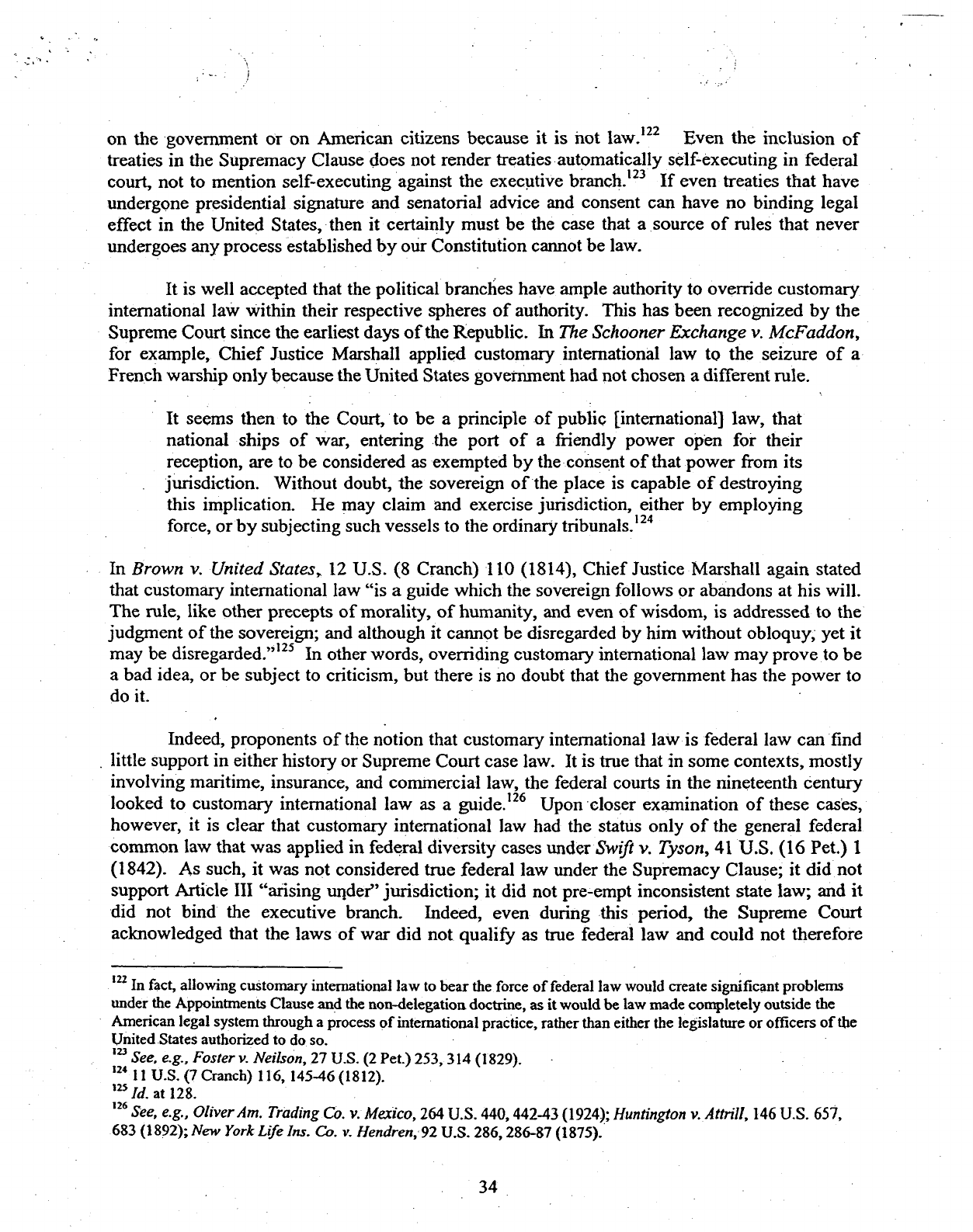
on the government or on American citizens because it is hot law. Even the inclusion of
treaties in the Supremacy Clause does not render treaties automatically self-executing in federal
court, not to mention self-executing against the executive branch.
123
If even treaties that have
undergone presidential signature and senatorial advice and consent can have no binding legal
effect in the United States, then it certainly must be the case that a source of rules that never
undergoes any process established by our Constitution cannot be law.
It is well accepted that the political branches have ample authority to override customary
international law within their respective spheres of authority. This has been recognized by the
Supreme Court since the earliest days of the Republic. In The Schooner Exchange v. McFaddon,
for example, Chief Justice Marshall applied customary international law to the seizure of a
French warship only because the United States government had not chosen a different rule.
It seems then to the Court, to be a principle of public [international] law, that
national ships of war, entering the port of a friendly power open for their
reception, are to be considered as exempted by the consent of that power from its
jurisdiction. Without doubt, the sovereign of the place is capable of destroying
this implication. He may claim and exercise jurisdiction, either by employing
force, or by subjecting such vessels to the ordinary tribunals.
124
In Brown v. United States* 12 U.S. (8 Cranch) 110 (1814), Chief Justice Marshall again stated
that customary international law "is a guide which the sovereign follows or abandons at his will.
The rule, like other precepts of morality, of humanity, and even of wisdom, is addressed to the
judgment of the sovereign; and although it cannot be disregarded by him without obloquy, yet it
may be disregarded."
125
In other words, overriding customary international law may prove to be
a bad idea, or be subject to criticism, but there is no doubt that the government has the power to
do it.
Indeed, proponents of the notion that customary international law is federal law can find
. little support in either history or Supreme Court case law. It is true that in some contexts, mostly
involving maritime, insurance, and commercial law, the federal courts in the nineteenth century
looked to customary international law as a guide.
126
Upon closer examination of these cases,
however, it is clear that customary international law had the status only of the general federal
common law that was applied in federal diversity cases under Swift v. Tyson, 41 U.S. (16 Pet.) 1
(1842).
As such, it was not considered true federal law under the Supremacy Clause; it did not
support Article III "arising under" jurisdiction; it did not pre-empt inconsistent state law; and it
did not bind the executive branch. Indeed, even during this period, the Supreme Court
acknowledged that the laws of war did not qualify as true federal law and could not therefore
In fact, allowing customary international law to bear the force of federal law would create significant problems
under the Appointments Clause and the non-delegation doctrine, as it would be law made completely outside the
American legal system through a process of international practice, rather than either the legislature or officers of the
United States authorized to do so.
123
See, e.g., Foster
v.
Neilson, 27 U.S. (2 Pet.) 253,314 (1829).
124
11 U.S. (7 Cranch) 116, 145-46 (1812).
,25 Id
.at 128.
126
See, e.g., Oliver Am. Trading Co. v. Mexico, 264 U.S. 440,442-43 (1924); Huntington v. Attrill, 146 U.S. 657,
683 (1892); New York Life Ins. Co. v. Hendren, 92 U.S. 286,286-87 (1875).
34
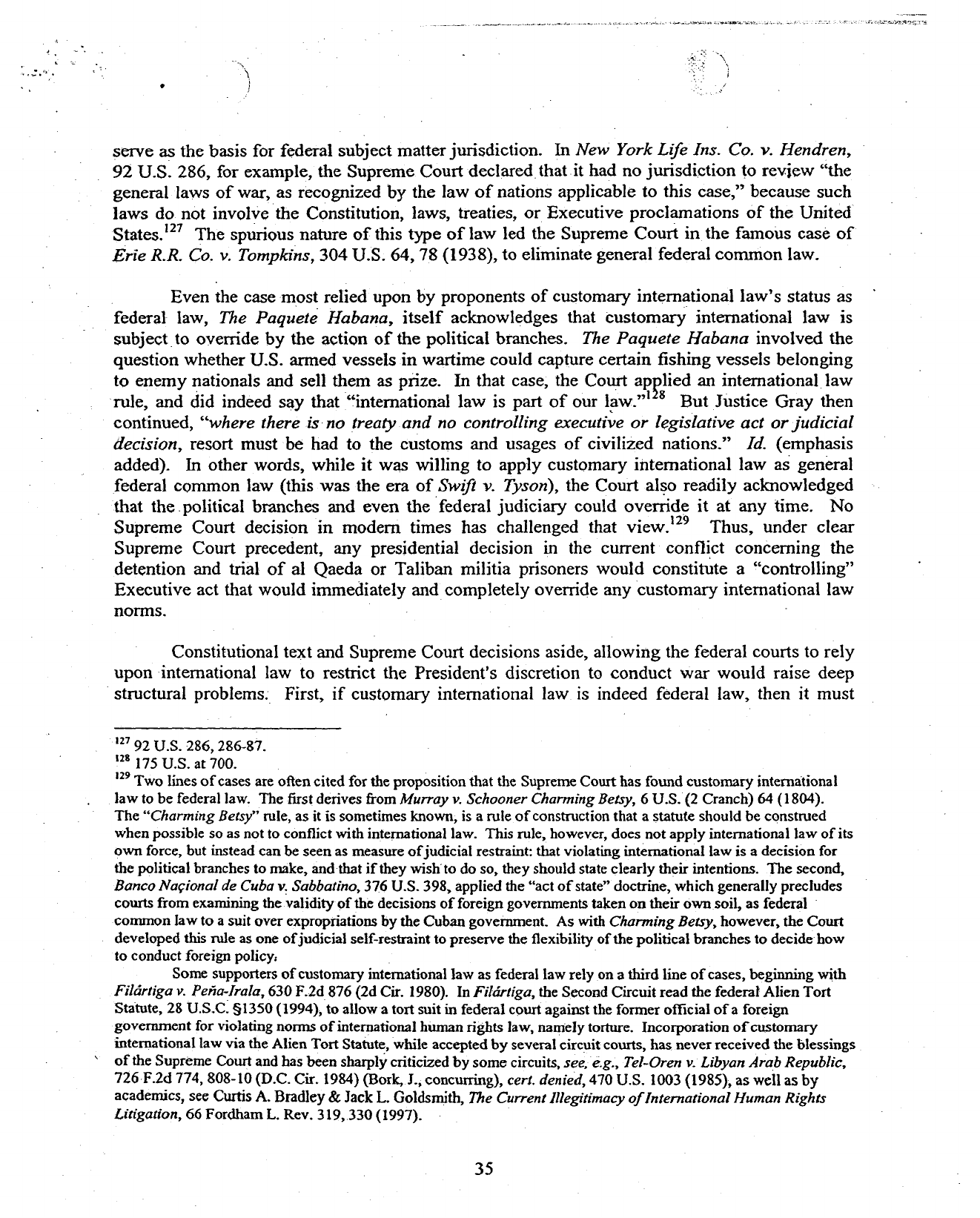
serve as the basis for federal subject matter jurisdiction. In New York Life Ins. Co. v. Hendren,
92 U.S. 286, for example, the Supreme Court declared that it had no jurisdiction to review "the
general laws of war, as recognized by the law of nations applicable to this case," because such
laws do not involve the Constitution, laws, treaties, or Executive proclamations of the United
States.
127
The spurious nature of this type of law led the Supreme Court in the famous case of
Erie R.R. Co. v. Tompkins, 304 U.S. 64, 78 (1938), to eliminate general federal common law.
Even the case most relied upon by proponents of customary international law's status as
federal law, The Paquete Habana, itself acknowledges that customary international law is
subject to override by the action of the political branches. The Paquete Habana involved the
question whether U.S. armed vessels in wartime could capture certain fishing vessels belonging
to enemy nationals and sell them as prize. In that case, the Court applied an international law
rule,
and did indeed say that "international law is part of our law."
1 8
But Justice Gray then
continued, "where there is no treaty and no controlling executive or legislative act or judicial
decision, resort must be had to the customs and usages of civilized nations." Id. (emphasis
added).
In other words, while it was willing to apply customary international law as general
federal common law (this was the era of Swift v. Tyson), the Court also readily acknowledged
that the political branches and even the federal judiciary could override it at any time. No
Supreme Court decision in modern times has challenged that view. Thus, under clear
Supreme Court precedent, any presidential decision in the current conflict concerning the
detention and trial of al Qaeda or Taliban militia prisoners would constitute a "controlling"
Executive act that would immediately and completely override any customary international law
norms.
Constitutional text and Supreme Court decisions aside, allowing the federal courts to rely
upon international law to restrict the President's discretion to conduct war would raise deep
structural problems. First, if customary international law is indeed federal law, then it must
127
92
U.S.
286,286-87.
128
175 U.S. at 700.
129
Two lines of cases are often cited for
the
proposition that the Supreme Court has found customary international
law to be federal law. The first derives from Murray
v.
Schooner Charming Betsy, 6
U.S.
(2 Cranch) 64 (1804).
The "Charming
Betsy"
rule, as it is sometimes known, is a rule of construction that a statute should be construed
when possible so as not to conflict with international law. This rule, however, does not apply international law of its
own force, but instead can be seen as measure of judicial restraint: that violating international law is a decision for
the political branches to make, and that if they wish to do so
>
they should state clearly their intentions. The second,
Banco Nacional de
Cuba
v.
Sabbatino, 376
U.S.
398, applied the "act of
state"
doctrine, which generally precludes
courts from examining the validity of the decisions of foreign governments taken on their own soil, as federal
common law to a suit over expropriations by the Cuban government. As with Charming Betsy; however, the Court
developed this rule as one of judicial self-restraint to preserve the flexibility of the political branches to decide how
to conduct foreign policy*
Some supporters of customary international law as federal law rely on a third line of
cases,
beginning with
Filartiga
v.
Pena-Irala,
630 F.2d 876 (2d Cir. 1980). In Filartiga, the Second Circuit read the federal Alien Tort
Statute, 28 U.S.C. §1350 (1994), to allow a tort suit in federal court against the former official of a foreign
government for violating norms of international human rights law, namely
torture.
Incorporation of customary
international law via the Alien Tort Statute, while accepted by several circuit
courts,
has never received the blessings
v
of the Supreme Court and has been sharply criticized by some
circuits,
see e.g., Tel-Oren v. Libyan Arab Republic,
726 F.2d 774, 808-10
(D.C.
Cir. 1984) (Bork, J., concurring), cert
denied,
470
U.S.
1003 (1985), as well as by
academics, see Curtis
A.
Bradley & Jack
L.
Goldsmith, The
Current Illegitimacy
of International Human Rights
Litigation, 66 Fordham
L.
Rev. 319,330 (1997).
35

receive all of the benefits of the Supremacy Clause. Therefore, customary international law
would not only bind the President, but it also would pre-empt state law and even supersede
inconsistent federal statutes and treaties that were enacted before the rule of customary
international law came into being. This has never happened. Indeed, giving customary
international law this power not only runs counter to the Supreme Court cases described above,
but would have the effect of importing a body of law to restrain the three branches of American
government that never underwent any approval by our democratic political process. If
customary international law does not have these effects, as the constitutional text, practice and
most sensible readings of the Constitution indicate, then it cannot be true federal law under the
Supremacy Clause. As non-federal law, then, customary international law cannot bind the
President or the executive branch, in any legally meaningful way, in its conduct of the war in
Afghanistan.
Second, relying upon customary international law here would undermine the President's
control over foreign relations and his Commander in Chief authority. As we have noted, the
President under the Constitution is given plenary authority over the conduct of the Nation's
foreign relations and over the use of the military. Importing customary international law notions
concerning armed conflict would represent a direct infringement on the President's discretion as
the Commander in Chief and Chief Executive to determine how best to conduct the Nation's
military affairs. Presidents and courts have agreed that the President enjoys the fullest discretion
permitted by the Constitution in commanding troops in the field.
130
It is difficult to see what
legal authority under our constitutional system would permit customary international law to
restrict the exercise of the President's plenary power in this area, which is granted to him directly
by the Constitution. Further, reading customary international law to be federal law would
improperly inhibit the President's role as the representative of the Nation in its foreign affairs.
131
Customary law is not static; it evolves through a dynamic process of State custom and practice.
"States necessarily must have the authority to contravene international norms, however, for it is
the process of changing state practice that allows customary international law to evolve."
132
As
we observed in 1989, "[i]f the United States is to participate in the evolution of international law,
the Executive must have the power to act inconsistently with international law where
necessary." The power to override or ignore customary international law, even the law
applying to armed conflict, is "an integral part of the President's foreign affairs power."
134
Third, if customary international law is truly federal law, it presumably must be
enforceable by the federal courts. Allowing international law to interfere with the President's
130
See Memorandum for Timothy E. Flanigan, Deputy Counsel to the President, from John C. Yoo, Deputy
Assistant Attorney General, Office of Legal Counsel, Re: The President's Constitutional Authority to Conduct
Military Operations Against Terrorists and Nations Supporting Them (Sept 25, 2001) (reviewing authorities).
131
"When articulating principles of international law in its relations with other states, the Executive branch speaks
not only as an interpreter of generally accepted and traditional rules, as would the courts, but also as an advocate of
standards it believes desirable for the community of nations and protective of national concerns." Sabbatino, 376
U.S.
at
432-33.
See also Rappenecker v. United States, 509 F.Supp. 1024, 1029 (N.D. Cal. 1980) ("Under the
doctrine of separation of powers, the making of those determinations [under international law] is entrusted to the
President."); International Load line Convention, 40 Op. Att'y Gen. at 123-24 (President "speak[s] for the nation" in
making determination under international law).
132
13Op.O.L.C.at l70.
133
Id.
,34
Id at
171.
36
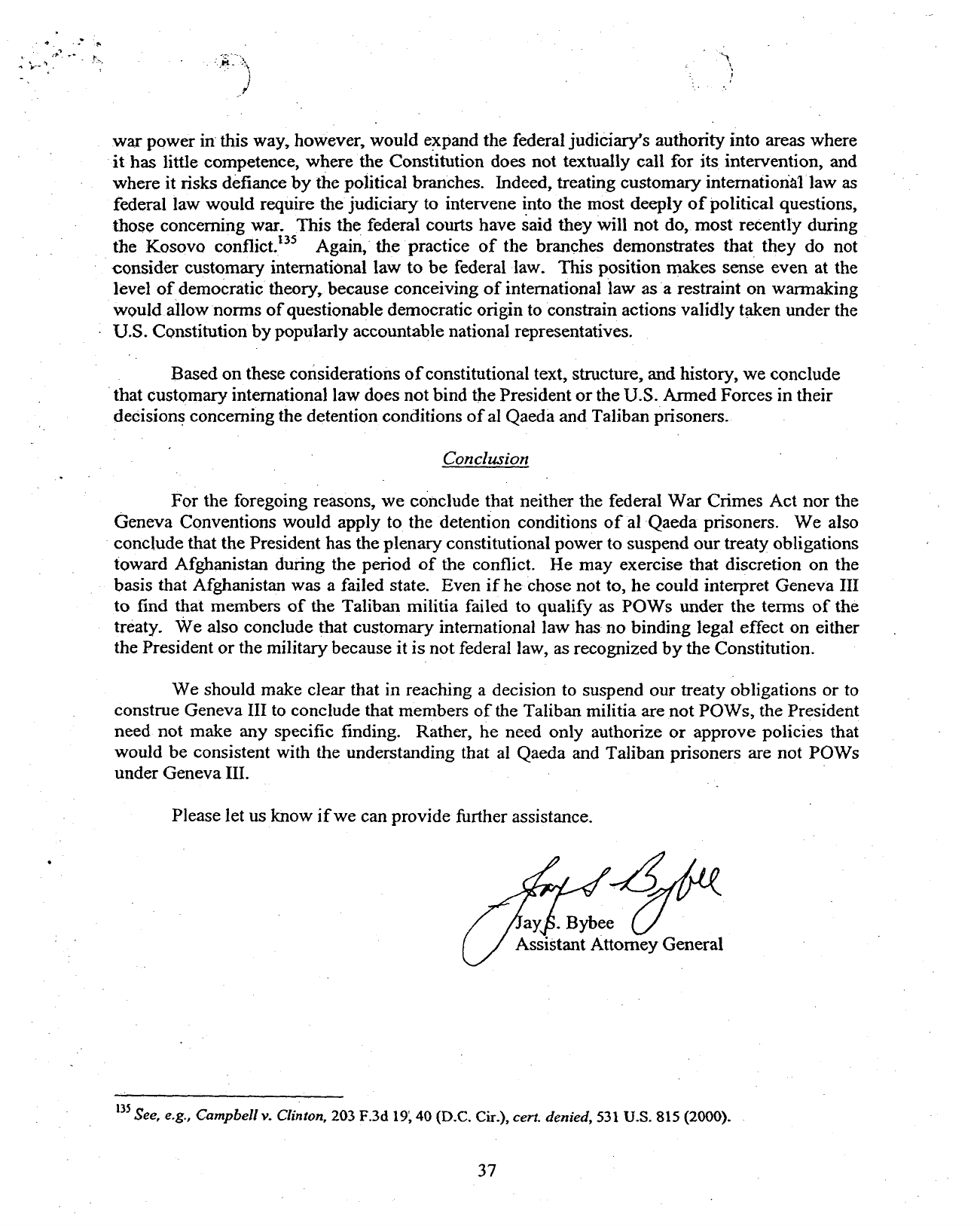
war power in this way, however, would expand the federal judiciary's authority into areas where
it has little competence, where the Constitution does not textually call for its intervention, and
where it risks defiance by the political branches. Indeed, treating customary international law as
federal law would require the judiciary to intervene into the most deeply of political questions,
those concerning war. This the federal courts have said they will not do, most recently during
the Kosovo conflict.
135
Again, the practice of the branches demonstrates that they do not
consider customary international law to be federal law. This position makes sense even at the
level of democratic theory, because conceiving of international law as a restraint on warmaking
would allow norms of questionable democratic origin to constrain actions validly taken under the
U.S.
Constitution by popularly accountable national representatives.
Based on these considerations of constitutional text, structure, and history, we conclude
that customary international law does not bind the President or the U.S. Armed Forces in their
decisions concerning the detention conditions of al Qaeda and Taliban prisoners.
Conclusion
For the foregoing reasons, we conclude that neither the federal War Crimes Act nor the
Geneva Conventions would apply to the detention conditions of al Qaeda prisoners. We also
conclude that the President has the plenary constitutional power to suspend our treaty obligations
toward Afghanistan during the period of the conflict. He may exercise that discretion on the
basis that Afghanistan was a failed state. Even if he chose not to, he could interpret Geneva III
to find that members of the Taliban militia failed to qualify as POWs under the terms of the
treaty. We also conclude that customary international law has no binding legal effect on either
the President or the military because it is not federal law, as recognized by the Constitution.
We should make clear that in reaching a decision to suspend our treaty obligations or to
construe Geneva III to conclude that members of the Taliban militia are not POWs, the President
need not make any specific finding. Rather, he need only authorize or approve policies that
would be consistent with the understanding that al Qaeda and Taliban prisoners are not POWs
under Geneva III.
Please let us know if we can provide further assistance.
Jay S. Bybee
Assistant Attorney General
135
See, e.g.,
Campbell
v.
Clinton,
203 F.3d
19;
40 (D.C.
Cir.),
cert,
denied,
531
U.S. 815 (2000).
37

